As I usually say as I introduce our Best of the Year awards, these might better be called Byron’s Personal Favorite Books of the Year. That doesn’t quite get it right, either, though, as I’m trying to get at some allusive worth, not just my favorite reads, but my favs that I think deserve acclaim as somehow important, particularly beautiful, or helpfully provocative. I want to get some mojo going that excites you to read these books that, while not precisely the very best (necessarily) and not merely ones I got a kick out of, but those that deserve celebration, honor, and a zealous final shout-out before the year fades and the new books crowd out the memories of these fabulous books, great books of 2015.
I may have read more this year than ever, but this year’s list of Best of/Byron’s Favorites is going to be just a little bit shorter – I wore myself out, and you, too, dear reader, I heard – in my epic awards lists the last few years. (Snoop around old BookNotes and you’ll find my previous multi-installment re-caps of the year that went into overtime. Those books deserve their accolades and are still worth reading!)
So, pull up a chair, get that hot drink – or a stiff one as the case may be – and offer up a prayer of thanks that even in this crazy-making, fast-paced, too often superficial, theologically complicated (and strident) world of ours, authors and publishers offer up these gifts of truly wonderful books, affording us opportunities to enjoy ideas, sit in silence with the thoughts and creativity of another, and take in the wonder of the printed page. Say a prayer of thanks for the publishing industry, and commit yourself to support those of us who make our living getting the word out. And join me as I name this list, the Hearts & Minds Best Books of 2015.
BEST BOOKS OF APPLIED THEOLOGY, BASIC CHRISTIAN LIVING, WHOLE LIFE DISCIPLESHIP
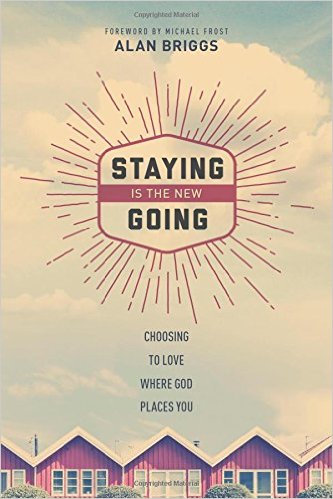 Staying is the New Going: Choosing to Love Where God Places You Alan Briggs (NavPress) $14.99 I loved this easy-to-read, brief book, and was very impressed with the author’s ability to bring together astute social analysis about our mobile culture and the disinterest in a living local that came with late modern capitalism, with the best of recent missional thinking (for churches but mostly for ordinary folks in their daily lives.) It has just enough solid cultural criticism to be meaty, and tons of fantastic, fascinating footnotes, and it has just enough stories and examples to make it come alive with actionable practicality. As you might guess, this spends some time not only pondering how to imagine a deeper sense of place but inviting us to practices that enhance our care for the local, from supporting farmers markets to indie cafes to local civic organizations. This book is well-informed, helpful, inspirational, and exactly the sort of new missional vision that needs explained and underscored. There’s a tiny bit of hipster new urbanism stuff here, but Staying is the New Going is equally great for those deepening their care for rural life, small towns, and more conventional middle class suburbs. It is sure to touch your heart and help you see your place with different eyes.
Staying is the New Going: Choosing to Love Where God Places You Alan Briggs (NavPress) $14.99 I loved this easy-to-read, brief book, and was very impressed with the author’s ability to bring together astute social analysis about our mobile culture and the disinterest in a living local that came with late modern capitalism, with the best of recent missional thinking (for churches but mostly for ordinary folks in their daily lives.) It has just enough solid cultural criticism to be meaty, and tons of fantastic, fascinating footnotes, and it has just enough stories and examples to make it come alive with actionable practicality. As you might guess, this spends some time not only pondering how to imagine a deeper sense of place but inviting us to practices that enhance our care for the local, from supporting farmers markets to indie cafes to local civic organizations. This book is well-informed, helpful, inspirational, and exactly the sort of new missional vision that needs explained and underscored. There’s a tiny bit of hipster new urbanism stuff here, but Staying is the New Going is equally great for those deepening their care for rural life, small towns, and more conventional middle class suburbs. It is sure to touch your heart and help you see your place with different eyes.
By the way, the Foreword by Michael Frost on two strains within American literature – those that go and those that stay, those influenced by being on the road, and those who are definitively shaped by their sense of place — is nothing short of brilliant and is itself worth the price of the book. Can I give an extra award for best Foreword? Three big neighborhood cheers.
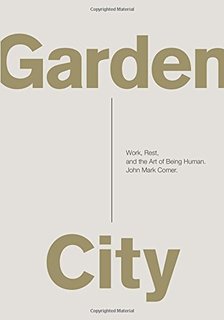 Garden City: Work, Rest, and the Art of Being Human John Mark Comer (Zondervan) $20.99 When I reviewed this I said it was a delight, breezy and fun, arranged to appeal to younger readers (it looks like a Rob Bell book with white spaces and some minimalist page design.) It gets at the truths that are so much discussed in so many churches these days, that our faith makes us more fully human, our work matters to God, we are called to vocations for the common good, and throughout all our culture making we are invite by God to relationships, to rest, to wonder.
Garden City: Work, Rest, and the Art of Being Human John Mark Comer (Zondervan) $20.99 When I reviewed this I said it was a delight, breezy and fun, arranged to appeal to younger readers (it looks like a Rob Bell book with white spaces and some minimalist page design.) It gets at the truths that are so much discussed in so many churches these days, that our faith makes us more fully human, our work matters to God, we are called to vocations for the common good, and throughout all our culture making we are invite by God to relationships, to rest, to wonder.
We regularly promote a bunch of serious books that explore these themes and Garden City may be the best introductory one for those that don’t want one that is heady or too demanding. This is a fabulous book to use with others, in mentoring friendships, adult ed classes, book clubs, and the like. It can introduce vital concepts with remarkably clarity and wit. Skye Jethani says that it invites us to “a ravishing vision of the beautiful future we are building with God today. Everyone who reads this book will see their world with new eyes.” Yes!
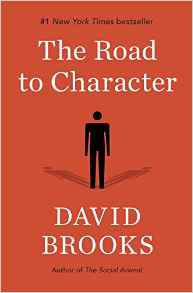 The Road to Character David Brooks (Random House) $28.00 This has been one of the most discussed books this year in some circles, at least, and it deserves any accolades it garners. We are eager to highlight its significance, its rich storytelling, its serious-minded and thoughtful approach to how we come to be the people we are. Brooks – who seems to be on a journey towards Christian faith – has released a handful of important books that blend 20th and 21st century social analysis and concern with the fabric of society, each written with verve (and, in his earlier books like Bobos in Paradise and On Paradise Drive) great wit and outright humor. More even than the others, The Road to Character is not only a sociological study and interesting analysis of what makes us tick, where virtue comes from and how people come to desire the good, it is an apologetic for it. Some of his study is profound and provocative, but he brings it home with fairly obvious examples – why is it, he asks in the beginning of the book, that guys that defeated the Nazi’s or survived D-Day didn’t do happy dances or pound their chests the way millionaire athletes do nowadays even if they make a fairly unremarkable play on the football field? Interestingly, he doesn’t necessarily blame, as some do, the liberal shifts from the 1960s, but teases out the consequences of the ease of the post-WWII years after the Greatest Generation returned home. Agree or not with his assessment of the flow of the decades and the spirit of the ages, The Road to Character is captivating and compelling. (Again, it is very erudite, confident, but it isn’t preachy; Michael Gerson in The Washington Post notes that “The voice of the book is calm, fair and humane.” The stories Brooks tells are worth every penny to buy this book. He tells in great detail the life stories of great people, of some that are not so great, and of some that are – imagine! – a blend of profound virtue and feet of broken clay. In this, it is a very wise and sophisticated book.
The Road to Character David Brooks (Random House) $28.00 This has been one of the most discussed books this year in some circles, at least, and it deserves any accolades it garners. We are eager to highlight its significance, its rich storytelling, its serious-minded and thoughtful approach to how we come to be the people we are. Brooks – who seems to be on a journey towards Christian faith – has released a handful of important books that blend 20th and 21st century social analysis and concern with the fabric of society, each written with verve (and, in his earlier books like Bobos in Paradise and On Paradise Drive) great wit and outright humor. More even than the others, The Road to Character is not only a sociological study and interesting analysis of what makes us tick, where virtue comes from and how people come to desire the good, it is an apologetic for it. Some of his study is profound and provocative, but he brings it home with fairly obvious examples – why is it, he asks in the beginning of the book, that guys that defeated the Nazi’s or survived D-Day didn’t do happy dances or pound their chests the way millionaire athletes do nowadays even if they make a fairly unremarkable play on the football field? Interestingly, he doesn’t necessarily blame, as some do, the liberal shifts from the 1960s, but teases out the consequences of the ease of the post-WWII years after the Greatest Generation returned home. Agree or not with his assessment of the flow of the decades and the spirit of the ages, The Road to Character is captivating and compelling. (Again, it is very erudite, confident, but it isn’t preachy; Michael Gerson in The Washington Post notes that “The voice of the book is calm, fair and humane.” The stories Brooks tells are worth every penny to buy this book. He tells in great detail the life stories of great people, of some that are not so great, and of some that are – imagine! – a blend of profound virtue and feet of broken clay. In this, it is a very wise and sophisticated book.
I know that some listeners don’t like his weekly punditry on NPR or his moderately conservative presence in the New York Times and The Washington Post. Still, I think even left-leaning readers will be pleasantly surprised at the people Brooks honors here – from Bayard Rustin, who so influenced Martin King to Dorothy Day of the Catholic left. Where do such courageous activists come from? How does such counter-cultural character formation happen? How does religious faith nurture moral development? It isn’t a secret that Brooks has spent time in recent years with thoughtful evangelical leaders – from scholars at Christian colleges to Timothy Keller to fellow journalist and writer, Michael Gerson, or that his major research assistant thanked in the acknowledgments is herself an evangelical follower of Jesus. This broad vision of the meaning of life under the sun and this fascination with the social and political and ethical implications of the interior life is rich with religious overtones and Brooks is capable of exposing some of the layers of meaning in the search for a coherent, good life. I think this is one of the most important books of the year, and certain – for educated readers – certainly one of the best.
The reviews have been great – USA Today says he is like Malcolm Gladwell; Maria Popova, of the Brain Pickings newsletter writes that it is,
Elegant and lucid . . . a pitch-perfect clarion call, issued not with preachy hubris but from a deep place of humility, for awakening to the greatest rewards of living . . . The Road to Character is an essential read in its entirety–Anne Lamott with a harder edge of moral philosophy, Seneca with a softer edge of spiritual sensitivity, E. F. Schumacher for perplexed moderns.
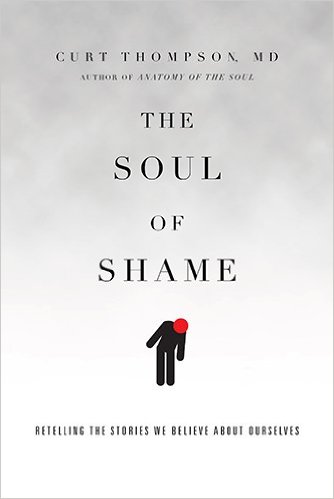 The Soul of Shame: Retelling the Stories We Tell Believe About Ourselves
The Soul of Shame: Retelling the Stories We Tell Believe About Ourselves
Curt Thompson (IVP) $22.00 I have written about this often,
highlighted it at nearly every off-cite event we’ve gone this year, and
am delighted that we can confidently celebrate it as one of the very
best books of 2015. As you may recall, Dr. Curt Thompson is a working
psychiatrist with a serious vocation of studying neuroscience; his
earlier book (Anatomy of a Soul) explored how knowing a bit about
brain studies and how God has wired us – brain and body! – will help us
in our relationships and spiritual growth. This new book brings his
psychiatric expertise and his teacherly ability to explain neurobiology
to his overall project of studying in Biblical perspective the toxic
impact of shame. In this single volume Thompson models an exemplary
methodology of integrating Biblical studies, theology and spiritual
formation with his own calling in the career of medicine and counseling.
What an integrated, wholistic, multi-faceted perspective he has on his
field! And what a knack he has to help us!
In The Soul of Shame: Retelling the Stories…
Thompson shares lots of stories of his own clients, how he has brought
insight and served his patients by inviting them to a life of faith and
discipleship by taking up the story of the redemptive work of God;
although he tells this big drama of Scripture well, he then helps
readers cope with shame and learn to be more whole and healthy and
vulnerable by applying some basic habits and life skills based on brain
science that can be truly transformative. Kudos to Curt and to IVP for
offering to us all such a great example of a thoughtful, useful,
Christian book, one of the best of 2015!
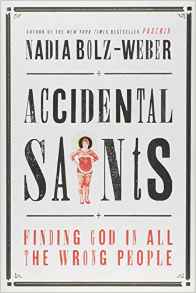 Accidental Saints: Finding God in all the Wrong People Nadia Bolz-Weber (Converge) $23.00 I know that many, if not most, of our BookNotes readers will be suspicious of some of Bolz-Weber’s mainline Lutheran theological tendencies, and will disapprove of her ready acceptance and advocacy for persons within the GLTB community. Some will be put off by her cussing – before her come-back-to-Jesus journey that led to ordination in the ELCA she found herself addicted and working in the late night, very blue, comedy circuit. Some will object to her lefty and progressive worldview which verges on self-righteously indignant. I doubt many will mind the artful images from the liturgical calendar famously tattooed across her arms and chest, but it is hard to miss. Still, Bolz-Weber writes like a dream, the book was among the most interested and touching I read all year, and her memoir-like journalism about her edgy emerging faith community (The House of All Sinners and Saints in Denver) contained unforgettable characters and unforgettable theological insights. I loved this book. Disagree with her understanding of doctrine or her embrace of the bohemian sub-culture, but Accidental Saints is about finding God’s grace in bizarre situations, the ups and downs of postmodern church planting, and about God’s own glory seen in the works of mercy, justice, advocacy and art of God’s people in this unusual cultural setting.
Accidental Saints: Finding God in all the Wrong People Nadia Bolz-Weber (Converge) $23.00 I know that many, if not most, of our BookNotes readers will be suspicious of some of Bolz-Weber’s mainline Lutheran theological tendencies, and will disapprove of her ready acceptance and advocacy for persons within the GLTB community. Some will be put off by her cussing – before her come-back-to-Jesus journey that led to ordination in the ELCA she found herself addicted and working in the late night, very blue, comedy circuit. Some will object to her lefty and progressive worldview which verges on self-righteously indignant. I doubt many will mind the artful images from the liturgical calendar famously tattooed across her arms and chest, but it is hard to miss. Still, Bolz-Weber writes like a dream, the book was among the most interested and touching I read all year, and her memoir-like journalism about her edgy emerging faith community (The House of All Sinners and Saints in Denver) contained unforgettable characters and unforgettable theological insights. I loved this book. Disagree with her understanding of doctrine or her embrace of the bohemian sub-culture, but Accidental Saints is about finding God’s grace in bizarre situations, the ups and downs of postmodern church planting, and about God’s own glory seen in the works of mercy, justice, advocacy and art of God’s people in this unusual cultural setting.
Nadia admits to being a bit cranky, and, like most in her feeble, funny congregation, is on a journey towards greater Christ-likeness, being transformed by worshipping well and doing life with others in service to their community. Accidental Saints is an unforgettable book, doubtlessly an example of a new kind of religious memoir, and one Beth and I enjoyed and appreciated.
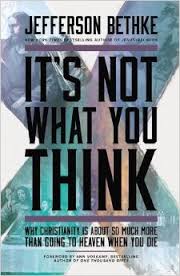 It’s Not What You Think: Why Christianity Is About So Much More Than Going To Heaven Jefferson Bethke (Nelson) $17.99 If Nadia’s book, above, is a high-octane, colorful telling of post-modern, emerging mainline liturgical faith in the setting of cultural bohemians, this book, at first blush, is the polar opposite. Bethke is culturally conventional and theologically conservative as a Reformed young adult in what seems like a spiffy megachurch. He is in many ways nearly as much of an icon of a certain sort of faith expression as Nadia is for another. You may know how he was catapulted to fame after a lively video called “Jesus is Greater Than Religion” went viral a few years back. Next came a book by the same name exploring more of this wild and passionate Christ-centered vision and it was surprisingly good. This Jefferson Bethke fellow obviously had more than a five minute YouTube sensation in him and as a young evangelical pastor has a keen ability to take serious Biblical truths and show us out to apply them to our lives in orthodox, faithful ways.
It’s Not What You Think: Why Christianity Is About So Much More Than Going To Heaven Jefferson Bethke (Nelson) $17.99 If Nadia’s book, above, is a high-octane, colorful telling of post-modern, emerging mainline liturgical faith in the setting of cultural bohemians, this book, at first blush, is the polar opposite. Bethke is culturally conventional and theologically conservative as a Reformed young adult in what seems like a spiffy megachurch. He is in many ways nearly as much of an icon of a certain sort of faith expression as Nadia is for another. You may know how he was catapulted to fame after a lively video called “Jesus is Greater Than Religion” went viral a few years back. Next came a book by the same name exploring more of this wild and passionate Christ-centered vision and it was surprisingly good. This Jefferson Bethke fellow obviously had more than a five minute YouTube sensation in him and as a young evangelical pastor has a keen ability to take serious Biblical truths and show us out to apply them to our lives in orthodox, faithful ways.
This new book reads well and its organizing structure is showing the surprising grace of God in many ways, explaining how things are never quite as they seem. It really covers a lot of material, and is informed by solid thinkers who are known for relating good theology to contemporary culture — think, say, Dallas Willard or N.T. Wright. (Chapters include telling about how we are not what we think, the Bible is not what we think, the gospel itself is not what we think, etc. It works!) I thought this surprising contrast, turning common assumptions on their heads, was a very helpful approach to living out whole-life discipleship, mature and interesting and solid.
This is one of the best books in this huge category of “basic Christian growth” or what some religious bookstores call “Christian living.” It is lively and aimed at a younger readership, or so it seems, and yet I loved it, reading it at the end of my 60th year. Kudos to this young author and his vlogs and cool millennial vibe. And thanks be to God that rising evangelical leaders like Jefferson Bethke are so robust and thoughtful and serious about living out practical discipleship in the contemporary culture, finding their own place within the broader story of God’s redemptive plans. And thanks be that they help us find our own place there, too, in a Kingdom coming that is already but not yet.
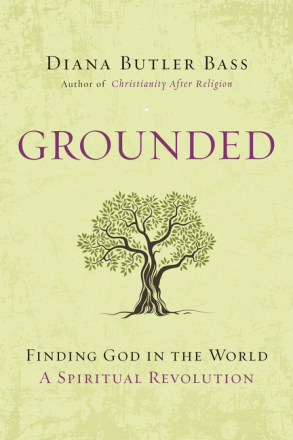 Grounded: Finding God in the World – A Spiritual Revolution Diana Butler Bass (HarperOne) $26.99 For a variety of reasons I read and re-read this, dipping in again and again, throughout the fall and early winter. It has stimulated my own thinking, brought great joy – at times tears to my eyes, and a much-needed renewal to my soul – and at times, not an insignificant amount of frustration. This is not the time or place to detail my frustrations with certain lines and certain authors she cites approvingly other than to say there are moments that she seems, to me, to nearly set up a caricature of those she finds wanting, a “straw man” ploy. For instance, Bass talks about an “elevator” view of God and faith, as if the faith of most church folks is merely about going to heaven, zipping out of this world, to be with an otherwise distant deity. Perhaps it is because I rail about such gnostic otherworldliness myself that I am sensitive, now, to being fair about such critiques. Ahh, but yet: even if most who hold to fairly conventional faith and evangelical doctrines don’t quite match her cartoon of them, she is right – so right! – that faith is too often personalized and made internal or disconnected to life in God’s good world. There is a sense that God cares more about the so-called spiritual than the so-called ordinary, secular life, and this book is yet another resource to disabuse us of this wrong-headed and unbiblical view.
Grounded: Finding God in the World – A Spiritual Revolution Diana Butler Bass (HarperOne) $26.99 For a variety of reasons I read and re-read this, dipping in again and again, throughout the fall and early winter. It has stimulated my own thinking, brought great joy – at times tears to my eyes, and a much-needed renewal to my soul – and at times, not an insignificant amount of frustration. This is not the time or place to detail my frustrations with certain lines and certain authors she cites approvingly other than to say there are moments that she seems, to me, to nearly set up a caricature of those she finds wanting, a “straw man” ploy. For instance, Bass talks about an “elevator” view of God and faith, as if the faith of most church folks is merely about going to heaven, zipping out of this world, to be with an otherwise distant deity. Perhaps it is because I rail about such gnostic otherworldliness myself that I am sensitive, now, to being fair about such critiques. Ahh, but yet: even if most who hold to fairly conventional faith and evangelical doctrines don’t quite match her cartoon of them, she is right – so right! – that faith is too often personalized and made internal or disconnected to life in God’s good world. There is a sense that God cares more about the so-called spiritual than the so-called ordinary, secular life, and this book is yet another resource to disabuse us of this wrong-headed and unbiblical view.
Grounded, in its beautiful prose about earth, water, sky, reminds us of the wonder of creation, the grounded location we all share – we are Earthlings, after all, not made for heaven, but designed to bear God’s image in the world – and helps us find God not only in our prayer life but in our gardening, not only in church but at the PTO, not only on spiritual retreat, but on family vacations. It invites us not to leave taking but to presence, a sort of homecoming.
I have thoroughly enjoyed sitting under Diana’s tutelage on occasion, and have read all her books, and I think Shauna Niequist is right to say this is her most beautiful writing, and perhaps her most significant work to date. Her study of how Christian discipleship is embodied in homes, in neighborhoods, and in the public commons is wonderfully realized and very, very helpful. Her writing is a delightful blend of theologizing and storytelling; she offers (accessible, if provocative) scholarship infused with memoir and testimony, relating her story, describing her emerging understandings of the Christian faith’s vision of the sacramental nature of reality and God’s presence around all things. She often shows that some of these insights and consequential practices are similar to those of other strains of other world religions and this could be distracting to those who are suspicious of such inter-faith dialogue. (I hope no BookNotes reader opposes such tendencies in principle.) Bass’s project of showing how Biblical, Christian faith invites us all to find God outside the walls of the congregation and in experiences other than liturgy and Scripture study is a fine, solid one, so there is a natural trajectory towards wondering how this plays out in our postmodern, post-Christian, pluralizing world and how to talk about this with our multi-faith neighbors.
Butler Bass wants to show connections between older spiritual revivals and contemporary interest in spirituality and the soul; as in her last book, Christianity After Religion she insists that we are not in an era of secularization. In one section that I continue to ponder she draws connections between the 18th century Great Awakening (she tells of her experience preaching in the old church of Jonathan Edwards in Northampton) and the renewed interest in small organic farms and sustainable agriculture and farmer’s markets that region of old Puritan New England. In another she writes movingly about her own deepening sense of place in her neighborhood and locale and how this compares to spiritual renewals experienced at camps and retreats. Indeed, our own sense of home is an important aspect of her understanding of our spiritual formation, and her descriptions of places she has lived and the faith communities which have shaped her, are very important (and delightfully so) to the heart of the book.
Agree or not with her rejection of “elevator” faith and her emphasis on what theologians call immanence (the intimate nearness of God) and panentheism (God truly around all things, disclosed in all things, but not pantheism) you should grapple with the arguments offered in Grounded: Finding God in the World. Perhaps, like me, you will wish she hadn’t put some things quite so starkly, or you may wish she had affirmed a few other things that are left unexplored. But I truly hope that, also like me, you will read this extraordinary book with an open heart, seeing how stories of natural history and personal heritage combine with how we formulate our theology and how we experience God’s presence and grace in our ordinary lives.
We are happy to announce that this is one of the most interesting books I’ve read in quite a while, and one that is both substantive and pleasurable, tough and tender, serious and yet a bit playful and certainly has pages of sheer poignancy and wonderful delight. It invites us to environmental stewardship, to living more attentive to God in the ordinary, and to embody practices that are sustainable and healthy, engaged with local stuff, with being present to God’s ways in the neighborhood and the common space of our life together. Handsome, well written, and thought provoking – such are the makings of a good book, and this is one of the best of 2015.
 Finding Livelihood: A Progress of Work and Leisure Nancy J. Nordenson (Kalos Press) $14.95 This handsome paperback is certainly one of the finest literary works I’ve read all year.
Finding Livelihood: A Progress of Work and Leisure Nancy J. Nordenson (Kalos Press) $14.95 This handsome paperback is certainly one of the finest literary works I’ve read all year.
Here is just some of what I wrote in my Labor Day weekend post this past fall:
I have extolled this book in several previous posts and have described it before at here at BookNotes. I am very enthusiastic about it, and of its publisher, Kalos, and want to be a champion of it because it is a truly, truly extraordinary book. The raves have been from important writers (Image editor, Gregory Wolfe, poet and writer Luci Shaw, Brett Lott, Leslie Leyland Fields, Marcus Goodyear of The High Calling blog.) Finding Livelihood is not at all common, it is beyond uncommon. It is not just good. It is nothing short of extraordinary and I doubt if you have ever read a book quite like it. It is wise, thoughtful, literary, poetic, full of stories – stories that are often exceptionally mundane but made exceptionally meaningful by Nancy Nordenson’s extraordinary prose.
In that BookNotes posts last fall, I said “my own writing abilities, I am afraid, cannot rise to the quality that this luminous book deserves. I will tell you just a few things to pique your interest.”
But I tried, and wrote a lot about it; now we want to honor it as one of our Best Books of the Year selections.
…as I have suggested, Nordenson is a great writer. She can weave sentences and paragraphs in creative ways that are pure joy to read if you enjoy the beauty of words well chosen and stories well told. She tells us – warns us? – early on that the book has a lyric style, a nonlinear structure. It includes “white space, metaphor, and slant-angle perspective.”
“It is a way of exploring, not a way of explaining,” she states. “Lyric structure bypasses the default problem-solving logic of self-help books and the chronologic reportage of memoir to more closely mimic the nature of a complex issue that can’t be resolved in ten easy steps but can be seen and understood in new ways when explored from multiple directions. Lyric style finds clues and layers them or braids them together.
My review offered a lot of quotes and examples of her great, lyrical prose. I continued, though, noting that there are other books that are direct about this matter of finding God in the work-world, books that offer clues to spiritual formation for and in the marketplace, thinking Christianly about vocation and call, developing a Christian viewpoint, even, but this is less obvious than that. She does want life to be more seamless, not just to find paid work but to sense a call, to discover meaning in our days. Livelihood. She does ruminate quite a bit on Josef Pieper’s classic Leisure: The Basis of Culture (and in a simple reminder of its post-World War II context helped me understand it more than I had.) Her point in all of this is profound, but not evangelistic on the face of it; Why is Pieper’s message so urgent? She answers her own question in italics: To be human.
We have a lot of books on faith and work, vocation and calling, and a few are new, and really good. But this stands out, almost as a memoir, and a thoughtful, ecumenical rumimnation, on good livelihood. Congratulations to Nancy Nordenson and to Kalos Press for this, truly one of the notable books of 2015.
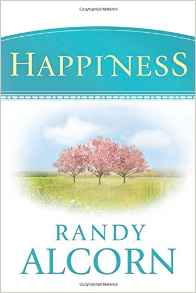 Happiness Randy Alcorn (Tyndale) $24.95 When I saw this one word title, and saw the rather sentimental (boring?) cover, I was less interested than I might have been; many of us tend to push away from anything that seems shallow or tepid or which suggests that faith is wedded to the materialism of the American Dream. We might even roll our eyes in this broken, needy, world with the notion that God wants us to be happy. Of course, you should know, as I should have, that Randy Alcorn does none of that, is a fine, fine scholar, drawing on Puritans and hefty theologians that have struggled deeply with Biblical promises and human suffering and the deep glories of knowing God. I have to list this as one of the significant books of the year, in part because of the meticulous research Alcorn as put into this, the informative footnotes, the hefty theological under-girding of this complex, lengthy, and helpful study. I get the sweet cover, I think — it wants to shout to the casual browser that this isn’t a dry tome, laden with arcane quotes from old-school heavyweights that is only for scholars or theologians. Yes, it is heavy, and yes, it quotes significant pastors of an earlier era, but it is written for ordinary folks, those wanting a Biblically-infused vision of one of the most common questions of human existence: can we be happy, and what does that mean? Kudos.
Happiness Randy Alcorn (Tyndale) $24.95 When I saw this one word title, and saw the rather sentimental (boring?) cover, I was less interested than I might have been; many of us tend to push away from anything that seems shallow or tepid or which suggests that faith is wedded to the materialism of the American Dream. We might even roll our eyes in this broken, needy, world with the notion that God wants us to be happy. Of course, you should know, as I should have, that Randy Alcorn does none of that, is a fine, fine scholar, drawing on Puritans and hefty theologians that have struggled deeply with Biblical promises and human suffering and the deep glories of knowing God. I have to list this as one of the significant books of the year, in part because of the meticulous research Alcorn as put into this, the informative footnotes, the hefty theological under-girding of this complex, lengthy, and helpful study. I get the sweet cover, I think — it wants to shout to the casual browser that this isn’t a dry tome, laden with arcane quotes from old-school heavyweights that is only for scholars or theologians. Yes, it is heavy, and yes, it quotes significant pastors of an earlier era, but it is written for ordinary folks, those wanting a Biblically-infused vision of one of the most common questions of human existence: can we be happy, and what does that mean? Kudos.
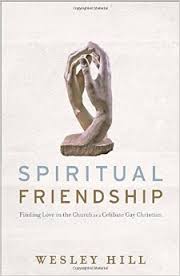 Spiritual Friendship: Finding Love in the Church as a Celibate Gay Christian Wesley
Spiritual Friendship: Finding Love in the Church as a Celibate Gay Christian Wesley
Hill (Brazos) $14.99 Some know Dr. Hill as many have read his important and beautiful little book Washed and Waiting: Reflections on Christian Faithfulness and Homosexuality. In that important book he tells of his own journey as a gay man — an evangelical working on a PhD in Trinitarian theology who believes that a Biblical view of sexual ethics requires of him to be celibate. (His scholarly one called Paul and the Trinity was just released this year.) I
hope you read my lengthy review of Spiritual Friendship at
BookNotes a while back as it is truly moving book, insisting that a
Christian view of things must include a deeper awareness of and
commitment to the art of friendship. This is more important than any
other book I can imagine on the topic, including (dare I say it?) The Four Loves by
C.S. Lewis. It is vital for all of us — thinking about friendship, as it is not a book about his sexual attractions — but certainly urgent for young
adults who are still forging their life-long friends. Thanks, Wes, for
this generous and profound study. It is thoughtful, beautiful, and, as I’ve said, important. Oddly, there isn’t much serious writing being done on friendship, and we can be glad for the exceptionally high quality of this lovely work. Cheers.
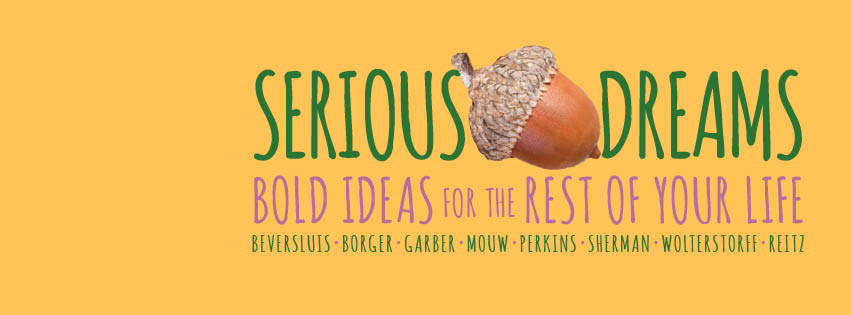 Serious Dreams: Bold Ideas for the Rest of Your Life edited by Byron Borger (Square Halo Books) $12.99
Serious Dreams: Bold Ideas for the Rest of Your Life edited by Byron Borger (Square Halo Books) $12.99
I know, I know, this is awkward. I’ve gotten great feedback from my own feisty chapter, a 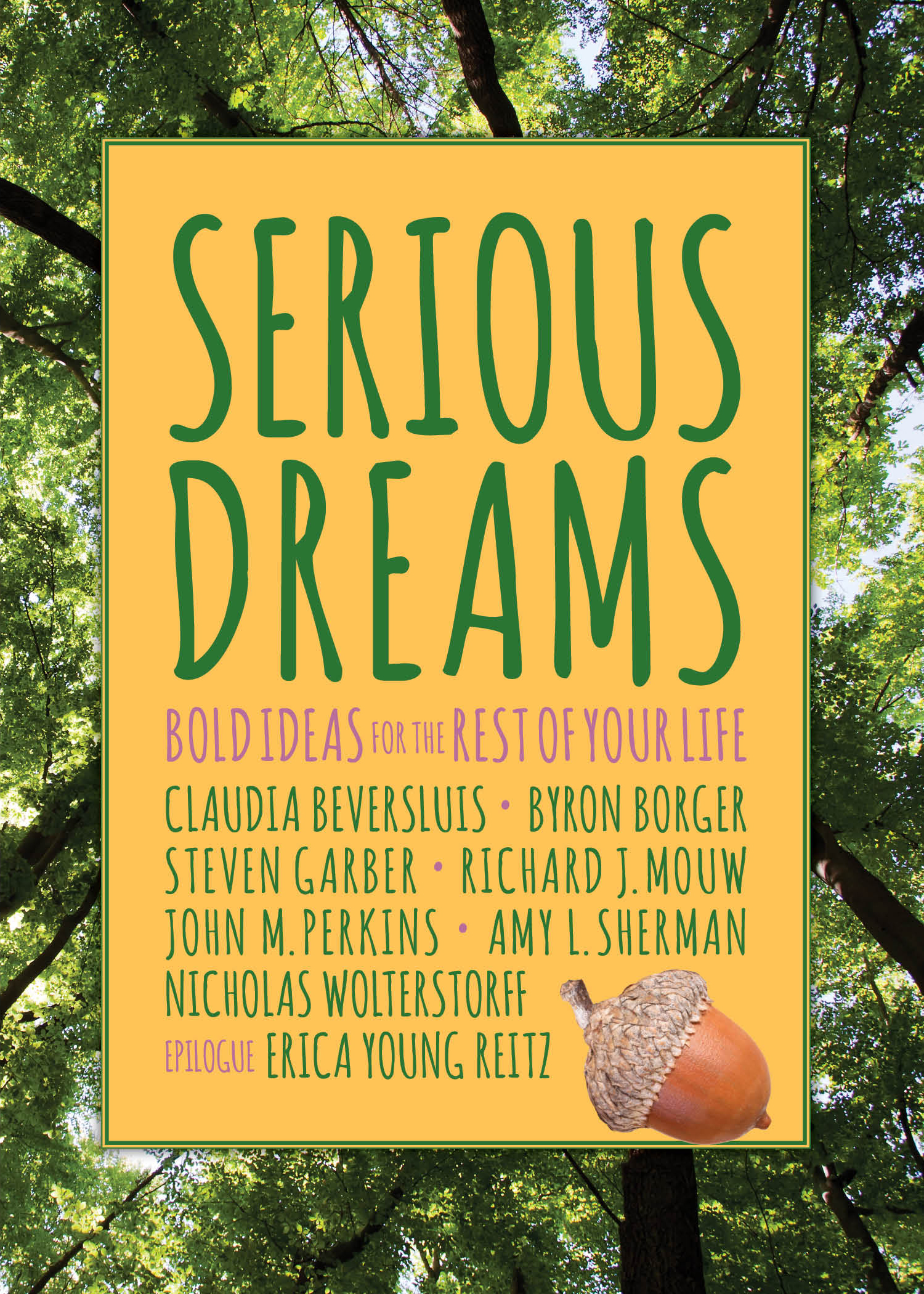 passionate message about changing the world by taking up radical visions of vocation preached to graduates from a Master’s program at Geneva College in Western Pennsylvania, and also a gentle introductory chapter inviting young adults to dig in to their hometowns, attending to their hearts, nurturing a sense of place as they are transitioning out of college and into a life of quiet faithfulness. Both the big picture call to social transformation and the Berry-esque invitation to stay put and live local are found here, although most of the chapters — they were graduation speeches offered with great hope at Christian colleges, after all — tend towards the former, with energy and vision and helpful guidance from very wise women and men. But I award this not because of my role, but because of the caliber of the authors compiled and the consistency and often beauty of their messages, inviting young adults to think well about the next stages of their lives, seeking God’s ways as they find themselves in new jobs and new places working out their hopes and dreams in a very needy world. What an honor it was to edit the writings of Richard Mouw, Nicholas Wolterstorff, Claudia Beversluis, Amy Sherman, Steve Garber, John Perkins. These are each stellar individuals, most of them famous writers themselves, and all significant spokespersons for a certain way of inviting us to weave together belief and behavior and live out culture-shaping, whole-life discipleship. There is a fantastic short epilogue by Erica Young Reitz (who has a book coming out next year with IVP called After College.)
passionate message about changing the world by taking up radical visions of vocation preached to graduates from a Master’s program at Geneva College in Western Pennsylvania, and also a gentle introductory chapter inviting young adults to dig in to their hometowns, attending to their hearts, nurturing a sense of place as they are transitioning out of college and into a life of quiet faithfulness. Both the big picture call to social transformation and the Berry-esque invitation to stay put and live local are found here, although most of the chapters — they were graduation speeches offered with great hope at Christian colleges, after all — tend towards the former, with energy and vision and helpful guidance from very wise women and men. But I award this not because of my role, but because of the caliber of the authors compiled and the consistency and often beauty of their messages, inviting young adults to think well about the next stages of their lives, seeking God’s ways as they find themselves in new jobs and new places working out their hopes and dreams in a very needy world. What an honor it was to edit the writings of Richard Mouw, Nicholas Wolterstorff, Claudia Beversluis, Amy Sherman, Steve Garber, John Perkins. These are each stellar individuals, most of them famous writers themselves, and all significant spokespersons for a certain way of inviting us to weave together belief and behavior and live out culture-shaping, whole-life discipleship. There is a fantastic short epilogue by Erica Young Reitz (who has a book coming out next year with IVP called After College.)
I don’t say this because I edited the thing, I say this because it really is true: there is no other book like this and these pieces, along with reflection questions after each one, are just fantastic. Thanks to Square Halo’s Ned Bustard for great design work and, of course, to the authors who gave these dramatic talks and who permitted me to compile them into this handsome little book. It was one of the great things for Beth and me in 2015, and we were humbled by the outpouring of interest among friends; we pray that its impact lasts. Serious dreams, indeed.
BEST BOOKS OF SPIRITUALITY AND THE DEVOTIONAL LIFE
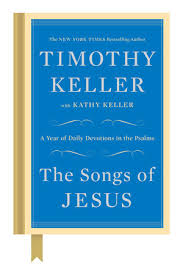 Songs of Jesus: A Year of Daily Devotions in the Psalms Timothy and Kathy Keller (Dutton) $19.95 We were thrilled to have a brief conversation with Tim about this when we were staffing our book display at the Redeemer Presbyterian Center for Faith & Work conference; the book was just about to come out and he explained how much it means to him, and how he and Kathy have learned to practice (even amidst her own struggle with chronic pain and sustained illness) to read the book of Psalms through each month. This daily devotional is grounded in his solid exegesis of the passages but also in their intimacy with God, their appreciation of how the Psalms point us towards the gospel, and how followers of Christ can, like Jesus himself, draw great insight and sustenance from the devotional reading of these poems, songs, Psalms. The book itself is beautiful, compact sized with two color ink and a ribbon marker. It is one you will want to use, over and over.
Songs of Jesus: A Year of Daily Devotions in the Psalms Timothy and Kathy Keller (Dutton) $19.95 We were thrilled to have a brief conversation with Tim about this when we were staffing our book display at the Redeemer Presbyterian Center for Faith & Work conference; the book was just about to come out and he explained how much it means to him, and how he and Kathy have learned to practice (even amidst her own struggle with chronic pain and sustained illness) to read the book of Psalms through each month. This daily devotional is grounded in his solid exegesis of the passages but also in their intimacy with God, their appreciation of how the Psalms point us towards the gospel, and how followers of Christ can, like Jesus himself, draw great insight and sustenance from the devotional reading of these poems, songs, Psalms. The book itself is beautiful, compact sized with two color ink and a ribbon marker. It is one you will want to use, over and over.
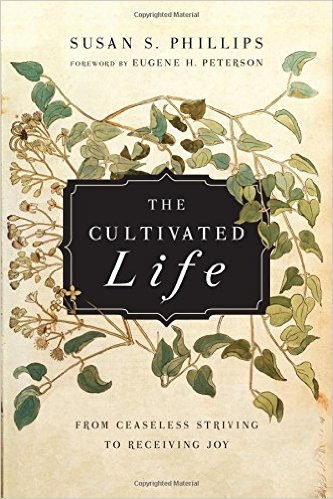 The Cultivated Life: From Ceaseless Striving to Receiving Joy Susan S. Phillips (IVP) $17.00 The richness of this beautiful book is exceptional, and I want to award it as one of the very best books of the year. I’ve written about it recently, but thought I’d quote our first comments about it at BookNotes when it released last summer:
The Cultivated Life: From Ceaseless Striving to Receiving Joy Susan S. Phillips (IVP) $17.00 The richness of this beautiful book is exceptional, and I want to award it as one of the very best books of the year. I’ve written about it recently, but thought I’d quote our first comments about it at BookNotes when it released last summer:
This is one of the lead titles from InterVarsity Press this season, and, as such, it deserves to be read. They offer consistently good books and their formation line includes some of the premier writers about formation these days – and this is one of the very best of their summer list. Susan Phillips has a PhD from U.C. Berkeley in sociology, is a director of the wonderful New College of Berkeley (New College is an affiliate of the Graduate Theological Union) and is involved in First Presbyterian there. She has taught courses on spiritual formation at Regent College in Vancouver, at Fuller Theological Seminary and at San Francisco Theological Seminary, so she has much experience in helping others move deeper into a life of spiritual sanity. Philips has written a previous book on spiritual direction, published by Morehouse, called Candlelight: Illuminating the Art of Spiritual Direction which is excellent and often recommended. I am confident that this new one will be considered one of the best books of the year, certainly within the genre of books about spirituality. The Cultivated Life is excellent, mature, inspiring and very helpful. It really deserves to be well known and widely read.
Eugene Peterson has a glowing, glowing foreword which itself is quite substantial. Peterson, as you may know, does not care for the frivolous or trendy, and relies on older sources, literary and spiritual classics, and affirms those who are profound thinkers, good writers, with down-to-Earth sensibilities as they invite people into Kingdom living. Peterson writes, “This is a book written specifically for those of us who are… developing an imagination for living the Christian faith with insight and skill in and for a society that is disconnected from the biblical revelation and the Jesus incarnation.” He is setting up an introduction to her book by noting that she writes about the “circus” of our cultural landscape, and how our own lives must be cultivate in ways different then, counter to these crazy times. Her introduction, drawing on T.S. Eliot, stories of the Dalit/untouchable class in India, and a study of what she calls circus culture is called “Leaving the Circus” and it is really, really good. She contrasts the circus, by the way, with a “garden” which connotes lush abundance, joy, and rest; a very evocative metaphor, for sure.
Her first chapter, then, is called The Way of Cultivation and she offers “holy mixed metaphors” as we learn “the way” of the spiritual life. Although it is not academic or complex, she has a short Bible study to illuminate the way narratives inform us. This is good stuff! There are some nice reflection questions, too, making this a very useful resource. Very highly recommended.
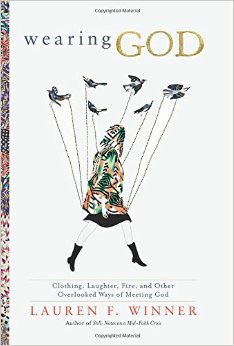 Wearing God; Clothing, Laughter, Fire, and Other Overlooked Ways of Meeting God Lauren Winner (HarperOne) $24.99 Again, you may know that we’ve mentioned this often and have been glad to tell about it, over and over. We have been boosters of Ms. Winner’s books since her first extraordinary memoir, Girl Meets God. We are thrilled that there was released, just a few months ago, a new, expanded edition of her great second book, Mudhouse Sabbath. We have often recommended her Real Sex and I was deeply touched by her sad memoir, Still: Mid-Faith Crisis. In this new book about unusual images and metaphors for God used in the Bible she steps away just a bit from memoir (although it is still written in her signature style and offers glimpses into her own journey in appropriating these images.)
Wearing God; Clothing, Laughter, Fire, and Other Overlooked Ways of Meeting God Lauren Winner (HarperOne) $24.99 Again, you may know that we’ve mentioned this often and have been glad to tell about it, over and over. We have been boosters of Ms. Winner’s books since her first extraordinary memoir, Girl Meets God. We are thrilled that there was released, just a few months ago, a new, expanded edition of her great second book, Mudhouse Sabbath. We have often recommended her Real Sex and I was deeply touched by her sad memoir, Still: Mid-Faith Crisis. In this new book about unusual images and metaphors for God used in the Bible she steps away just a bit from memoir (although it is still written in her signature style and offers glimpses into her own journey in appropriating these images.)
Wearing God is at once memoir and glimpses from church history, a resource for spiritual formation and a call to generous, radical discipleship. It explores unusual visions and understandings of God (from the Scriptures) showing how they were understood or used by older mystics and saints, and ways in which thinking beyond our customary go-to names and images of God can help us in our relationship with the Holy One. Yes, the God of the Bible is revealed as clothing, as fire, as laughter, as mother, and more. This is a lovely, well-researched book, thoughtful and wise and deep and good. There are stories of Winner’s own journey, grappling with Scripture and church fathers and mothers, and telling of how these fresh images can deepen our own spirituality. She is now an Episcopal priest and she remains a thoughtful, curious, even eccentric writer, one I enjoy and one whose books I am happy to commend. Wearing God! What a great idea, one of the best of 2015.
BEST BOOKS OF THEOLOGY
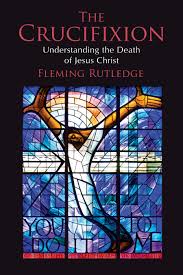 The Crucifixion: Understanding the Death of Jesus Christ Fleming Rutledge (Eerdmans) $45.00 This major work has gotten more advanced rave reviews and remarkable blurbs than any such book I’ve seen in years; major theologians, Bible scholars, denominational leaders and seminary profs all agree that this is a book that is stunning in scope, beautiful in its lucid, careful, prose, and passionate in its formulation of a view of the atonement and the work of the cross that seems to be both ancient and contemporary. Rutledge is perhaps on the more conservative end of the spectrum within her more liberal Episcopalian denomination (she was one of the first women officially ordained by the Episcopalians back in the 70s and has been a stalwart thinker, pastor and preacher within the Anglican communion until her recent retirement from parish ministry.) Even if new and edgy thinkers might find her a bit traditionalist, older school evangelical scholars might find her too progressive or ecumenical. We, of course, think this is a good place to be – too conservative for the liberals, too liberal from the conservatives – and brings a fresh, exciting, new vision to bear that helps us get beyond these stereotypes and binaries. More significantly, though is how she is significantly committed to breaking open the Bible itself, and offers significant, insightful, fascinating rumination on not just theology, but on Scripture. It is one of the major books of our time, a tour de force, magisterial, and one that should read widely.
The Crucifixion: Understanding the Death of Jesus Christ Fleming Rutledge (Eerdmans) $45.00 This major work has gotten more advanced rave reviews and remarkable blurbs than any such book I’ve seen in years; major theologians, Bible scholars, denominational leaders and seminary profs all agree that this is a book that is stunning in scope, beautiful in its lucid, careful, prose, and passionate in its formulation of a view of the atonement and the work of the cross that seems to be both ancient and contemporary. Rutledge is perhaps on the more conservative end of the spectrum within her more liberal Episcopalian denomination (she was one of the first women officially ordained by the Episcopalians back in the 70s and has been a stalwart thinker, pastor and preacher within the Anglican communion until her recent retirement from parish ministry.) Even if new and edgy thinkers might find her a bit traditionalist, older school evangelical scholars might find her too progressive or ecumenical. We, of course, think this is a good place to be – too conservative for the liberals, too liberal from the conservatives – and brings a fresh, exciting, new vision to bear that helps us get beyond these stereotypes and binaries. More significantly, though is how she is significantly committed to breaking open the Bible itself, and offers significant, insightful, fascinating rumination on not just theology, but on Scripture. It is one of the major books of our time, a tour de force, magisterial, and one that should read widely.
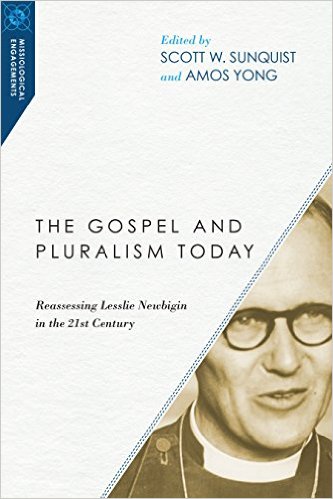 The Gospel and Pluralism Today: Reassessing Lesslie Newbigin in the 21st Century edited by Scott W. Sunquist and Amos Yong (IVP Academic) $28.00 I hope you know how important Newbigin has been — of his many, many books, his 1986 Foolishness to the Greeks is my favorite, but his most important and respected and discussed is his Gospel in a Pluralistic Society (published by Eerdmans in the late 1980s.) He has written about epistemology, about mission, about culture, about the Bible, about the shifts in the West from modernity to post-modernity. Indeed the important Gospel in Our Culture Network emerged from a Newbigin study group. He was an exceptional missionary, churchman, scholar, and Christian leader and his nuanced reading of secularizing pluralism — and how to bear witness in fruitful ways in such a culture — were groundbreaking. This book explores not only the impact of his thinking, it continues his work by analyzing the nature of 21st century Western pluralism, and it asks how we might continue to do misisons at home and abroad inspired by these generative insights.
The Gospel and Pluralism Today: Reassessing Lesslie Newbigin in the 21st Century edited by Scott W. Sunquist and Amos Yong (IVP Academic) $28.00 I hope you know how important Newbigin has been — of his many, many books, his 1986 Foolishness to the Greeks is my favorite, but his most important and respected and discussed is his Gospel in a Pluralistic Society (published by Eerdmans in the late 1980s.) He has written about epistemology, about mission, about culture, about the Bible, about the shifts in the West from modernity to post-modernity. Indeed the important Gospel in Our Culture Network emerged from a Newbigin study group. He was an exceptional missionary, churchman, scholar, and Christian leader and his nuanced reading of secularizing pluralism — and how to bear witness in fruitful ways in such a culture — were groundbreaking. This book explores not only the impact of his thinking, it continues his work by analyzing the nature of 21st century Western pluralism, and it asks how we might continue to do misisons at home and abroad inspired by these generative insights.
This brand new book is, without a doubt, the best thing I have yet seen assessing the significance of Newbigin, excellent for anyone who has read his work, or for those wanting to get caught up to speed, as they say. Just listen to these wonderful endorsements from the back cover.
After a quarter century, Lesslie Newbigin’s testimony to ‘the gospel in
a pluralist society’ still feels strikingly relevant, penetrating in
its analysis and winsome in its pastoral encouragement of Christian
discipleship and witness. Such is the testimony of the authors of this
volume, who rehearse, interpret, receive and build upon Newbigin’s
missional wisdom. They have done us the great service of calling us to
do likewise! George R. Hunsberger, professor emeritus of missiology,
Western Theological Seminary
As I write this, I’m sitting in a coffee shop in
Winson Green, Birmingham, where Lesslie Newbigin pastored after
returning from India. Newbigin loved this community, with all its
cultural and religious diversity. He was always a pastor. But he was
also a scholar who studied cultures theologically and philosophically.
In The Gospel and Pluralism Today, Scott W. Sunquist and Amos
Yong bring together a remarkable collection of papers that reveal the
ongoing value and contribution of Newbigin’s work. But Sunquist and
Yong’s book doesn’t stop at Newbigin’s contribution. It builds on
Newbigin’s thought, and it explores critical cultural and missionary
issues that have emerged in the twenty-first century. In brief, this
book is an invaluable addition to missiology and to the study of
Newbigin’s pastoral-missionary paradigm.” Graham Hill, Morling College,
author of GlobalChurch
Kudos to those who put this together. Scott Sunquist, by the way, had been a professor at Pittsburgh Theological Seminary here in Pennsylvania and we have crossed paths with him at events as varied as Wee Kirk and CCO staff training. There is another Western Pennsylvania scholar represented here, Dr. Esther Meeks, who teaches at Geneva College and is a scholar of Michael Polyani — important for Newbigin studies, too. This exceptional book developed out of a conference at Fuller, where the editors teach, and deserves to be awarded and deserves to be widely read.
BEST BOOKS ABOUT LEWIS & TOLKIEN
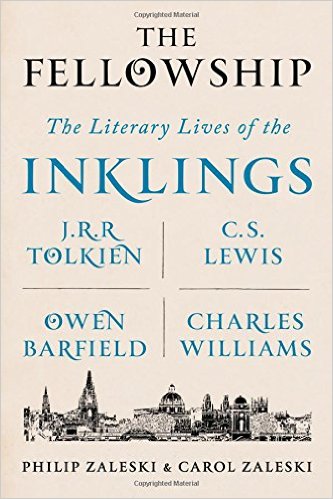 The Fellowship: The Literary Lives of the Inklings: JRR Tolkien, C.S. Lewis, Owen Barfield, Charles Williams Philip and Carol Zaleski (Farrar Straus Giroux) $35.00 I am sure this deserves a very special shout out, an honorable mention and more. Not a few very smart folks I respect insist it is one of the best books they’ve ever read, and a few have found it very helpful in their own appreciation for how Lewis & Company did their work. This is not the first book on the Inklings, nor will it be the last. Others have similarly explored the essential art of collaboration nurture at their legendary gatherings and the Child. In a year when there have been several significant books about Lewis and Tolkien et al, this is said to be a tour de force, a spectacular and major work.
The Fellowship: The Literary Lives of the Inklings: JRR Tolkien, C.S. Lewis, Owen Barfield, Charles Williams Philip and Carol Zaleski (Farrar Straus Giroux) $35.00 I am sure this deserves a very special shout out, an honorable mention and more. Not a few very smart folks I respect insist it is one of the best books they’ve ever read, and a few have found it very helpful in their own appreciation for how Lewis & Company did their work. This is not the first book on the Inklings, nor will it be the last. Others have similarly explored the essential art of collaboration nurture at their legendary gatherings and the Child. In a year when there have been several significant books about Lewis and Tolkien et al, this is said to be a tour de force, a spectacular and major work.
I admit that I have not read it yet, but am eager to work through it – all 650+ pages! You?
 A Hobbit, A Wardrobe, and a Great War: How J.R.R. Tolkien and C.S. Lewis Rediscovered Faith, Friendship, and Heroism in the Cataclysms of 1914 – 1918 Joseph Loconte (Thomas Nelson) $24.99 This was one of the best of the several Lewis-related books I read this year and I was pleased to have written about it when it first came out. Many critics have extolled it’s historical and sociological insight, specifically about the spirit of the age as it impacted Western Europe, philosophically, religiously, psychologically, and how this Earth-shattering epochal change in outlook – caused by the horrors of World War I – effected these writers. Lewis and Tolkien both saw awful action in the Great War and it affected them in ways that no one has explored so diligently before. This is a great book for understanding the cultural shifts that came to greater flower in the late 20th century, and it is a great book for understanding two of the century’s most beloved writers. The book was riveting, to say the least, and, I think, very important.
A Hobbit, A Wardrobe, and a Great War: How J.R.R. Tolkien and C.S. Lewis Rediscovered Faith, Friendship, and Heroism in the Cataclysms of 1914 – 1918 Joseph Loconte (Thomas Nelson) $24.99 This was one of the best of the several Lewis-related books I read this year and I was pleased to have written about it when it first came out. Many critics have extolled it’s historical and sociological insight, specifically about the spirit of the age as it impacted Western Europe, philosophically, religiously, psychologically, and how this Earth-shattering epochal change in outlook – caused by the horrors of World War I – effected these writers. Lewis and Tolkien both saw awful action in the Great War and it affected them in ways that no one has explored so diligently before. This is a great book for understanding the cultural shifts that came to greater flower in the late 20th century, and it is a great book for understanding two of the century’s most beloved writers. The book was riveting, to say the least, and, I think, very important.
 Women and C.S. Lewis: What His Life and Literature Reveal for Today’s Culture edited by Carolyn Curtis and Mary Pomroy Key (Lion Hudson) $17.95 There has been way too little written on this topic, and aside from a few major works (I think of the under-appreciated A Sword Between the Sexes? C.S. Lewis and the Gender Debates by Mary Stewart Van Leeuwen) there hasn’t been a sustained attention to this in decades. Sexism in Narnia? Or in Screwtape? On among the Inklings? And what should those who appreciate Lewis make of the attacks by the likes of Pullman, who declared Jack a misogynist? Well, what a provocative and important set of questions, and what a fine and fair collection of essays on the topic. It is thoughtful, informed, and altogether fascinating.
Women and C.S. Lewis: What His Life and Literature Reveal for Today’s Culture edited by Carolyn Curtis and Mary Pomroy Key (Lion Hudson) $17.95 There has been way too little written on this topic, and aside from a few major works (I think of the under-appreciated A Sword Between the Sexes? C.S. Lewis and the Gender Debates by Mary Stewart Van Leeuwen) there hasn’t been a sustained attention to this in decades. Sexism in Narnia? Or in Screwtape? On among the Inklings? And what should those who appreciate Lewis make of the attacks by the likes of Pullman, who declared Jack a misogynist? Well, what a provocative and important set of questions, and what a fine and fair collection of essays on the topic. It is thoughtful, informed, and altogether fascinating.
Authors who contribute here include many Lewis scholars and very impressive names: Kathy Keller, Alister McGrath, Monkia Hider, Don W. King, Colin Duriez, David Downing, Malcolm Guite, Holly Ordway and more. The ringing endorsements range from Walter Hooper to Eric Metaxas to the excellent Diana Pavlac Glyer (we have her new Kent State University Press book about the collaboration among the Inklings, Bandersnatch, by the way.) Just when I thought I had read enough about Lewis this year, this book captured my attention, and many of the reviews I’ve read have affirmed that this is fresh writing, in many cases innovative and insightful new contributions. There are interviews, here, essays and articles, some long and some less so. C.S. Lewis and Women is a very fine addition to your Lewis-related library, and an excellent way to re-introduce Lewis to our contemporary conversations. Spot on, Curtis and Key! Cheerio.
BEST MEMOIRS
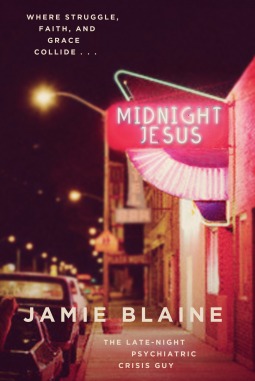 Midnight Jesus: Where Struggle, Faith, and Grace Collide Jamie Blaine (Nelson) $15.99 Oh my, what a fun, interesting book that I simply could not put down. Few books this year struck me so, as I enjoyed the antics of this late night intake counselor at a psychiatric clinic, an intervention specialist, and drug and alcohol social worker. From getting beat up by crazed clients to hanging out with the sad and suicidal to telling of his beautiful relationships with the down and out, the lost and lonely, Jamie Blaine is a saint, a strange one, perhaps, a blue-collar, pin-ball playing man of the streets with a generous streak a mile wide and a knack for immediately bonding with the strange ones, those with ripped and worn heavy metal tee shirts, with abused strippers, with con men and stilted lovers and autistic kids. And did I mention that some of the most glorious, glorious writing in the book is describing the glories of his side hustle, working as a DJ at the local roller rink? I’m not kidding; this book is about reaching out with few answers but an abiding conviction that God Is There and, in the person of Jesus, invites us to trust in goodness.
Midnight Jesus: Where Struggle, Faith, and Grace Collide Jamie Blaine (Nelson) $15.99 Oh my, what a fun, interesting book that I simply could not put down. Few books this year struck me so, as I enjoyed the antics of this late night intake counselor at a psychiatric clinic, an intervention specialist, and drug and alcohol social worker. From getting beat up by crazed clients to hanging out with the sad and suicidal to telling of his beautiful relationships with the down and out, the lost and lonely, Jamie Blaine is a saint, a strange one, perhaps, a blue-collar, pin-ball playing man of the streets with a generous streak a mile wide and a knack for immediately bonding with the strange ones, those with ripped and worn heavy metal tee shirts, with abused strippers, with con men and stilted lovers and autistic kids. And did I mention that some of the most glorious, glorious writing in the book is describing the glories of his side hustle, working as a DJ at the local roller rink? I’m not kidding; this book is about reaching out with few answers but an abiding conviction that God Is There and, in the person of Jesus, invites us to trust in goodness.
Man, I hope this dude is working on a sequel – I’d read whatever he wrote, now, but am already itching for more stories of his colorful, Pentecostal, rock-and-roll psychiatric, roller-skating, pin-ball-playing life. If we gave him an award, he’d just give it away to somebody at the Quickie Mart or use it to help somebody at the psych ward. Here’s to that.
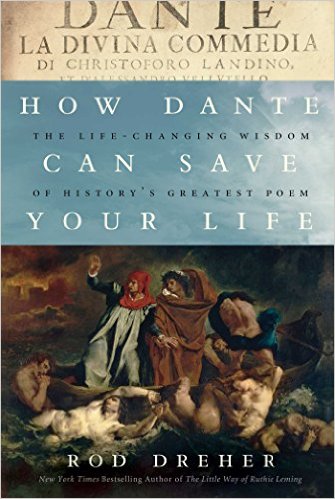 How Dante Can Save Your Life: The Life-Changing Wisdom of History’s Greatest Poem Rod Dreher (Regan Arts) $29.95 I have written about this at length, and shared my appreciation for this often in these last months. Before I actually read it, I admired how handsomely it was designed, and shelved it under literary criticism; it is, after all, a study of Divine Comedy.
How Dante Can Save Your Life: The Life-Changing Wisdom of History’s Greatest Poem Rod Dreher (Regan Arts) $29.95 I have written about this at length, and shared my appreciation for this often in these last months. Before I actually read it, I admired how handsomely it was designed, and shelved it under literary criticism; it is, after all, a study of Divine Comedy.
Well, one of the great experiences this fall was meeting Dreher (at a Christian Legal Society conference where we were selling his book.) And I soon realized this marvelous book is actually written as a memoir: it is the story of Rod reading Dante. It actually is a sequel to The Little Way of Ruthie Leming his tear-jerking and altogether lovely memoir of leaving the fast-paced, high-powered life of a culture reporter, political pundit, and film critic to move to rural Louisiana to be with his extended family after the death of his beloved sister. Alas, he gets settled in to this family-oriented, slower paced Southern town only to realize not all is well in the family system. He gets depressed, develops an auto-immune illness from the stress, gets into counseling, helps plant an Orthodox church, and — low and behold — finds the thing that helps him out of his serious funk and the serious dysfunctions of his not so warm and friendly way of life is reading The Divine Comedy. This is a southern, nearly Gothic tale, a study of Dante, and the thinking person’s self help book. I loved it.
Eric Metaxas gets it right when he says,
Sometimes a book comes along that you want to press into the hands of everyone you know. A brilliant, searingly honest account of one man’s path to real healing, and an invitation to the rest of us to join him.
Ronald Herzman, the SUNY professor who teaches the audio Great Courses lectures on The DIvine Comedy says “Dreher has assimilated what is most urgent in Dante and makes The Divine Comedy passionately real. And I say Dreher deserves a Hearts & Minds Book of the Year award. It won’t help him as much as reading Dante, I suppose, but nonetheless: how do you say congratulations in Latin?
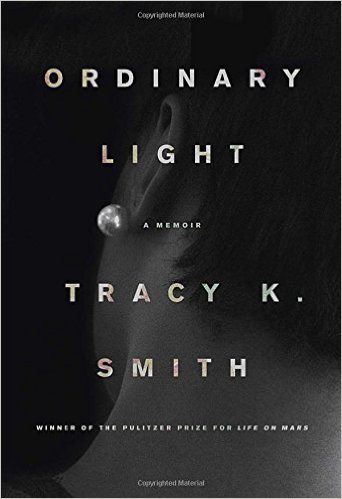 Ordinary Light: A Memoir Tracy K. Smith (Alfred Knopf) $25.95 I love memoirs and have not long ago written a brief explanation of why it is helpful to see how other narrate their lives. When a book is both beautifully written and tells the tales of a fascinating life, such a story grabs me and entertains me, and I come away enriched. Tracy Smith won the Pulitzer Prize a few years back for her Life on Mars and has proven herself a remarkable, stellar author, a delightful writer with flowing prose that is artful without being obscure. She has remarkable recall of her mature observations and great wit as she grew up in a large African American family in the 1980s and on. Her mother was a devout Christian – together they read Little Visits With God every night and Smith embraced a fascinating fastidiousness about being a good child. As she came to meet extended family members, talked with her scientist father, and eventually learned the stories of her parents involvement in the earlier days of the civil rights movement she increasingly comes into her own. Reading Ordinary Light is nearly effortless, yet a literary delight. The opening scene, telling of the death of her mother, was gripping, perfectly realized. What a great, great book.
Ordinary Light: A Memoir Tracy K. Smith (Alfred Knopf) $25.95 I love memoirs and have not long ago written a brief explanation of why it is helpful to see how other narrate their lives. When a book is both beautifully written and tells the tales of a fascinating life, such a story grabs me and entertains me, and I come away enriched. Tracy Smith won the Pulitzer Prize a few years back for her Life on Mars and has proven herself a remarkable, stellar author, a delightful writer with flowing prose that is artful without being obscure. She has remarkable recall of her mature observations and great wit as she grew up in a large African American family in the 1980s and on. Her mother was a devout Christian – together they read Little Visits With God every night and Smith embraced a fascinating fastidiousness about being a good child. As she came to meet extended family members, talked with her scientist father, and eventually learned the stories of her parents involvement in the earlier days of the civil rights movement she increasingly comes into her own. Reading Ordinary Light is nearly effortless, yet a literary delight. The opening scene, telling of the death of her mother, was gripping, perfectly realized. What a great, great book.
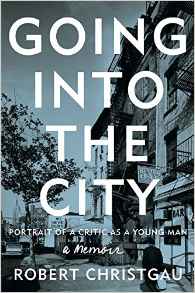 Going Into the City: Portrait of a Critic as a Young Man Robert Christgau (Dey Street Books) $27.99 Okay, this may not be for everyone, but I think it is one of the most enjoyable and exciting books I’ve read all year. I wrote a very long review of it, which I’ve not posted (email me if you want to see it.) This is the vulgar and at times brilliant memoir of one of the top two or three rock critics of the last 50 years, and an author who helped, literally, shape the craft of rock journalism. His album reviews and rock star interviews are legendary (and brilliant) and this book tells the fascinating (at times exasperating, at times hilarious, at times nearly breathtaking) back story of his work in the rising field of rock music from the 60s on. More, besides the cool reports of this backstage scene, that party and that interview with this or that mega-star – yes, you know the biggest stars of our lifetime! – Christgau spends a lot of time telling about how small magazines got started, how bigger, mainstream journals began to accept album reviews, and what it was like to write both major pieces and smaller reviews for some of the most immediately recognizable media outlets of our time. In this sense, it is about the vocation of being a writer, a critic, a working magazine journalist. Mr. Christgau’s professional passion (the art of journalism, the craft of writing, the making of a living with words, doing intellectual criticism) is a theme of the book (and of my longer review) as he takes up networking other rock writers, pursuing serious on-going conversations about the nature of this work, what it is trying to accomplish and how to do it well, doing workshops, even teaching, eventually, essentially inventing a new craft, a new vocation, creating the calling of rock critic. (There are, as I try to explain in my reflection on the book, parallels here for thoughtful Christian journalists who themselves have networked and confab-ed and sweat blood and tears to make a difference in their salons and zines and alternative publications.)
Going Into the City: Portrait of a Critic as a Young Man Robert Christgau (Dey Street Books) $27.99 Okay, this may not be for everyone, but I think it is one of the most enjoyable and exciting books I’ve read all year. I wrote a very long review of it, which I’ve not posted (email me if you want to see it.) This is the vulgar and at times brilliant memoir of one of the top two or three rock critics of the last 50 years, and an author who helped, literally, shape the craft of rock journalism. His album reviews and rock star interviews are legendary (and brilliant) and this book tells the fascinating (at times exasperating, at times hilarious, at times nearly breathtaking) back story of his work in the rising field of rock music from the 60s on. More, besides the cool reports of this backstage scene, that party and that interview with this or that mega-star – yes, you know the biggest stars of our lifetime! – Christgau spends a lot of time telling about how small magazines got started, how bigger, mainstream journals began to accept album reviews, and what it was like to write both major pieces and smaller reviews for some of the most immediately recognizable media outlets of our time. In this sense, it is about the vocation of being a writer, a critic, a working magazine journalist. Mr. Christgau’s professional passion (the art of journalism, the craft of writing, the making of a living with words, doing intellectual criticism) is a theme of the book (and of my longer review) as he takes up networking other rock writers, pursuing serious on-going conversations about the nature of this work, what it is trying to accomplish and how to do it well, doing workshops, even teaching, eventually, essentially inventing a new craft, a new vocation, creating the calling of rock critic. (There are, as I try to explain in my reflection on the book, parallels here for thoughtful Christian journalists who themselves have networked and confab-ed and sweat blood and tears to make a difference in their salons and zines and alternative publications.)
If there are a handful of significant and popularly respected film critics – think Roger Ebert, for instance – Bob Christgau is a similarly significant pioneer of pop music criticism. Given what rock music was and where he was situated, there are copious amounts of sex and drugs and Marxist revolution in the air. What a glimpse Going into the City offers into the popular arts, the 60s counter-culture, the commercialization of rock, and the calling into a career in radical journalism; what a story about a young artist moving into the Big Apple. Christgau is obviously a colorful, dense, intelligent writer, and his telling of this tale was stimulating and made me want to explore many of the significant pieces he described writing, publishing, promoting or despising. I became interested in his friends and lovers, even as much more famous stars were in the background of this memoir. I loved this book and, although it isn’t for everyone, I couldn’t put it down.
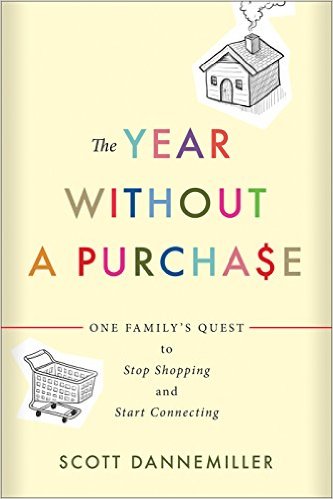 The Year Without A Purchase: One Family’s Quest to Stop Shopping and Start Connecting Scott Dannemiller (WJK) $16.00 I have written about this a few times, and I think, come to think of it, that I laughed out loud more reading this book last summer than any book I read all year. And, it was inspiring, up-lifting, well, in a way. It made me realize I’m not alone in this dumb struggle to figure out a sane lifestyle. Anyway, I have to give this some honorable mention, and will do so by reprinting what I’ve said before.
The Year Without A Purchase: One Family’s Quest to Stop Shopping and Start Connecting Scott Dannemiller (WJK) $16.00 I have written about this a few times, and I think, come to think of it, that I laughed out loud more reading this book last summer than any book I read all year. And, it was inspiring, up-lifting, well, in a way. It made me realize I’m not alone in this dumb struggle to figure out a sane lifestyle. Anyway, I have to give this some honorable mention, and will do so by reprinting what I’ve said before.
This unassuming little volume is certainly one of my favorite books of the year — it made me laugh right out loud, made me cry and made me wonder what in the world they’d do next. And what in the world I might do next. It’s fun and really funny, as Dannemiller offers an insiders look into this family’s zany plan not to buy anything for a year (except food and essentials. And the stuff they might cheat on. Ha.)
Margot Starbuck says it is “playful, thoughtful, substantial” and she is right. This family really did try to connect with others, living well on less, and it is told with a wink and a sly grin, even as it is nicely inviting and even compelling. Of course you don’t have to do what the Dannemiller’s — Scott, Gabby and two loud, smart kids — did, but it will inspire you to wonder about how you do your kids birthday parties, how you give gifts at holidays, how you do family vacations, and how you do or don’t fix or reuse stuff, what purchases you deem essential. Most of us are troubled by our own materialism, it seems, and most of us are aware of how the majority world lives in poverty. (The Dannemiller’s were Presbyterian missionaries for a year, doing social service in Central America, and lived in a poor, rural village.) This is a nice way to grapple more with being “rich Christians in an age of hunger” without being grumpy or anxious or overly political or guilt-induced. It’s a funny book, did I say that?
I love these kinds of reports from the front lines of a year-long experiment, memoirs of a slice of life as a family tries to accomplish something good. This one does just that, and I couldn’t put it down — I like reading about other families, about other dads, about other ordinary Christians trying to be more just, sustainable, joy-filled, and faithful. It would make a great book with which to kick off the year, even if you have no intention of doing anything like what Scott Dannemiller and his wife and kids did. Enjoy!
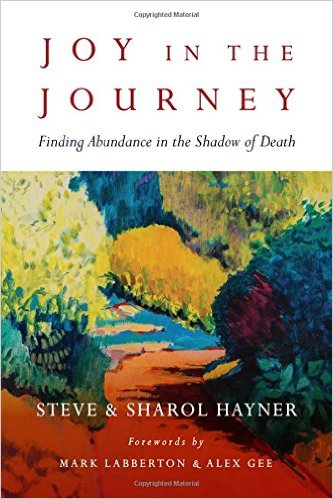 Joy in the Journey: Finding Abundance in the Shadow of Death Steve & Sharol Hayner (IVP) $16.00 There are a number of customers who have purchased this book from us this fall, and are suggesting it be named the book of the year. It really has had that impact, and, although brief, it is a very powerful story, by an important figure. Hayner worked with InterVarsity Christian Fellowship and in those years I had the privilege of crossing paths with him a few times. Steve ended up — as an evangelical in the mainline church — teaching at, and eventually installed as the President of, Columbia Theological Seminary, an important institution within my own Presbyterian Church (USA); again, we had opportunity to chat a time or two. I admired him greatly and was saddened by his untimely death. To honor this extraordinary book, I’d like to reprint what I wrote about it after I first read it. It’s a little longer, but it deserves no less.
Joy in the Journey: Finding Abundance in the Shadow of Death Steve & Sharol Hayner (IVP) $16.00 There are a number of customers who have purchased this book from us this fall, and are suggesting it be named the book of the year. It really has had that impact, and, although brief, it is a very powerful story, by an important figure. Hayner worked with InterVarsity Christian Fellowship and in those years I had the privilege of crossing paths with him a few times. Steve ended up — as an evangelical in the mainline church — teaching at, and eventually installed as the President of, Columbia Theological Seminary, an important institution within my own Presbyterian Church (USA); again, we had opportunity to chat a time or two. I admired him greatly and was saddened by his untimely death. To honor this extraordinary book, I’d like to reprint what I wrote about it after I first read it. It’s a little longer, but it deserves no less.
Where to begin to explain the significance of this handsome, small hardback, and why it matters? How does the memoir of a dying saint, one known for signing his emails “joyfully” help us all? I admit I’ve met the late Steve Hayner a time or two and care deeply about some of the organizations he has served (including InterVarsity Christian Fellowship and, in the last years of his life, Columbia Theological Seminary in Decatur, Georgia, where he served as President.) But whether you had the great privilege of knowing this extraordinary, joyful Christian leader or not, and whether you are particularly interested in a memoir of death and dying or not, let me tell you: this is a book about faith formation, about daily discipleship, about learning to live well as a Christ-follower in families, organizations, among friends scattered; it is about faith and hope and trust and goodness. and, yes, joy in the journey.
As a nationally known evangelical para-church leader who later served as an administrator at a Christian university, became an ordained pastor (serving for a while a mostly black church) who surprisingly became a professor at a mainline denominational seminary, where he eventually became President, the story of Hayner’s life and ministry is itself a noteworthy one. (I wish I knew more about his move to Columbia, where he became colleagues with the likes of Elizabeth Johnson, Marcia Riggs, or Walt Brueggemann.) As Mark Labberton writes in his must-read, exceptionally moving introduction, Hayner mentored many individuals over the years, staying in close touch, involved in life-giving friendships with many, even as he served in demanding positions on the Boards of Fuller Theological Seminary, World Vision, and the anti-trafficking organization, the International Justice Mission. His wholistic view of faith – embracing growth in theology, spirituality, multi-ethnic ministry, social concerns and public justice work, was exemplary, and he helped other live into that vision. “He wanted,” in just one of the beautiful phrases in Labberton’s piece, drawn from The Message paraphrase of Psalm 31:8, “others…to have the room to breathe fully human lives, made in the image of God.”
To be clear, Joy in the Journey is made up mostly of personal reports and spiritual journaling from a public diary Steve and his wife Sharol kept on the CaringBridge website, chronicling their faith journey as Steve was diagnosed with pancreatic cancer over Easter weekend of 2014 until his death, in his mid-60s, on January 31, 2015. There is included of a bit of contextual medical background, offered before most entries, and a handful of sidebars by other folks, letters they wrote to Steve or Sharol, or observations offers along the way. The entries unfold like a fast-moving tragedy, but yet — and this is why this is such a very good book to read — Steve and Sharol both have an ability to ruminate on their lives in ways that reveal their spiritual disciplines and dispositions, framing their hardships by the very things they believed most deeply; they share their own reflections upon Bible verses or passage or Psalms that helped them, and they are honest about their prayers and hopes and struggles.
These entries are excruciatingly intimate at times, and exceptionally admirable. They are not idealized or over-spiritualized, but they are grounded so well in a well-lived faith. I know — and the diary entries reveal — that they are ordinary people, in many ways like any of us. (Steve himself wrote how grumpy and petty he was with his grandchildren during what he knew would be their last Christmas together, a mundane admission that nearly brought me to tears with the disappointing ordinariness of it.) Still, I have never read anything so wonderful about approaching death with joy and trust. As Steve signs off near the very end, noting that he is under hospice care, then, he still looks forward to living into joy.
After Steve’s death there was, of course, a large outpouring of support, and the memorial service was a tribute to the resurrection power only Christ can bring. The entries in this epilogue are from his family, mostly, and remind us all of the beauty of a life well lived, of the quiet habits of a man committed to God’s reign, who served the church and the world, and who had mature and lovely relationships with family and friends. Joy in the Journey: Finding Abundance in the Shadow of Death is a tear-jerker, to be sure, but I cannot commend it to you enough.
As good as these diary-type entries are, listening in to the real-time reflections of a couple struggling with tragic illness, the evils of cancer, the quandaries of medical care, their professional obligations and their extended family, their marriage, their prayer lives, and eventually Steve’s death, I want to also note that the two introductions that open the volume are themselves worth the price of the book.
Mark Labberton was influenced profoundly by Hayner as an undergrad as Steve was his campus minister. Their lives unfolded similarly, and Steve continue to be a mentor and friend to Labberton (even as Mark, arguably, became more famous as an author and the President of Fuller, one of the worlds largest and most diverse seminaries.) They remained life-long friends, so much so that Mark could report about Steve’s deepest desires – and how he understood that joy was deeply connected to “that wide place of God’s grace.” Labberton honors Steve well in this reflection and it is nothing short of stunning. Oh, how I wish for all of us to have friends, friends like Labberton was to Steve, able to tell about his strengths, his gifts, his faithfulness. From Mark’s tribute you can see how well he knew Steve and Sharol, and his testimony is inspiring. But – ahh, here it is – Labberton could only report all this stuff about Steve because Steve was that kind of friend to him. To realize the power and blessing of life-long friendship seen in that preface is a gentle but clear reminder to us all: who do have in this life that shares our faith journey and knows us so well?
Another person that was one of Steve’s best friends was the African American leader Alex Gee. It was Gee who invited Steve to become his associate pastor, in part, because he wanted Steve to understand the emotional toll of being a minority leader, not only so he could more experientially understand cross cultural ministry, but so that Steve could more deeply understand what his friend Alex – a black man who often spoke and ministered in largely white settings – goes through in such complicated situations. Steve said yes to this surprising arrangement, which illustrates much about Steve’s adventuresome faithfulness, but also how loyal he was to his friends and co-workers in gospel ministry. This and a few other anecdotes from Gee really are helpful in helping us care about Hayner and his wife, before we even start the first page of their diaries.
Again, this short foreword by Gee, about Steve, is exceptionally inspiring, and I think it makes this book an even greater resource for your own spiritual formation. Don’t you want to be the kind of person about which these things could be said of you? Don’t we often make fresh commitments to new sorts of spiritual practices or goals or hopes for ourselves as we look at others whom we admire? (“Follow my example as I follow Christ,” the apostle Paul said more than once!) So, in this book, Hayner’s own diary tells the story, but these two introductory pieces serving as brief tributes, the testimonials offered by Labberton and Gee, will inspire you to want serve well, living with authenticity and joy.
As Gee writes, wisely – putting into words exactly why I am listing this as one of the best books to read this for faith formation,
After walking with Steve in his final months, I am considering where his life challenges mine. Where is God calling me to invest my time and energy? I’m asking what and who I need in life in order to face death with hope, joy, and confidence. What changes do I need to make today in order to finish well? As you journey with Steve and Sharol in the following pages, how will you answer these questions?
FOR CHURCH LEADERS
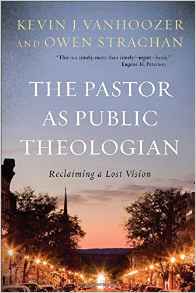 The Pastor as Public Theologian: Reclaiming a Lost Vision Kevin Vanhoozer & Owen Strachan (Baker Academic) $19.99 Again, this is one I have written about before and, I trust, is one that you will agree is a “no brainer” as one of the most important books of the year. This wise and passionate call for churches to see their pastors as resident theologians, and for clergy to see as part of their own calling the on-going task of being a theologian with and for the congregation, is one we who care about reading and books would naturally sound out: what pastor worth his or her salt isn’t reading seriously, citing authors, teaching about what they are learning, helping congregants deepen their discipleship by engaging in the task of doing theology?
The Pastor as Public Theologian: Reclaiming a Lost Vision Kevin Vanhoozer & Owen Strachan (Baker Academic) $19.99 Again, this is one I have written about before and, I trust, is one that you will agree is a “no brainer” as one of the most important books of the year. This wise and passionate call for churches to see their pastors as resident theologians, and for clergy to see as part of their own calling the on-going task of being a theologian with and for the congregation, is one we who care about reading and books would naturally sound out: what pastor worth his or her salt isn’t reading seriously, citing authors, teaching about what they are learning, helping congregants deepen their discipleship by engaging in the task of doing theology?
Of course there are huge questions here, some of which Vanhoozer and Strachan take up, some which they don’t – why is it that the clergyperson who is mostly called to this task? What even is theology, and how does the discipline, typically understood, fuel and equip ordinary congregants to think faithfully not just about academic theological topics, but about their application in their worlds of career and home-life, of civic engagement and their entertainment life? Yes, yes, we need to be theologically aware and theologically astute; and, yes, there are intellectual resources for congregants that they bring to the table, their own lived experience of life in the neighborhood or marketplace, that can loop back and inform the pastor’s own study and teaching. I think this is a remarkably important and very interesting book, but I also think (as I suggested in my first BookNotes review) that there are other sorts of Christian intellectual pursuits beyond theology proper that need to happen within the church, faith-based scholarship of the scientist, the lawyer, the businesswoman, the film critic, the psycho-therapist. Yes, the pastor must do theology, but how does this serve the Biblically-informed thinking of people beyond the field of theology proper? This book can help unlock lots of great conversations and we are thrilled to honor it here.
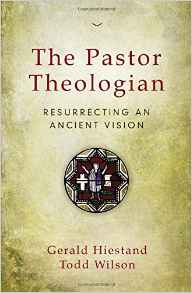 Interestingly, another great book was released on this exact same topic this year, one that, unfortunately, didn’t get as much attention, so we’ll list it, here, too, also with great gusto: The Pastor as Theologian: Resurrecting An Ancient Vision by Gerald Hiestand & Todd Wilson (Zondervan; $18.99.) It, too, is very, very good, and certainly deserving to be commended as one of the great books this year. Peter Leithart (of the Theopolis Institute) commends it, saying it will help us recover a sense of pastors being the intellectual shepherd of the church. He writes, “The renewal of what Hiestand & Wilson call ecclesial theology will provide a needed transfusion into theologically anemic pastoral ministry and pastorally anemic theology.” Both of these books deserve our accolades and, more importantly, deserve to be bought, read, discussed, and taken seriously. Kudos.
Interestingly, another great book was released on this exact same topic this year, one that, unfortunately, didn’t get as much attention, so we’ll list it, here, too, also with great gusto: The Pastor as Theologian: Resurrecting An Ancient Vision by Gerald Hiestand & Todd Wilson (Zondervan; $18.99.) It, too, is very, very good, and certainly deserving to be commended as one of the great books this year. Peter Leithart (of the Theopolis Institute) commends it, saying it will help us recover a sense of pastors being the intellectual shepherd of the church. He writes, “The renewal of what Hiestand & Wilson call ecclesial theology will provide a needed transfusion into theologically anemic pastoral ministry and pastorally anemic theology.” Both of these books deserve our accolades and, more importantly, deserve to be bought, read, discussed, and taken seriously. Kudos.
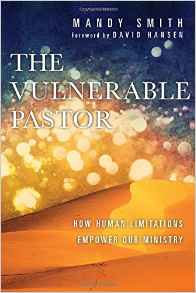 The Vulnerable Pastor: How Human Limitations Empower Our Ministry Mandy Smith (IVP) $16.00 I believe this beautifully written book — even though it seems to be mostly for pastors — would be an excellent read for anyone involved in church leadership or engaged in congregational ministry and certainly for those doing para-church ministry. Mandy is a vibrant young-ish woman serving as the lead pastor in an interesting urban church near the university section of Cincinnati, and has grown weary of the expectations, metrics and high-pressured methods that often accompany church work. Through hardships, tears, and much profoundly spiritual reflection she has learned to articulate how weakness and vulnerability can (as the apostle Paul himself insists) lead us to rely on God, be empowered in fresh ways by the Holy Spirit, and find greater union with the very human, suffering Christ. Pastors and leaders are, after all, human.
The Vulnerable Pastor: How Human Limitations Empower Our Ministry Mandy Smith (IVP) $16.00 I believe this beautifully written book — even though it seems to be mostly for pastors — would be an excellent read for anyone involved in church leadership or engaged in congregational ministry and certainly for those doing para-church ministry. Mandy is a vibrant young-ish woman serving as the lead pastor in an interesting urban church near the university section of Cincinnati, and has grown weary of the expectations, metrics and high-pressured methods that often accompany church work. Through hardships, tears, and much profoundly spiritual reflection she has learned to articulate how weakness and vulnerability can (as the apostle Paul himself insists) lead us to rely on God, be empowered in fresh ways by the Holy Spirit, and find greater union with the very human, suffering Christ. Pastors and leaders are, after all, human.
Although she is not the first to discover this, or even the first to say it (think of Eugene Peterson or Marva Dawn or even Dietrich Bonhoeffer in his lovely Life Together) her book seems truly original, and is written with great transparency and remarkable grace. It is similar, really to another book that came out this year – one I myself am itching to read (but a guy has his limitations) called The Imperfect Pastor: Discovering Joy in Our Limitations through a Daily Apprenticeship with Jesus by Zack Eswine (Crossway; $16.99) which in some ways is a follow-up to his extraordinary 2012 release called Sensing Jesus: Life and Ministry as a Human Being (Crossway; $19.99.) Zack Eswine is more conservatively Reformed than Smith, I gather — he quotes Spurgeon’s depression, she cites Brenning Manning and Ed Friedman — but they are exploring similar human and institutional geography.
Perhaps you have followed the popular books (or TED talks) of Brene Brown on vulnerability, or maybe you just know that high-energy, large-scaled, programmatic glitz isn’t adequate for authentic, congregational life. Smith is tapping into an important trend, seen in books we’ve promoted like Slow Church or Shrink which reject pushy growth strategies and cookie-cutter formulas in order to embrace authenticity, relationships, uniqueness, and deeper faith formation. Can broken, messy, limited (and who of us aren’t trying to live as if we have few limitations) people find new ways to embrace their weaknesses so that they might bless their faith communities, modeling true Christian leadership? Ms. Smith shows how, with chapters on how vulnerable pastors handle emotions, use their time and energy, lead differently, teach differently, pray and read the Bible differently. It is stuff every clergyperson or elder or volunteer leader needs, offering much to ponder.
In many ways, The Vulnerable Pastor is a book about “being true to ourselves” by showing forth candid vulnerability among our people. Such a posture allows for honesty, community — even if inviting what some might find threatening. One great chapter is called “Learning to Like the Mess.” Carolyn Custis James notes that “Mandy Smith has packed a lot of freedom into her book — freedom from unrealistic expectations of others and those (leaders) impose on themselves.” The Vulnerable Pastor is an invitation to gospel-drenched freedom, an upside-down reversal of much that we think we know about being a ministry leader. We think it is truly one of the great books out this year.
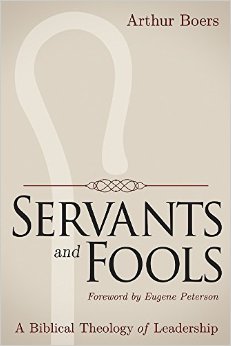 Servants and Fools: A Biblical Theology of Leadership Arthur Boers (Abingdon Press) $19.99 Wow, I was excited to read this as soon as I heard about it – Boers, a Canadian Anglican who spent most of his life as a Mennonite, is a favorite author, and I’ve read most of his many books, on discipleship, spirituality, conflict resolution, The Lord’s Prayer, and that great book where he draws on Albert Borgman’s philosophy of focal practices, called Living Into Focus: Choosing What Matters in an Age of Distraction. I knew this would be hard-hitting, a prophetic critique of how we’ve too often presumed and bought into the reigning assumptions about leadership, strength, power, organization and the rest. Less personal and tender and funny as Many Smith, they would both certain appreciate each other. Thanks be to God that there are courageous authors who are thoughtful and intentional about being Biblically-shaped leaders, and helping us all see what that might entail.
Servants and Fools: A Biblical Theology of Leadership Arthur Boers (Abingdon Press) $19.99 Wow, I was excited to read this as soon as I heard about it – Boers, a Canadian Anglican who spent most of his life as a Mennonite, is a favorite author, and I’ve read most of his many books, on discipleship, spirituality, conflict resolution, The Lord’s Prayer, and that great book where he draws on Albert Borgman’s philosophy of focal practices, called Living Into Focus: Choosing What Matters in an Age of Distraction. I knew this would be hard-hitting, a prophetic critique of how we’ve too often presumed and bought into the reigning assumptions about leadership, strength, power, organization and the rest. Less personal and tender and funny as Many Smith, they would both certain appreciate each other. Thanks be to God that there are courageous authors who are thoughtful and intentional about being Biblically-shaped leaders, and helping us all see what that might entail.
Arthur Boers does what is promised in Peterson’s passionate forward. He draws on a close reading of the Bible and the best of serious thinkers past and present. Who cites authors as interesting (and dangerous!) as Bible-based activists like Dan Berrigan and William Stringfellow, blending them with the likes of Clarence Jordon and Chad Meyers, Walter Brueggeman and Martin Buber, and drawing on other scholars of leadership theory, from Ronald Heifetz to Wes Granberg-Michaelson to Parker Palmer? The footnotes in this are gloriously rich and fascinating, and the Scripture scholars he mentions are particularly interesting. But there are very few modern leadership types cited here. Rather, Fr. Boers does in-depth – dare I say, radical – Bible study, and develops a counter-cultural understanding and set of practices for servant leadership. Foolish, I know. This is one of the best books of the year. As David Gill (himself an Ellul scholar) of Gordon Conwell Seminary’s Center for Workplace, Theology and Business Ethics says, “Servants and Fools is a brilliant and essential contribution to any serious study of leadership: robust, faithful, insightful biblical teaching. I cannot imagine ever teaching another class on leadership without assigning and discussing this book.” Or, listen to Marva Dawn, who writes, “Arthur Boers punctures all pretensions, unveils delightful discoveries, and exhibits perceptive insights. Servants and Fools is the most potent book on Christian leadership.” I dare you to read it – but hold on tight. It will rock your world.
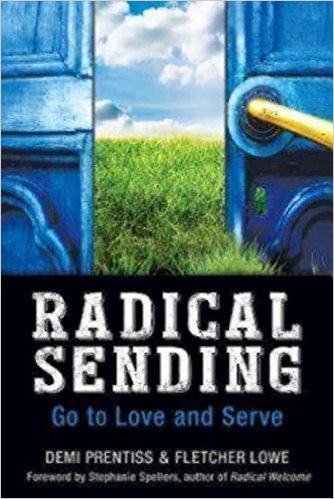 Radical Sending: Go To Love and Serve the Lord Demi Prentiss & Fletcher Love (Morehouse) $18.00 We have hundreds of books about congregational health, about church revitalization, about both the theology of church and the spirituality of local faith communities. Many are excellent, and we enjoy letting church leaders in on the benefits of reading widely in this genre of books about church life. Many, however, seem overlapping, and, although still useful, it is rare to find one that is really offering new insights, new stories, fresh and vital guidance. Radical Sending is such a book, and I’d say there is hardly a book on the market like it.
Radical Sending: Go To Love and Serve the Lord Demi Prentiss & Fletcher Love (Morehouse) $18.00 We have hundreds of books about congregational health, about church revitalization, about both the theology of church and the spirituality of local faith communities. Many are excellent, and we enjoy letting church leaders in on the benefits of reading widely in this genre of books about church life. Many, however, seem overlapping, and, although still useful, it is rare to find one that is really offering new insights, new stories, fresh and vital guidance. Radical Sending is such a book, and I’d say there is hardly a book on the market like it.
The short version (and a longer review would be needed to do it justice, of course) is that this book, written by two mainline Episcopalians, wants to help create congregational cultures that equips congregants to serve God in their ordinary lives, especially in their own work and within their professional careers. Prentiss and Lowe delightfully tell stories of congregations attempting to bridge the “Sunday-Monday” gap, and they draw on diverse insights from Lutherans and Mennonites, from The High Calling blog to the older faith-work movement developed at the Laity Lodge, citing important voices such as Bethlehem Steel executive William Diehl, who was active in these conversations in the 70s and 80s. (Indeed, Bill Diehl spoke at the CCO’s Jubilee conference in the late 70s.)
They seem a bit unaware of how this very topic — congregations orienting themselves around equipping the congregants for workaday mission in the marketplace — is quite in vogue now, especially among younger evangelical church plants and the rising movement around culture making, the popular For the Life of the World DVDs and the like. There are conferences, blogs, books, and networks galore about which these authors seem unfamiliar. (Just think of the telling of the tale by Tom Nelson in his wonderful Work Matters: Connecting Sunday Worship to Monday Work published 5 years ago by Crossway, or the stunningly robust DVD curriculum published by Regent College in Vancouver called ReFrame, or the Patheos Faith and Work channel curated by the director of the college think-tank named Opus: The Art of Work, not to mention the Redeemer Center for Faith and Work in downtown Manhattan where yours truly has held forth on occasion.) Nonetheless, these good authors do know that something is happening within mainline circles in this, too, and they have given us a very useful book about how ordinary congregations can tap into it.
There is a bit of a backstory to the writing of this that is interesting as well. Episcopalians have been doing workshops on serious hospitality — inspired by a book by Stephan Spellers called Radical Welcome — which is all about reaching out, being inclusive, forming a supportive church home for all seekers. It dawned on these authors that as good as this is (Prentiss tells of having Spellers at his own parish), the Book of Common Prayer (and many other liturgical traditions) ends the worship liturgy with the words “Go in peace to love and serve the Lord.” That is, they were struck by the missional vision of being sent, of scattering after gathering. They thought, in a way, their own book about faith lived out in service to the common good in the public areas of modern life, could be a good bookend to Radical Welcome; hence the title Radical Sending. Once transformed by Christ in the community of welcome and spiritual transformation offered by the local congregation, then what? Go to love and serve the Lord, indeed!
Radical Sending is simply written, with lots of the citations and stories one finds in mainline denominational books; in is upbeat but mostly no-nonsense and straight away. John Lewis (Director of St. Benedicts’ Workshop in San Antonio) says it is “a provocative challenge to Christians to re-imagine and re-invigorate the church’s vocation to shape and equip faithful disciples to join God’s mission in their daily lives in the wider world.”
Brian McLaren says,
Pastors, priests, and parishioners: if there’s one book you read this year to strengthen your church, please let this be the book. Radical Sending will remind you why church matters so much in the first place, and it will inspire you to seize the potential that almost everybody is missing. Highly recommended.
SOCIAL CRITICISM AND CULTURAL ENGAGEMENT
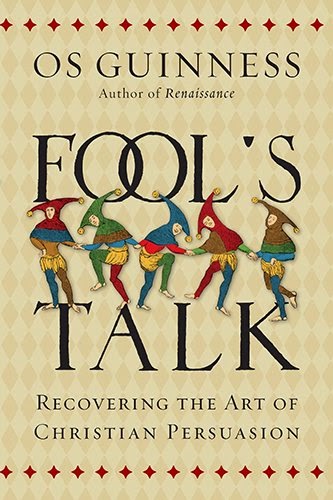 Fools Talk: Recovering the Art of Christian Persuasion (IVP) $22.00 In mid-June, when this book released, I did a very lengthy rumination on it, explaining who Dr. Guinness is, highlighting a few of his many books, and noting why I thought he was the perfect author for this necessary topic. I was thrilled with Fools Talk and was stimulated, provoked, challenged and encouraged by working through it. It was intellectually stimulating because (for among many reasons) Guinness is weaving together the potent insights of three great thinkers who have influenced him: C.S. Lewis, Francis Schaeffer, and Peter Berger. I knew without a doubt that I would name it as one of the very best books of the year.
Fools Talk: Recovering the Art of Christian Persuasion (IVP) $22.00 In mid-June, when this book released, I did a very lengthy rumination on it, explaining who Dr. Guinness is, highlighting a few of his many books, and noting why I thought he was the perfect author for this necessary topic. I was thrilled with Fools Talk and was stimulated, provoked, challenged and encouraged by working through it. It was intellectually stimulating because (for among many reasons) Guinness is weaving together the potent insights of three great thinkers who have influenced him: C.S. Lewis, Francis Schaeffer, and Peter Berger. I knew without a doubt that I would name it as one of the very best books of the year.
Although my BookNotes review was long and flowing, I thought I’d just share a few paragraphs from it, here.
…in the first few chapters, Guinness is again in his critical mode, exposing the significant failures of apologetics in our day. Even in the introduction he offers an incisive exploration of the impact of digital technologies – many of us, almost subliminally, are about self marketing in this age of tweets and selfies – and the doubled-edges of the sword that this is: people are increasingly open and in communication but yet are therefore increasingly wary, weary, even. Who can deny the growing suspicions and cynicism many carry in part due to relentless 24/7 advertising and ubiquitous propaganda? And who can deny that there is much cultural anger against the public face of Christianity, much self-inflicted by the harsher corners of the Christian community? We all know that there are those who specialize in argument and so-called apologetics but whose loud polemics are simply an embarrassment in contrast to the beauty and grace and richness of the gospel itself.
…to underscore the point of this book which is a guide to learning how to persuade, not just scold or proclaim or badger or win arguments about religion, Guinness in this chapter explores some of the parables of Jesus and how they were so remarkably able to unsettle and expose and invite the hearers to repentance and a realization of grace. He worries that in all our efforts to win debates (at least those of us who enter into religious conversations, having perhaps read books on how to argue well) we sometimes make a winning argument, taking the battle, so to speak, but losing the war, as it were. The goal of our conversations, he repeats, is not to win debates or look good in our sophisticated arguments, but to touch lives, inviting people to faith through grace. We want people to care about truth so they might come to trust the God who loves them so. He writes,
The false art of always being right is a deadly trap for Christian advocates. Conversely, it is a high privilege to use the art of persuasion to bring people to where they know in their heart of hearts that they are wrong, that God’s offer of grace is free. Little wonder that such a privilege and such an art can only be pursued with humility and with an overwhelming sense of God’s grace to us, too. Again, the art of truth leads back to the incarnation, the cross and the Holy Spirit, and the life of faith continues as it began.
This reminder is the theme of the beautiful Epilogue, called “The Way of the Open Hand.” He explains that this symbol points us to
the positive side of apologetics that uses the highest strengths of human creativity in defense of truth. Expressing the love and compassion of Jesus, and using eloquence, creativity, imagination, humor and irony, open-hand apologetics has the task of helping pry open hearts and minds that, for a thousand reasons, have long grown resistant to God’s great grace…
You will notice, in this good quote from the last page, that Os mentions the imagination, humor and irony. These are actually explored in great detail – rather humorlessly, I might note – as Guinness teaches us from Peter Berger, who wrote (in the 1960s) profound work on what we might call the sociology and spirituality of humor. The chapter called “spring loaded dynamics” is perhaps the most challenging in the book and yet may be the most important. Here, Guinness’s debt to Berger and Schaeffer and Lewis are evident, and it is nothing short of brilliant. Yet, dense and brilliant as it is, it must be read in light of a previous chapter – one that has Berger’s fingerprints all over it – called “Triggering the Signals.”
You may have heard the phrase (coined by Berger, I gather) “signals of transcendence.” Lewis himself explained how this reality was key in his own conversion (“surprised by joy”) and Os develops it clearly.
Shifting from Lewis to Peter Berger, he writes,
Berger’s rich discussion of other signals of transcendence are a goldmine for the Christian advocate. It covers such typical human experiences as hope, play, humor, order, and judgment. His discussion is fresh and invigorating, but we should see it as a brilliant rediscovery rather than as radically new, for this was a powerful theme in the early church. In the third century, for example, Gregory of Nyssa built on the Greek notion of desire and developed it in a biblical direction.
Guinness is fantastic here, swiftly reminding us of Gregory’s profound teaching, shifting to Augustine, noting that “the same understanding of desire blazes in St Augustine, fanned by his own experience of passionately searching for God” and then on to, for instance, the telling of the story of Le Chambon (the famous town in France that hid Jews from Nazism’s reach) and how author Philip Hallie (Lest Innocent Blood Be Shed) was drawn to “how goodness happened there.”
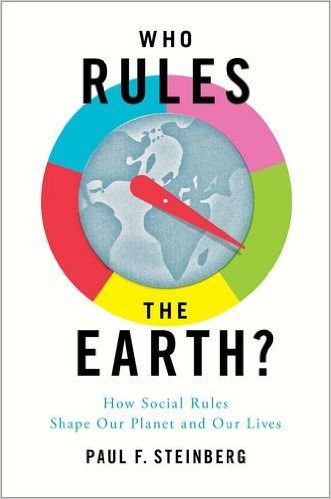 Who Rules the Earth: How Social Rules Shape Our Planet & Our Lives Paul Steinberg (Oxford University Press) $25.99 As I hope you know, we stock a large number of books about the interface of faith and environmental studies, what we’ve come to call creation-care. Evangelicals, especially, have written excellent books about eco-theology, about our call to steward well the goodness of the creation, and how lively faith can propel us not just to more simple, sustainable lifestyles, but to bigger matters of how we live with the “groaning creation” (Romans 8.) We carry books that are not overtly Christian, too, studies of the debates about climate change, handbooks for green living, and more. This remarkable book, though, isn’t exactly about the science or policy of global warming, but it does offer exceedingly important insights for anyone interested in the big questions about what has to happen for a more sustainable global economy in our 21st century. It is about the “hidden architecture of rules” and how the best social science research can show us how institutions can and should change if we want health for the common good.
Who Rules the Earth: How Social Rules Shape Our Planet & Our Lives Paul Steinberg (Oxford University Press) $25.99 As I hope you know, we stock a large number of books about the interface of faith and environmental studies, what we’ve come to call creation-care. Evangelicals, especially, have written excellent books about eco-theology, about our call to steward well the goodness of the creation, and how lively faith can propel us not just to more simple, sustainable lifestyles, but to bigger matters of how we live with the “groaning creation” (Romans 8.) We carry books that are not overtly Christian, too, studies of the debates about climate change, handbooks for green living, and more. This remarkable book, though, isn’t exactly about the science or policy of global warming, but it does offer exceedingly important insights for anyone interested in the big questions about what has to happen for a more sustainable global economy in our 21st century. It is about the “hidden architecture of rules” and how the best social science research can show us how institutions can and should change if we want health for the common good.
Steinberg, a Professor of Sustainability and Society and also of Political Science, directs the Social Rules Project, and he writes in a pleasant and interesting way (a happy surprise for an academic book) and walks us through example after example of how things tend to work; that is, how assumptions about how things work are encoded in cultures, and how “rules” that preceded laws shape and inform how we imagine what is plausible. Trying to change policy? Trying to impact the culture? Between the grand religious conversations and visionary efforts to shift social imaginaries (on one hand) and concrete legislative debates about specific policy (on the other) are these “social rules” which are informed by what I might call worldviews. Who rules the Earth? Not the philosophers or the politicians, not the artists or the businessmen – standard answers, always – but those sociological/religious-like stories that have given rise to customs, habits, patterns of power, and social realities, social architecture. Who Rules the Earth is enlightening, helpful, and an important step towards actually making headway on more stewardly reforms for the sake of caring well for the world God loves. It is important, and, thankfully, very well written.
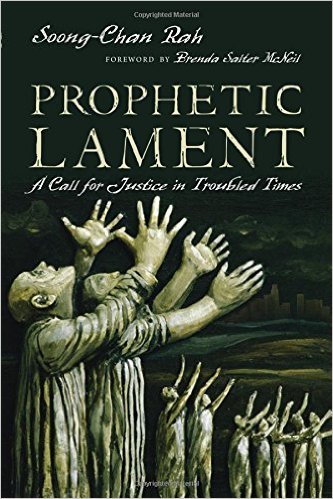 Prophetic Lament: A Call for Justice in a Troubled World Soong-Chah
Prophetic Lament: A Call for Justice in a Troubled World Soong-Chah
Rah (IVP) $17.00 I wrote about this passionate, important book before
and in revisiting it again I am struck again by how vital it is, and how
interesting, and how, finally, empowering. (And do I have to say, so needed in these hard days?)
There have been several
books in the last decade discovering and exploring lament, and it isn’t uncommon to
hear, now, that to offer up lament to God is a firm part of the
Jewish-Christian liturgical practice. We are authorized by the Bible to
complain to God, to cry out, to give voice to our pains, doubts, and
frustrations with the ways of the world. One of the under-developed
Biblical resources for helping us understand and practice this
under-developed Christian virtue is the book of Lamentations. (And for
understandable reasons; it is not easy or inspiring.)
Rah unpacks the book of
Lamentations in a way that is not quite a commentary, but plumbs its
narrative depth and overt teaching to help us learn to lament injustice
and sorrow in our own day. More than an exploration of theodicy and
more than a screed about social injustice, Prophetic Lament is a
Biblically-grounded study and a spiritually-wise guide to how to express
and deal with the sad stuff of our lives and of our broken culture and
dysfunctional society. Thanks be to God for this brave and useful
book. May its hard truths be widely read and discussed, increasingly
finding their way into our common vocabulary and our regular worship and
spiritual practices.
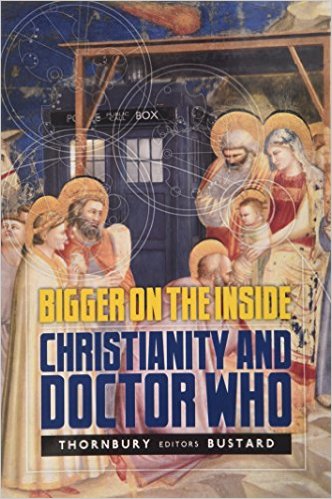 Bigger on the Inside: Christianity and Doctor Who edited
Bigger on the Inside: Christianity and Doctor Who edited
by Ned Bustard & Greg Thornbury (Square Halo Books) $17.99 Well,
why not? I think that nearly any time Square Halo Books releases a new
volume it is up for consideration for a Best Book of the Year award;
they do a fantastic job designing and creating books that are unique,
interesting, and offering mature theological insight about the world of
the arts. I wrote a bit about this (even though I’m not much of a
Whovian) and have come to realize more and more that this book is loved
within a niche market, and is esteemed: the essays are very good. (And
Dr. Greg Alan Thornbury? My, my, one of the more important young
theologians writing these days, in between his work as President of
Kings College in New York City.) There are geeky sci-fi fans
everywhere, but these smart essays
are exceptionally well suited to feisty young adults, those who like the
famous show, or just those who want to see solid theological
reflections growing out of an iconic piece of popular culture. CCO’s own
Ivan Strong Moore has a blurb on the inside of this great paperback.
When we are out selling this at events, people do little happy dances
when they see it, exclaiming all manner of stuff, some of which I don’t
even understand. One person once said she wished I had a “My Other
Vehicle is a Tardus” bumper
sticker to go with the book. So, yeah, there’s that. It deserves to be
on this year’s end list of highlights.
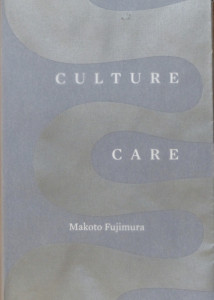 Culture Care Makoto Fujimura (Fujimura Institute) $25.00 I trust you know our friend Mako Fujimura, one of the leading abstract painters working in the serious American art world. A Japanese-American (who graduated from Bucknell University here in central Pennsylvania) he has kept alive and developed a painstakingly caring, Japanese form of painting (using expensive, glimmering crushed minerals.) He has become an tireless public intellectual, writing, lecturing, hosting exhibits, forming organizations such as the renowned International Arts Movement. (And his recent appointment as Director of the excellent Brehm Center at Fuller Theological Seminary in Pasadena, California.) As a thoughtful evangelical Christian, Mako has articulated well a deeply Biblical vision of the arts, and a faith-based perspective on art criticism and the practices of the faithful aesthetic life. We carry most of his many books, and was honored to be one of the very first bookstore to stock this handsome, handcrafted paperback (with a very creative onion-skin paper dust jacket) produced recently by Fujimura’s own organization in New Jersey.
Culture Care Makoto Fujimura (Fujimura Institute) $25.00 I trust you know our friend Mako Fujimura, one of the leading abstract painters working in the serious American art world. A Japanese-American (who graduated from Bucknell University here in central Pennsylvania) he has kept alive and developed a painstakingly caring, Japanese form of painting (using expensive, glimmering crushed minerals.) He has become an tireless public intellectual, writing, lecturing, hosting exhibits, forming organizations such as the renowned International Arts Movement. (And his recent appointment as Director of the excellent Brehm Center at Fuller Theological Seminary in Pasadena, California.) As a thoughtful evangelical Christian, Mako has articulated well a deeply Biblical vision of the arts, and a faith-based perspective on art criticism and the practices of the faithful aesthetic life. We carry most of his many books, and was honored to be one of the very first bookstore to stock this handsome, handcrafted paperback (with a very creative onion-skin paper dust jacket) produced recently by Fujimura’s own organization in New Jersey.
Any time Mr. Fujimura publishes, his books are worth having. His written words are always, always thoughtful, exceptional, even, drawing deep connections and developing intellectual themes as only a quiet and learned thinker can do; his lovely early work of reflections (many done during and right after the horror of 9-11 exploring the role of the arts in such a time) called Refractions is still a personal favorite! This new book, Culture Care, continues to showcase his calling to stimulate conversation — poetic, beautiful, wise, collaborative conversations, about how to sustain and bring renewal to a culture in crisis. How to care for the social architecture, so to speak, that can sustain artists and culture-makers, so that they can, in term, enhance the sustainability and health of society. A key word he uses in the book is generative, and he invites here us to be responsible, productive in fruitful ways that bring flourishing and healing — what his friend Calvin Seerveld calls “rainbows for the fallen world.”
Here is what Mako has explained about this small, poignant manifesto, generative itself as it is:
“This is a book for artists, but artists come in many forms. Anyone with a
calling to create–from visual artists, musicians, writers, and actors,
to entrepreneurs, pastors, and business professionals–will resonate with
its message. This book is for anyone who feels the cultural divide,
especially those with a desire or an artistic gift to reach across
boundaries with understanding, reconciliation, and healing. It is a book
for anyone with a passion for the arts, for supporters of the arts, and
for “creative catalysts” who understand how much the culture we all
share affects human thriving today and shapes the generations to come.”
We are glad to be a small partner in distributing his work, happy to not only celebrate his generative efforts, in paint and in words, but to honor them the best we can. We invite you to buy his book, to read and discuss and embody it’s mature, hopeful vision. Yes!
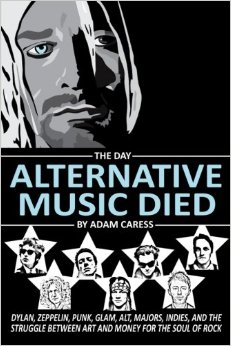 The Day Alternative Music Died: Dylan, Zeppelin, Punk, Glam, Alt, Majors, Indies, and the Struggle Between Art and Money for the Soul of Rock Adam Caress (New Troy Books) $16.99 Speaking of rock criticism, and the history of writing about the popular arts in intelligent ways, this book was truly one of the most thrilling I’ve read all year, and one I so enjoyed writing about at great length. You should read my reflections on it, but you should at least know this much: the subtitle says much: it is about the swing back and forth between art and commerce. Indie music, decade by decade, has meant different things to different rock music lovers, but has typically been created by the co-opting of aesthetic concerns, big labels mimicking edgy, fresh artists, and allowing commercialization to rule. Alas, another sort of indie scene develops, until it, in time, is tamed and popularized and finally cop-opted by business concerns of record labels and sales and “the industry” (from Rolling Stone to the Grammy’s to MTV.) Nobody escapes the astute observations and critical evaluations of Caress, a fine Christian scholar and passionate (and incredibly knowledgably) rock music fan. A stellar blurb on the back by the exquisite writer and media critic Sven Birkerts further illustrates that this is an important book, one that should be read and understood by anyone interested in the popular arts and the world of contemporary music.
The Day Alternative Music Died: Dylan, Zeppelin, Punk, Glam, Alt, Majors, Indies, and the Struggle Between Art and Money for the Soul of Rock Adam Caress (New Troy Books) $16.99 Speaking of rock criticism, and the history of writing about the popular arts in intelligent ways, this book was truly one of the most thrilling I’ve read all year, and one I so enjoyed writing about at great length. You should read my reflections on it, but you should at least know this much: the subtitle says much: it is about the swing back and forth between art and commerce. Indie music, decade by decade, has meant different things to different rock music lovers, but has typically been created by the co-opting of aesthetic concerns, big labels mimicking edgy, fresh artists, and allowing commercialization to rule. Alas, another sort of indie scene develops, until it, in time, is tamed and popularized and finally cop-opted by business concerns of record labels and sales and “the industry” (from Rolling Stone to the Grammy’s to MTV.) Nobody escapes the astute observations and critical evaluations of Caress, a fine Christian scholar and passionate (and incredibly knowledgably) rock music fan. A stellar blurb on the back by the exquisite writer and media critic Sven Birkerts further illustrates that this is an important book, one that should be read and understood by anyone interested in the popular arts and the world of contemporary music.
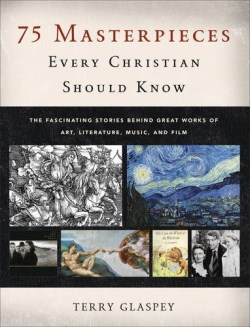 75 Masterpieces Every Christian Should Know: The Fascinating Stories Behind Great Works of Art, Literature, Music and Film Terry Glaspey (Baker Books) $29.99 What a great, lovely, interesting, and inspiring book this is — it is almost like a coffee table book, but the content is so inspiring and educational and important, it deserves to be taken more seriously than an attractive gift book for art lovers, although it is that. We surely must honor it with a very honorable mention.
75 Masterpieces Every Christian Should Know: The Fascinating Stories Behind Great Works of Art, Literature, Music and Film Terry Glaspey (Baker Books) $29.99 What a great, lovely, interesting, and inspiring book this is — it is almost like a coffee table book, but the content is so inspiring and educational and important, it deserves to be taken more seriously than an attractive gift book for art lovers, although it is that. We surely must honor it with a very honorable mention.
Here’s what I said in my review last fall:
If you have any curiosity at all about art, literature, film, or music and the true stories behind the great masterpieces of the world, this informative and beautiful book will provide hours and hours of wonderful reading. It is going to be a fabulous gift for gift-giving this holiday season, but you should buy it now so you can read it before gifting it this December. I’m not exaggerating – it is a marvelous idea, and wonderfully written. It is not tedious or overly complex, but it offers enough serious background and interpretation of the art and the artist to appeal to a very wide variety of reader. Hooray!
Some of the greatest artists of all time have taken their inspiration from their Christian faith and exploring how so many great masterworks emerged from artists of deep faith and Christian conviction is the starting point for these delightfully informative explorations.
Mr. Glaspey has written several books on faith formation, reading the Bible, a short biography of C.S. Lewis (Not at Tame Lion) and a book on reading great classics, and he works in the publishing industry. In our own work we have crossed paths a time or two, and I’ve read his other books; I respect him a lot as I say in my own blurb that appears in the book:
Terry Glaspey seems to know a bit about everything and a lot about the things that matter most. I would read anything he wrote, but this unique volume surpassed my great expectations. If you enjoy pondering the connections between faith, art, culture, and daily discipleship, you will adore this. 75 Masterpieces Every Christian Should Know is itself a masterpiece. Who else can tell you about a painting by Caravaggio, a novel by Jane Austen, and live album by Johnny Cash all in the same book? Thanks be to God for Glaspey’s clear faith, informed knowledge, and winsome writing that can help us glean spiritual insight in cultural projects from Dante to Dylan, from Rembrandt to the Tree of Life.
I was hooked on this idea from the minute I heard of it, knowing it was a great idea, and that Glaspey could pull it off. But I was really hooked when I realized he was including contemporary rock albums such as a trilogy by Larry Norman, Bruce Cockburn’s Dancing in the Dragon Jaws, and The Joshua Tree by U2. And – yay! — contemporary novels such as Frederick Buechner’s Godric and the short stories of Flannery O’Connor. The most recent pieces described are from 2011. I hope you know the painter and the filmmaker described in those final pages!
75 Masterpieces Every Christian Should Know starts with early Christian art in the Roman catacombs and then tells us of the amazing story of The Book of Kells and moves on through the Middle Ages (including some stunning cathedrals that are beautifully described) and the obvious selections of that productive era as it lead towards the Renaissance (The Divine Comedy, Rublev’s Holy Trinity icon, van Eyck, Durer, Bosch, Michelangelo’s famous work on the ceiling of the Sistine Chapel and so many more.) Interestingly, he includes a little song from the early 1500’s “A Mighty Fortress Is our God.”
Several of these are pieces I didn’t know at all, or well, and a few are not my favorites. (He gives some advice about this in a good introduction, by the way, and invites us to work a bit at this since the artists themselves, of course, worked very hard. His good guidance and curation are helpful for those of us not well schooled in art history.) Even if you don’t know them well, these pictures and descriptions are mostly all very moving and, of course, are truly important works.
Glaspey’s descriptions are very, very helpful and you will be glad to be inspired by it all.
The listing is arranged chronologically, so one gets to read about Donne, Herbert, the famous St Teresa in Ecstasy sculpture by Bernini next to Rembrandt’s famous Return of the Prodigal Son. Or, much later, a review of Death Comes for the Archbishop (Willa Cather), a 1928 film about Joan of Arc by Theodore Dreyer, and Head of Christ by George Rouault in order. Fascinating.
There is found here exquisite but teacherly descriptions of stained glass, classical music, poetry, a few plays, films and jazz albums. To read 70’s-era pieces such as a European symphony Henryk Gorecki, a folkie album by Canadian Bruce Cockburn, a novel by U.S. Southerner Walker Percy next to a Japanese painting of The Last Supper by Sadao Watanabe (1981) was remarkably moving for me. 75 Masterpieces Every Christian Should Know really is a very great book. Kudos.
BEST NOVEL OF 2015
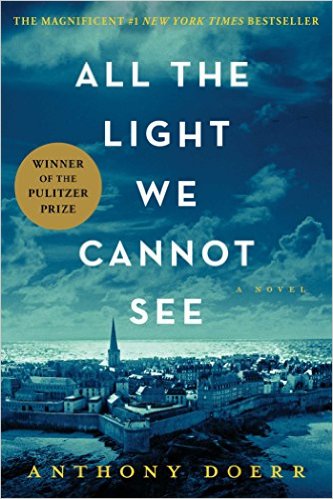 All the Light We Cannot See Anthony Doerr (Scribner) $27.00
All the Light We Cannot See Anthony Doerr (Scribner) $27.00
Well, I’ve read and enjoyed quite a number of great novels this year – some previously published and famous, some self-published and not well known. In the former category I was engulfed in the fiction worlds and people of three by Wally Lamb, such as The Hour I First Believed. And I finally read Marilyn Robinson’s unforgettable, complex first novel, Homemaking – whew.
In the later category, I enjoyed the philosophical adventure story Bridging the Abyss by my good friend Dick Cleary. (I reviewed it last fall at BookNotes.) I was very deeply involved for days and days with the Civil War era story about race and families and romance and truth, A Soldier’s Heart by a York area writer, Michele McKnight Baker. And I have to say I loved essayist and memoirist Michael Perry’s comic first novel, released by HarperOne, The Jesus Cow. Yes, you read that right.
All the Light We Cannot See by the esteemed Anthony Doerr is, doubtlessly, the book that most stuck with me this year, the most beautiful, striking, interesting, moving, and literate bit of fiction I’ve read in quite a while. Many have called it ambitious, and it certainly is that. All the Light We Cannot See certainly deserves the Pulitzer Prize that it won, and I trust you have read reviews of it, or have discussed it with friends, and the beauty and horror that inevitably overtakes the two young protagonists, in Germany and in France. We are pleased to sell it, despite some graphic scenes (it is set during the time of Nazi Germany) and some harsh language. I suppose it maybe isn’t for everyone, but it is a truly great book, enduring and luminous and very significant. It surely deserves all the wide acclaim it has gotten, and we want to ad our little voice to the choir. It surely is a Best Book of 2015.
I am sorry this went on a bit longer than I had expected. True fans like overtime games, I suppose, but after a while, well, one needs a break. Take your notes of what you want to order, and stretch those legs. Get some fresh air. Talk to your loved ones. But get ready to come back soon. Hearts & Minds Best Books of 2015 will be back, hopefully tomorrow, with our second and final installment.
Thanks for caring about good books, about our selections, and about supporting independent bookselling. We are so very grateful.
BookNotes

SPECIALDISCOUNTANY ITEM MENTIONED
20% off
order heretakes you to the secure Hearts & Minds order form pagejust tell us what you want
inquire here
if you have questions or need more information
just ask us what you want to know
Hearts & Minds 234 East Main Street Dallastown, PA 17313 717-246-3333
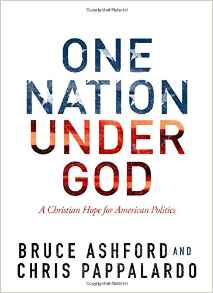 One Nation Under God: A Christian Hope for American Politics Bruce Ashford and Christ Pappalardo (B&H Academic) $14.99 Okay, I’ll admit two things: I am worried these days about those who too easily use this phrase, One Nation Under God. Americana wholesome as it is, it has been abused by civil religionists and hijacked by the too often unbiblical Christian right. I have suspicions of anyone thinking this should be a lead phrase on a book. Secondly, if I look through the footnotes in a book on faithful politics and don’t see it citing Jim Skillen (for instance, his must-read The Good of Politics or Ron Sider’s excellent Just Politics or the brilliant Political Visions and Illusions by David Koyzis) I wonder what books from what tradition has informed the writer. There’s so much bad stuff out there.
One Nation Under God: A Christian Hope for American Politics Bruce Ashford and Christ Pappalardo (B&H Academic) $14.99 Okay, I’ll admit two things: I am worried these days about those who too easily use this phrase, One Nation Under God. Americana wholesome as it is, it has been abused by civil religionists and hijacked by the too often unbiblical Christian right. I have suspicions of anyone thinking this should be a lead phrase on a book. Secondly, if I look through the footnotes in a book on faithful politics and don’t see it citing Jim Skillen (for instance, his must-read The Good of Politics or Ron Sider’s excellent Just Politics or the brilliant Political Visions and Illusions by David Koyzis) I wonder what books from what tradition has informed the writer. There’s so much bad stuff out there.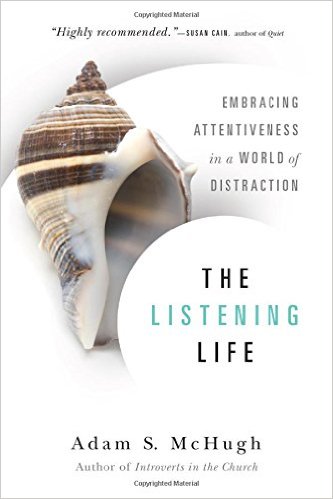 The Listening Life: Embracing Attentiveness in a World of Distraction Adam S. McHugh (IVP) $16.00 Just reading the table of contents of this splendid, beautiful book makes one feel invited into it; who doesn’t want to be a better listener? And who doesn’t want to — in the words of Frederick Buechner — “listen to your life”? This book is a bit contemplative, an invitation to slow down, a guide to attentiveness. What a gift!
The Listening Life: Embracing Attentiveness in a World of Distraction Adam S. McHugh (IVP) $16.00 Just reading the table of contents of this splendid, beautiful book makes one feel invited into it; who doesn’t want to be a better listener? And who doesn’t want to — in the words of Frederick Buechner — “listen to your life”? This book is a bit contemplative, an invitation to slow down, a guide to attentiveness. What a gift!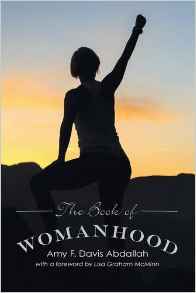 The Book of Womanhood Amy F. David Abdallah (Cascade) $25.00 I don’t know what the publisher was thinking with this blackened out shadow of a woman for the cover, but the cheap look shouldn’t dissuade you from checking out this fine, fine book. The author (a beloved professor of theology and Bible at Nyack College) is passionate about life, about guiding others into taking up their life’s journey with gusto, and with helping women students, especially, discover their own best identity.
The Book of Womanhood Amy F. David Abdallah (Cascade) $25.00 I don’t know what the publisher was thinking with this blackened out shadow of a woman for the cover, but the cheap look shouldn’t dissuade you from checking out this fine, fine book. The author (a beloved professor of theology and Bible at Nyack College) is passionate about life, about guiding others into taking up their life’s journey with gusto, and with helping women students, especially, discover their own best identity. 
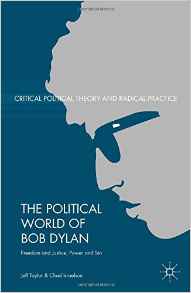 The Political World of Bob Dylan: Freedom and Justice, Power and Sin Jeff Taylor & Chad Israelson (Palgrave Macmillan) $105.00 Okay, I was going to be snarky and award this some caustic shout out for being obscenely over-priced. I protest the terrible overpricing of academic books and can’t believe that some publishers think they should get away with this nonsense. That said, get thee to a library (although few libraries these days can afford these costly volumes) or buckle down and save some dough so you can order this from us — it is nothing short of spectacular. It is a seriously Christian, profoundly insightful study of Dylan, seen by way of thinking about a non-aligned, counter-cultural bit of politics shaped by God’s Kingdom.
The Political World of Bob Dylan: Freedom and Justice, Power and Sin Jeff Taylor & Chad Israelson (Palgrave Macmillan) $105.00 Okay, I was going to be snarky and award this some caustic shout out for being obscenely over-priced. I protest the terrible overpricing of academic books and can’t believe that some publishers think they should get away with this nonsense. That said, get thee to a library (although few libraries these days can afford these costly volumes) or buckle down and save some dough so you can order this from us — it is nothing short of spectacular. It is a seriously Christian, profoundly insightful study of Dylan, seen by way of thinking about a non-aligned, counter-cultural bit of politics shaped by God’s Kingdom.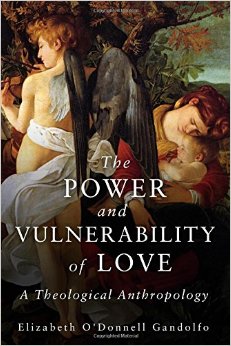 The Power and Vulnerability of Love: A Theological Anthropology Elizabeth O’Donnell Gandolfo (Fortress) $39.00 I’m not going to lie — we have so many books on a Christian view of the human person that I just wasn’t interested in another academic anthropology. But then I read the fascinating review in The Christian Century by one of my favorite book reviewers, Lauren Winner. In that review, Winner caught my attention with her opening line, “If Jurgen Moltmann and Brene Brown collaborated on a book, what might emerge is something like The Power of Vulnerability of Love.“
The Power and Vulnerability of Love: A Theological Anthropology Elizabeth O’Donnell Gandolfo (Fortress) $39.00 I’m not going to lie — we have so many books on a Christian view of the human person that I just wasn’t interested in another academic anthropology. But then I read the fascinating review in The Christian Century by one of my favorite book reviewers, Lauren Winner. In that review, Winner caught my attention with her opening line, “If Jurgen Moltmann and Brene Brown collaborated on a book, what might emerge is something like The Power of Vulnerability of Love.“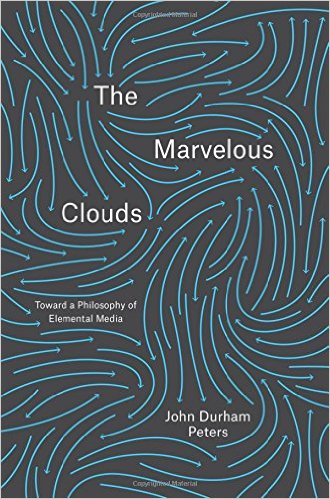 The Marvelous Clouds: Toward a Philosophy of Elemental Media John Durham Peters (University of Chicago Press) $30.00 Oh how I wanted to list this somehow as one of the most significant books of last year. It has been touted as “highly original” and “more than foundational.” One reviewer says it is “dazzlingly intelligent.” I just hadn’t worked with it at all — it is a well-made, sturdy hardback from one of the world’s most prestigious publishing houses, but — as these things go — I have no idea what the authors views are, his assumptions and values, his backstory or worldview. It sure seems so very interesting — I was immediately drawn to the wordplay of the title. I’m glad for anyone who find meaning in nature, and relates human culture to the realities of God’s good world, whether they call it that or not.
The Marvelous Clouds: Toward a Philosophy of Elemental Media John Durham Peters (University of Chicago Press) $30.00 Oh how I wanted to list this somehow as one of the most significant books of last year. It has been touted as “highly original” and “more than foundational.” One reviewer says it is “dazzlingly intelligent.” I just hadn’t worked with it at all — it is a well-made, sturdy hardback from one of the world’s most prestigious publishing houses, but — as these things go — I have no idea what the authors views are, his assumptions and values, his backstory or worldview. It sure seems so very interesting — I was immediately drawn to the wordplay of the title. I’m glad for anyone who find meaning in nature, and relates human culture to the realities of God’s good world, whether they call it that or not.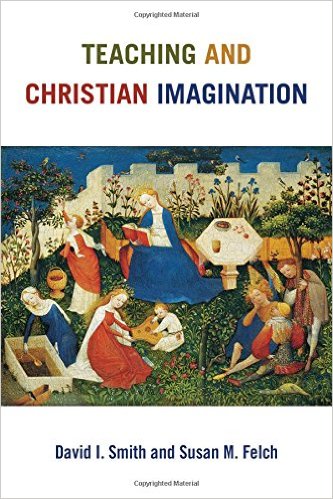 Teaching and Christian Imagination edited by David I. Smith and Susan M. Felch (Eerdmans) $22.00 This book came in December but it is dated 2016. I think it was the first 2016 release we got in our store, so our hats are off to Eerdmans and these fine scholars at Calvin College. Smith is the director of the Kuyers Institute for Christian Teaching and Learning (and the director of the graduate program in education at Calvin) and Felch is the director of the Calvin Center for Christian Scholarship which has offered the world some very good books over the last decades. She is also a professor of English and has written some lovely works herself.
Teaching and Christian Imagination edited by David I. Smith and Susan M. Felch (Eerdmans) $22.00 This book came in December but it is dated 2016. I think it was the first 2016 release we got in our store, so our hats are off to Eerdmans and these fine scholars at Calvin College. Smith is the director of the Kuyers Institute for Christian Teaching and Learning (and the director of the graduate program in education at Calvin) and Felch is the director of the Calvin Center for Christian Scholarship which has offered the world some very good books over the last decades. She is also a professor of English and has written some lovely works herself.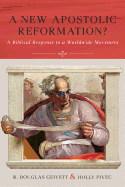 A New Apostolic Reformation? A Biblical Response to a Worldwide Movement R. Douglas Geivett & Holly Pivec (Weaver Book Company) $19.99 I wasn’t sure if many of our friends or followers would care about this, but it is so very interesting, and the authors so respected — both are involved at the Talbot School of Theology at Biola — that we wanted it to be known, and let you know that we stock it. Even if you’ve never heard of this NAR movement of the last decade or so, it’s good to know about what’s going on in certain wings of the Body of Christ.(Geivett, by the way, wrote the fascinating IVP book called Faith, Film, and Philosophy which explored worldviews and philosophical topics in contemporary film, so is adept at discerning what’s going on out there.) This recent book, as Dr. James Spiegel (a philosophy and religion prof at Taylor University) says, “is an important book, a one-stop shop for an explanation and biblical assessment of the so-called New Apostolic Reformation.”
A New Apostolic Reformation? A Biblical Response to a Worldwide Movement R. Douglas Geivett & Holly Pivec (Weaver Book Company) $19.99 I wasn’t sure if many of our friends or followers would care about this, but it is so very interesting, and the authors so respected — both are involved at the Talbot School of Theology at Biola — that we wanted it to be known, and let you know that we stock it. Even if you’ve never heard of this NAR movement of the last decade or so, it’s good to know about what’s going on in certain wings of the Body of Christ.(Geivett, by the way, wrote the fascinating IVP book called Faith, Film, and Philosophy which explored worldviews and philosophical topics in contemporary film, so is adept at discerning what’s going on out there.) This recent book, as Dr. James Spiegel (a philosophy and religion prof at Taylor University) says, “is an important book, a one-stop shop for an explanation and biblical assessment of the so-called New Apostolic Reformation.”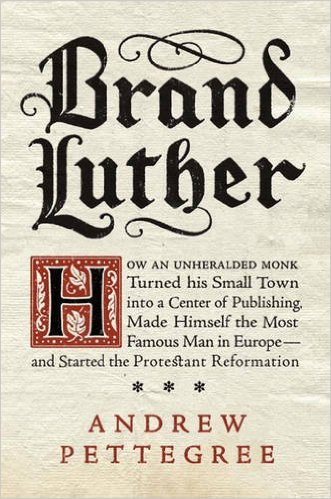 Brand Luther Andrew Pettegree (Penguin Press) $29.95 This fabulous looking, hefty hardback — the embossed printing gives you a feel that it was done on an old printing press — has gotten some great reviews since it came out late this fall. I like the big subtitle on the cover: How an Unheralded Monk Turned His Small Town into a Center of Publishing, Made Himself the Most Famous man in Europe — and Started the Protestant Reformation.
Brand Luther Andrew Pettegree (Penguin Press) $29.95 This fabulous looking, hefty hardback — the embossed printing gives you a feel that it was done on an old printing press — has gotten some great reviews since it came out late this fall. I like the big subtitle on the cover: How an Unheralded Monk Turned His Small Town into a Center of Publishing, Made Himself the Most Famous man in Europe — and Started the Protestant Reformation.
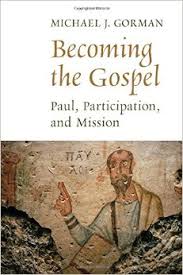 Becoming the Gospel: Paul, Participation, and Mission Michael Gorman (Eerdmans) $28.00 I do not need to say much about this recent release in the “Gospel and our Culture” series, as I’ve written about it a time or two before. I am delighted to note that Mike is a friend and customer, a supporter of our messy little shop here in Dallastown, and that he is as kind and personal and interesting in talking with us as he is when he is engaging in heady conversations with pals of his like Tom Wright or Richard Hays. Mike’s response to Fleming Rutledge’s serious presentation about her (Hearts & Minds Book of the Year award winner) The Crucifixion of Christ in December (at Saint Mary’s Ecumenical Institute where he teaches) drew pleasantly and insightfully on his own body of work, including a trilogy of academic works on Paul cap-stoned by this recent 2015 release. One doesn’t have to read Professor Gorman’s Cruciformity or Inhabiting the Cruciform God to appreciate Becoming the Gospel as it stands alone quite nicely. But there is a movement and trajectory to his work, and it moves us, to use the words he so diligently unpacks, to a formation that is participatory and missional. Whole life discipleship? Servant leadership? Kingdom living? Missional church? Walking the Jesus Way? All of these contemporary buzz words and phrases bring together the death of Christ, executed for our sake by the powers and the victory of the in-breaking reign of God. This kind of Biblical scholarship can surely fund a certain sort of thick, relevant, costly discipleship. Such a way of living out our faith can most fully be embraced as we deepen our understanding of what Paul proclaimed and taught about Jesus the Christ. This book, carefully argued and detailed as it, is as scholarly books are, will help us, I am sure of it. One of the best books of Biblical scholarship this year!
Becoming the Gospel: Paul, Participation, and Mission Michael Gorman (Eerdmans) $28.00 I do not need to say much about this recent release in the “Gospel and our Culture” series, as I’ve written about it a time or two before. I am delighted to note that Mike is a friend and customer, a supporter of our messy little shop here in Dallastown, and that he is as kind and personal and interesting in talking with us as he is when he is engaging in heady conversations with pals of his like Tom Wright or Richard Hays. Mike’s response to Fleming Rutledge’s serious presentation about her (Hearts & Minds Book of the Year award winner) The Crucifixion of Christ in December (at Saint Mary’s Ecumenical Institute where he teaches) drew pleasantly and insightfully on his own body of work, including a trilogy of academic works on Paul cap-stoned by this recent 2015 release. One doesn’t have to read Professor Gorman’s Cruciformity or Inhabiting the Cruciform God to appreciate Becoming the Gospel as it stands alone quite nicely. But there is a movement and trajectory to his work, and it moves us, to use the words he so diligently unpacks, to a formation that is participatory and missional. Whole life discipleship? Servant leadership? Kingdom living? Missional church? Walking the Jesus Way? All of these contemporary buzz words and phrases bring together the death of Christ, executed for our sake by the powers and the victory of the in-breaking reign of God. This kind of Biblical scholarship can surely fund a certain sort of thick, relevant, costly discipleship. Such a way of living out our faith can most fully be embraced as we deepen our understanding of what Paul proclaimed and taught about Jesus the Christ. This book, carefully argued and detailed as it, is as scholarly books are, will help us, I am sure of it. One of the best books of Biblical scholarship this year!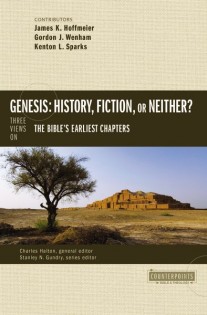 Genesis: History, Fiction, or Neither? Three Views of the Bible’s Earliest Chapters edited by Charles Halton, with James K. Hoffmeier, Gordon J. Wenham, and Kenton L. Sparks (Zondervan) $16.99 I love these point/counterpoint books, of which there are many,and some are amazingly complex (a brand new one in 2016 is about faith and politics, with five differing views!) This one only has three, and each of the three authors respond to the others, making this a bit more manageable and useful. In a nutshell, the three authors contend that (a) the earliest stories of Genesis are actually history, (b) some sort of proto-history, or (c) actually just storytelling of an ancient sort that was not what we today think of as actually history. The project was assigned quite succinctly: each author was asked to explain what sort of writing they think early Genesis represents, and why they hold to that understanding. Secondly, there were asked to ruminate on how that interpretive approach effects how they read the Scriptures and how that effects other portions of the Bible, if it does. And thirdly, they were given three distinct texts and were asked to explain them, the story of the Nephilim (Genesis 6: 1-4), Noah and the Ark (Genesis 6:9 – 29) and the Tower of Babel (Genesis 11: 1-9.) This exercise allows each author to show forth how their particular view informs how they handle specific passages and stories. As you can see, this is not a rehash of debates about the poetic structure of Genesis 1 or whether or not the fall described in Genesis 3 is allegory, what with the talking snake and all. This particular book and this debate is not so much about origins or evolution.
Genesis: History, Fiction, or Neither? Three Views of the Bible’s Earliest Chapters edited by Charles Halton, with James K. Hoffmeier, Gordon J. Wenham, and Kenton L. Sparks (Zondervan) $16.99 I love these point/counterpoint books, of which there are many,and some are amazingly complex (a brand new one in 2016 is about faith and politics, with five differing views!) This one only has three, and each of the three authors respond to the others, making this a bit more manageable and useful. In a nutshell, the three authors contend that (a) the earliest stories of Genesis are actually history, (b) some sort of proto-history, or (c) actually just storytelling of an ancient sort that was not what we today think of as actually history. The project was assigned quite succinctly: each author was asked to explain what sort of writing they think early Genesis represents, and why they hold to that understanding. Secondly, there were asked to ruminate on how that interpretive approach effects how they read the Scriptures and how that effects other portions of the Bible, if it does. And thirdly, they were given three distinct texts and were asked to explain them, the story of the Nephilim (Genesis 6: 1-4), Noah and the Ark (Genesis 6:9 – 29) and the Tower of Babel (Genesis 11: 1-9.) This exercise allows each author to show forth how their particular view informs how they handle specific passages and stories. As you can see, this is not a rehash of debates about the poetic structure of Genesis 1 or whether or not the fall described in Genesis 3 is allegory, what with the talking snake and all. This particular book and this debate is not so much about origins or evolution.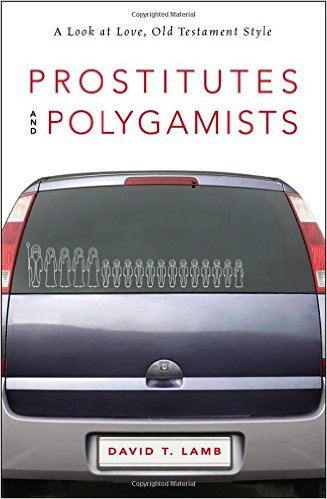 Prostitutes and Polygamists: A Look at Love Old Testament Style David T. Lamb (Zondervan) $16.99 From the moment I saw the hilarious cover, I knew I’d like this book by the popular author of God Beha
Prostitutes and Polygamists: A Look at Love Old Testament Style David T. Lamb (Zondervan) $16.99 From the moment I saw the hilarious cover, I knew I’d like this book by the popular author of God Beha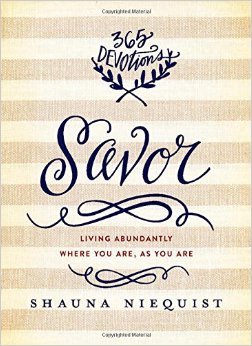 Savor: Living Abundantly Where You Are, As You Are Shauna Niequist (Zondervan) $16.99 I didn’t want to name this under the category about daily devotionals or spiritual formation in Part One of our “Best of 2015” lists. Although Savor is a lovely collection of 365 short daily readings, with a Bible verse starting each reading, by an inspirationally Christian writer, it seemed somehow something other than that. This is a way to dip in to previous writings of Shauna Niequist and add in some new reflections and suggestions for gracious living. The format is like a daily devo, but the approach is broad. We are invited to trust God, to trust the goodness of the world God made: reality is hard, tragic, even, and Niequist knows this, but through it all we can rally to see the grace God offers, a shot at redemption in the mundane ordinary stuff of life. Savor really is a call to pay attention to daily life, to savor the details, to enjoy and feel (and lament) what is really around us. Wonder, joy, goodness, betrayal, sadness, failure. One of Niequist’s book is called Bittersweet, after all, and there are excerpts of it here.
Savor: Living Abundantly Where You Are, As You Are Shauna Niequist (Zondervan) $16.99 I didn’t want to name this under the category about daily devotionals or spiritual formation in Part One of our “Best of 2015” lists. Although Savor is a lovely collection of 365 short daily readings, with a Bible verse starting each reading, by an inspirationally Christian writer, it seemed somehow something other than that. This is a way to dip in to previous writings of Shauna Niequist and add in some new reflections and suggestions for gracious living. The format is like a daily devo, but the approach is broad. We are invited to trust God, to trust the goodness of the world God made: reality is hard, tragic, even, and Niequist knows this, but through it all we can rally to see the grace God offers, a shot at redemption in the mundane ordinary stuff of life. Savor really is a call to pay attention to daily life, to savor the details, to enjoy and feel (and lament) what is really around us. Wonder, joy, goodness, betrayal, sadness, failure. One of Niequist’s book is called Bittersweet, after all, and there are excerpts of it here.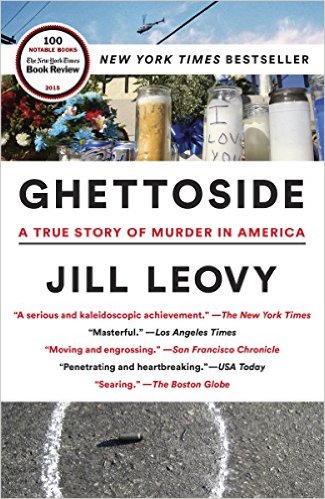 Ghettoside: A True Story of Murder in America Jill Leovy (Spiegel & Grau) $16.00 To explain: I have been brought to tears, weeping many times this year listening to a powerful song called “The New Jim Crow” on the latest Indigo Girls album One Lost Day. The heady book of that name by Michelle Alexander to which the song alludes is a serious study of the racism undeniably evident in the crisis of what is now called mass incarceration. One of our selections for Best Books of last year – now out in paperback – was a passionate, story-filled, illuminating similar work called Just Mercy: A Story of Justice and Redemption by African American legal activist Bryan Stevenson (who we first heard at the Jubilee conference in Pittsburgh years ago, introduced to us as he was by Tony Campolo, Bryan’s college mentor.) With the much-discussed scholarship of Alexander’s New Jim Crow and the best-selling passionate testimony about Bryan Stephenson’s legal aid work told so well in Just Mercy – not to mention the horrors of police violence and dramatic debate about law enforcement tactics and judicial outcomes in places like Ferguson, MO – American is on high alert about the issues of urban crime, about police work, about race and class and economics and politics in the complex work for the common good in our urban centers. Add in the popularity of so many Law and Order type crime shows, and the award winning power of The Wire, and you realize that this recent book by award winning journalist Jill Leovy was poised to be a best-seller. Released last January in hard-cover, now out in paperback, it was doubtlessly one of the best books I read all year – I sat on the couch and would hardly budge, reading, reading, reading, exclaiming on every page how very interesting and eye-opening it was. I’m not much of a true crime buff, but this was simply spectacular, how it was written, the pacing and story arc, and the actual story and topic. I wrote about it (here) and cannot say enough about it.
Ghettoside: A True Story of Murder in America Jill Leovy (Spiegel & Grau) $16.00 To explain: I have been brought to tears, weeping many times this year listening to a powerful song called “The New Jim Crow” on the latest Indigo Girls album One Lost Day. The heady book of that name by Michelle Alexander to which the song alludes is a serious study of the racism undeniably evident in the crisis of what is now called mass incarceration. One of our selections for Best Books of last year – now out in paperback – was a passionate, story-filled, illuminating similar work called Just Mercy: A Story of Justice and Redemption by African American legal activist Bryan Stevenson (who we first heard at the Jubilee conference in Pittsburgh years ago, introduced to us as he was by Tony Campolo, Bryan’s college mentor.) With the much-discussed scholarship of Alexander’s New Jim Crow and the best-selling passionate testimony about Bryan Stephenson’s legal aid work told so well in Just Mercy – not to mention the horrors of police violence and dramatic debate about law enforcement tactics and judicial outcomes in places like Ferguson, MO – American is on high alert about the issues of urban crime, about police work, about race and class and economics and politics in the complex work for the common good in our urban centers. Add in the popularity of so many Law and Order type crime shows, and the award winning power of The Wire, and you realize that this recent book by award winning journalist Jill Leovy was poised to be a best-seller. Released last January in hard-cover, now out in paperback, it was doubtlessly one of the best books I read all year – I sat on the couch and would hardly budge, reading, reading, reading, exclaiming on every page how very interesting and eye-opening it was. I’m not much of a true crime buff, but this was simply spectacular, how it was written, the pacing and story arc, and the actual story and topic. I wrote about it (here) and cannot say enough about it.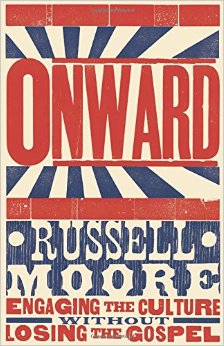 Onward: Engaging the Culture without Losing the Gospel Russell D. Moore (Broadman Holman) $24.99 Anyone who has heard or met Rev. Moore will know him to be a kind and gracious man, thoughtful and serious-minded about how to live out the full-orbed implications of the true gospel in a culture that he believes to be fading quickly from health and wholeness. Yet, he is a man alive, on a mission, and is full of generous hope. He has written widely (for instance, a good exegetical book about the temptations of Jesus, and a rousing book about the need for reform and charity in the field of orphan care and adoption.) This recent book captures his sense of urgency, but tempered with grace and hope. It is exceptionally significant; a bellwether book indicating huge changes afoot in what has often been called the Christian right.
Onward: Engaging the Culture without Losing the Gospel Russell D. Moore (Broadman Holman) $24.99 Anyone who has heard or met Rev. Moore will know him to be a kind and gracious man, thoughtful and serious-minded about how to live out the full-orbed implications of the true gospel in a culture that he believes to be fading quickly from health and wholeness. Yet, he is a man alive, on a mission, and is full of generous hope. He has written widely (for instance, a good exegetical book about the temptations of Jesus, and a rousing book about the need for reform and charity in the field of orphan care and adoption.) This recent book captures his sense of urgency, but tempered with grace and hope. It is exceptionally significant; a bellwether book indicating huge changes afoot in what has often been called the Christian right.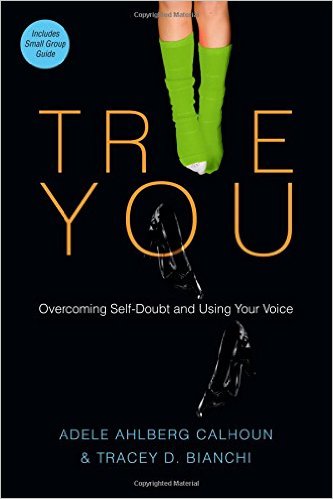 True You: Overcoming Self-Doubt and Using Your Voice Adele Ahlberg Calhoun & Tracey D. Bianchi (IVP) $16.00 I think the IVP Crescendo line of books is doing some of the most consistently good titles in the religious publishing world today. I’ve read most of them and think they are a blast — always interesting, caring and warm, but not smarmy or condescending, the way some evangelical books for women tend to be. This wonderful book, which is exceedingly relevant and very, very important, is a perfect example of the thoughtfulness and wisdom that goes into these sorts of books. It is savvy and smart, but not academic or arcane. It is full of deep Christian insight, nicely explained. It is honest and real and helpful.
True You: Overcoming Self-Doubt and Using Your Voice Adele Ahlberg Calhoun & Tracey D. Bianchi (IVP) $16.00 I think the IVP Crescendo line of books is doing some of the most consistently good titles in the religious publishing world today. I’ve read most of them and think they are a blast — always interesting, caring and warm, but not smarmy or condescending, the way some evangelical books for women tend to be. This wonderful book, which is exceedingly relevant and very, very important, is a perfect example of the thoughtfulness and wisdom that goes into these sorts of books. It is savvy and smart, but not academic or arcane. It is full of deep Christian insight, nicely explained. It is honest and real and helpful.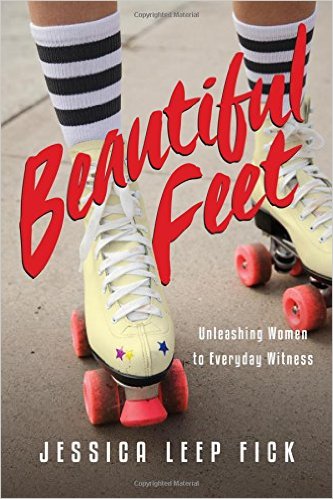 Beautiful Feet: Unleashing Women to Everyday Witness Jessica Leep Fick (IVP) $16.00 We have dozens and dozens of books on evangelism, and I get tell you my favorite few, our top ten, or suggest some that would be good for you given your own religious orientation or denominational ethos. From the most progressive mainline church to the most rigid Reformed ones and anything in between, there are resources that can help us all grapple with what it means to bear witness to God’s saving grace in Christ and to find ways to help unchurched folks find a relationship with God, reconciled with their Maker by receiving God’s forgiveness. I think most of us don’t do this very well, and everybody is anxious about not offending anyone (and those that aren’t, well, they probably should be.) In this pluralistic, post-Christian world, there are great, fresh opportunities to advance the Kingdom of God by inviting people and families, organizations and institutions, into an awareness of the mercy that surrounds us and into a submission to the Lordship of King Jesus. It’s exciting, complicated, and not a little bit perplexing.
Beautiful Feet: Unleashing Women to Everyday Witness Jessica Leep Fick (IVP) $16.00 We have dozens and dozens of books on evangelism, and I get tell you my favorite few, our top ten, or suggest some that would be good for you given your own religious orientation or denominational ethos. From the most progressive mainline church to the most rigid Reformed ones and anything in between, there are resources that can help us all grapple with what it means to bear witness to God’s saving grace in Christ and to find ways to help unchurched folks find a relationship with God, reconciled with their Maker by receiving God’s forgiveness. I think most of us don’t do this very well, and everybody is anxious about not offending anyone (and those that aren’t, well, they probably should be.) In this pluralistic, post-Christian world, there are great, fresh opportunities to advance the Kingdom of God by inviting people and families, organizations and institutions, into an awareness of the mercy that surrounds us and into a submission to the Lordship of King Jesus. It’s exciting, complicated, and not a little bit perplexing.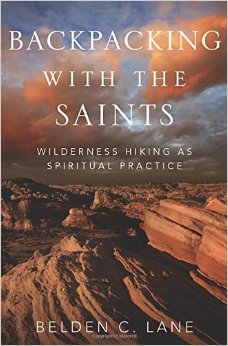 Backpacking with the Saints: Wilderness Hiking as a Spiritual Practice Beldon C. Lane (Oxford University Press) $24.95 I have written about this often, and there is no doubt that it is an outstanding, outstanding book, helping us all – campers, hikers, paddlers, wilderness adventurers or not – to appreciate how Biblical heroes and spiritual saints can be more deeply appreciated when read and pondered in the great outdoors. I haven’t done any hiking in years, I am sad to say, so I especially love the opportunity to do some vicarious adventuring along with my spiritual development. This is a really nice resource and a lovely book.
Backpacking with the Saints: Wilderness Hiking as a Spiritual Practice Beldon C. Lane (Oxford University Press) $24.95 I have written about this often, and there is no doubt that it is an outstanding, outstanding book, helping us all – campers, hikers, paddlers, wilderness adventurers or not – to appreciate how Biblical heroes and spiritual saints can be more deeply appreciated when read and pondered in the great outdoors. I haven’t done any hiking in years, I am sad to say, so I especially love the opportunity to do some vicarious adventuring along with my spiritual development. This is a really nice resource and a lovely book.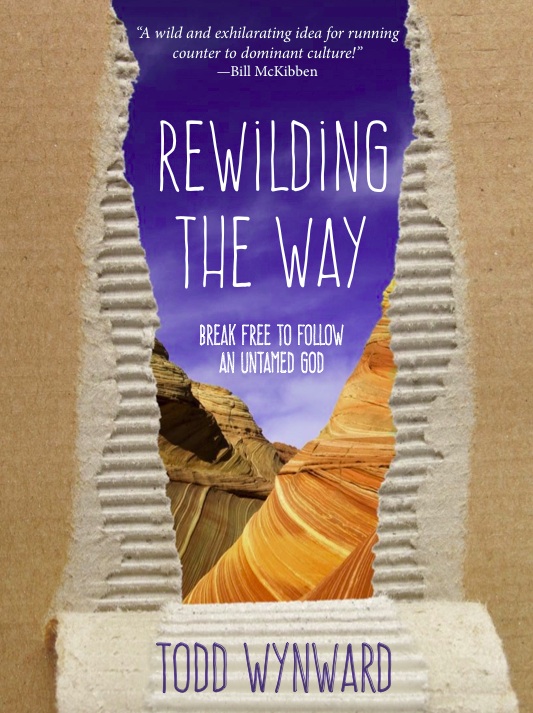 Rewilding the Way: Break Free to Follow an Untamed God Todd
Rewilding the Way: Break Free to Follow an Untamed God Todd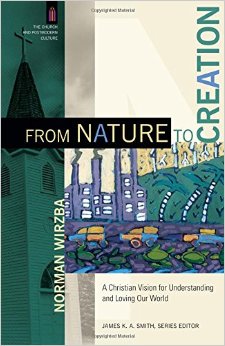 From Nature to Creation: A Christian Vision for Understanding Our World Norman Wirzba (Baker Academic) $19.99 This book deserves accolades for a number of reasons, and is significant on a number of fronts. First, I should remind you that it is the most recent (and maybe the last) in the long series of books edited by James K.A. Smith called “The Church and Postmodern Culture.” Launched by Smith’s own wonderful first one, Whose Afraid of Postmodernism. These are fascinating examples of serious Christian scholars interacting with European philosophers like Derrida and the like. The whole series attempts to use our theological resources to help us grapple with the critique made by these deconstructionists, rather then merely disagree with them, or avoid their hard-hitting social criticisms. So kudos to Smith and the authors he’s worked with to create this set of books.
From Nature to Creation: A Christian Vision for Understanding Our World Norman Wirzba (Baker Academic) $19.99 This book deserves accolades for a number of reasons, and is significant on a number of fronts. First, I should remind you that it is the most recent (and maybe the last) in the long series of books edited by James K.A. Smith called “The Church and Postmodern Culture.” Launched by Smith’s own wonderful first one, Whose Afraid of Postmodernism. These are fascinating examples of serious Christian scholars interacting with European philosophers like Derrida and the like. The whole series attempts to use our theological resources to help us grapple with the critique made by these deconstructionists, rather then merely disagree with them, or avoid their hard-hitting social criticisms. So kudos to Smith and the authors he’s worked with to create this set of books.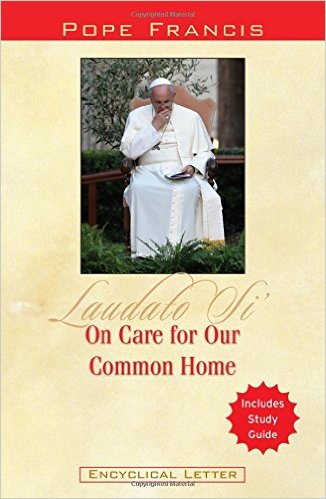 On Care of Our Common Home (Laudato Si) Pope Francis (Word Among Us Press) $12.95 I suppose you know about Encyclical Letters, the rare and formal times a Pope offers to his Roman Catholic flock and the listening world a declaration of what he takes to be God’s will, Christian truth for the church and for the cultures of the world. Much has been made of Pope Francis’ radical ways — that he took the namesake of the old Saint Francis of Assisi is important — and his own former ministry among the poor in his native South America influenced him significantly.
On Care of Our Common Home (Laudato Si) Pope Francis (Word Among Us Press) $12.95 I suppose you know about Encyclical Letters, the rare and formal times a Pope offers to his Roman Catholic flock and the listening world a declaration of what he takes to be God’s will, Christian truth for the church and for the cultures of the world. Much has been made of Pope Francis’ radical ways — that he took the namesake of the old Saint Francis of Assisi is important — and his own former ministry among the poor in his native South America influenced him significantly. 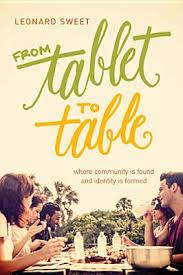 From Tablet to Table: Where Community is Formed and Identity is Formed Leonard Sweet (NavPress) $14.99 I offer this award somewhat tongue in cheek – Sweet really has the capacity to read volumes and volumes (ancient spiritual saints, contemporary postmodern theorist, the latest cultural critics and preachers) and draw on their most pithy lines and insights as he weaves his own books, some big and significant, some more moderate in size and ambition. He has released nearly a book a year for a decade now, or so it seems -it’s hard to keep up – and most have been delightful, curious, interesting, informative, inspiring. Last year he did a nearly magisterial book on preaching (cleverly entitled Giving Blood) and, I’m glad to report, this year’s book is a short, slim one. I’d be resentful if he did two huge, demanding volumes back to back.
From Tablet to Table: Where Community is Formed and Identity is Formed Leonard Sweet (NavPress) $14.99 I offer this award somewhat tongue in cheek – Sweet really has the capacity to read volumes and volumes (ancient spiritual saints, contemporary postmodern theorist, the latest cultural critics and preachers) and draw on their most pithy lines and insights as he weaves his own books, some big and significant, some more moderate in size and ambition. He has released nearly a book a year for a decade now, or so it seems -it’s hard to keep up – and most have been delightful, curious, interesting, informative, inspiring. Last year he did a nearly magisterial book on preaching (cleverly entitled Giving Blood) and, I’m glad to report, this year’s book is a short, slim one. I’d be resentful if he did two huge, demanding volumes back to back.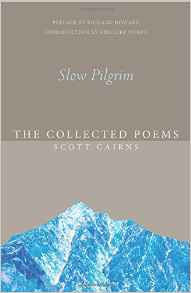 Slow Pilgrim: Collected Poems Scott Cairns (Paraclete Press) $39.00 I will admit to this right up front. I don’t know much about poetry, and, frankly, go through phases, long phases, where I don’t pay much attention to these glorious gifts of word play and verse. (I do pay attention to well-written song lyrics, but that is, admittedly, a different art.) Every now and then, though, I relish a certain poetic work, discover a certain poet, and I pay more attention. Are you maybe like that? Few Americans buy much poetry, and although we have a unique selection here, we don’t sell much poetry at all.
Slow Pilgrim: Collected Poems Scott Cairns (Paraclete Press) $39.00 I will admit to this right up front. I don’t know much about poetry, and, frankly, go through phases, long phases, where I don’t pay much attention to these glorious gifts of word play and verse. (I do pay attention to well-written song lyrics, but that is, admittedly, a different art.) Every now and then, though, I relish a certain poetic work, discover a certain poet, and I pay more attention. Are you maybe like that? Few Americans buy much poetry, and although we have a unique selection here, we don’t sell much poetry at all.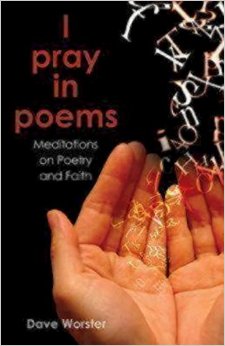 I Pray in Poems: Meditations on Poetry and Faith Dave Worster (Morehosue Publishing) $16.00 Did you resonate with what I wrote about, that some of us just don’t pay enough attention to poetry? This book may be for you. (Of course, if you are already a poetry lover, then this book will thrill you to no end.)
I Pray in Poems: Meditations on Poetry and Faith Dave Worster (Morehosue Publishing) $16.00 Did you resonate with what I wrote about, that some of us just don’t pay enough attention to poetry? This book may be for you. (Of course, if you are already a poetry lover, then this book will thrill you to no end.)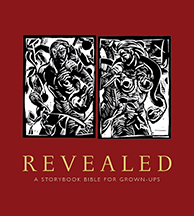 Revealed: A Picture Bible for Grown Ups edited and compiled by Ned Bustard (Square Halo Books) $37.99 You may want to know that this was one of our biggest sellers this last quarter; it was released a week and half before Christmas, an artful Bible-lover reviewed it briefly in the serious journal First Things, and the next thing you know we were shipping this handsome, provocative, coffee table picture Bible all over the country. And overseas! What fun.
Revealed: A Picture Bible for Grown Ups edited and compiled by Ned Bustard (Square Halo Books) $37.99 You may want to know that this was one of our biggest sellers this last quarter; it was released a week and half before Christmas, an artful Bible-lover reviewed it briefly in the serious journal First Things, and the next thing you know we were shipping this handsome, provocative, coffee table picture Bible all over the country. And overseas! What fun.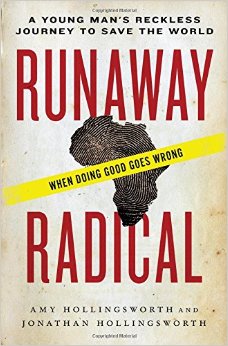 Runaway Radical: A Young Man’s Reckless Journey to Save the World Amy & Jonathan Hollingsworth (Nelson) $15.99 I was going to list this as one of my favorite memoirs of the year, a back and forth tale told by a young adult committed to radical faith and serious visions of making a difference the world and his conventionally Christian mother, watching as the son’s deep faith becomes extreme, driven, weird, even, and as he ends up in Africa serving in a mission compound and is shamed and abused as toxic religionists there add to his bondage and confusion. What a fascinating, relevant, and heartbreaking story, a story of young adult faith development, of the dangers of religious zeal, of the confusions about what Steve Garber calls “proximate justice” – that is, that we in a fallen world need to learn to live with something other than the very best and full, proper realization of God’s will. You can’t always get what you want, the old rock song reminds us, but some young radicals miss this, and filled with idealism and a thin view of the tragic, end up bruised and broken. This was the hard experience of Jonathan Hollingsworth and in Runaway Radical his story is told mostly through the eyes of his mother.
Runaway Radical: A Young Man’s Reckless Journey to Save the World Amy & Jonathan Hollingsworth (Nelson) $15.99 I was going to list this as one of my favorite memoirs of the year, a back and forth tale told by a young adult committed to radical faith and serious visions of making a difference the world and his conventionally Christian mother, watching as the son’s deep faith becomes extreme, driven, weird, even, and as he ends up in Africa serving in a mission compound and is shamed and abused as toxic religionists there add to his bondage and confusion. What a fascinating, relevant, and heartbreaking story, a story of young adult faith development, of the dangers of religious zeal, of the confusions about what Steve Garber calls “proximate justice” – that is, that we in a fallen world need to learn to live with something other than the very best and full, proper realization of God’s will. You can’t always get what you want, the old rock song reminds us, but some young radicals miss this, and filled with idealism and a thin view of the tragic, end up bruised and broken. This was the hard experience of Jonathan Hollingsworth and in Runaway Radical his story is told mostly through the eyes of his mother.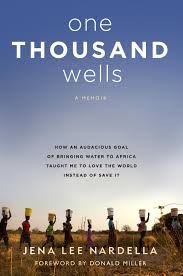 One Thousand Wells: How An Audacious Goal Taught me to Love the World Instead of Save It Jena Lee Nardella (Howard) $24.00 Again, I want to celebrate this fabulous book, one that I exclaimed about as I was reading it, and wrote about the day I was finished with it. Jena Lee Nardella is a brave soul, a social entrepreneur who has worked with the very cool band Jars of Clay as they endeavored with her help to start an innovative wholistic mission project providing clean water and educating about clean blood, to help alleviate disease in Africa. It is important stuff, but enjoyable: IJM President Gary Haugen says it is “a delightful read.”
One Thousand Wells: How An Audacious Goal Taught me to Love the World Instead of Save It Jena Lee Nardella (Howard) $24.00 Again, I want to celebrate this fabulous book, one that I exclaimed about as I was reading it, and wrote about the day I was finished with it. Jena Lee Nardella is a brave soul, a social entrepreneur who has worked with the very cool band Jars of Clay as they endeavored with her help to start an innovative wholistic mission project providing clean water and educating about clean blood, to help alleviate disease in Africa. It is important stuff, but enjoyable: IJM President Gary Haugen says it is “a delightful read.”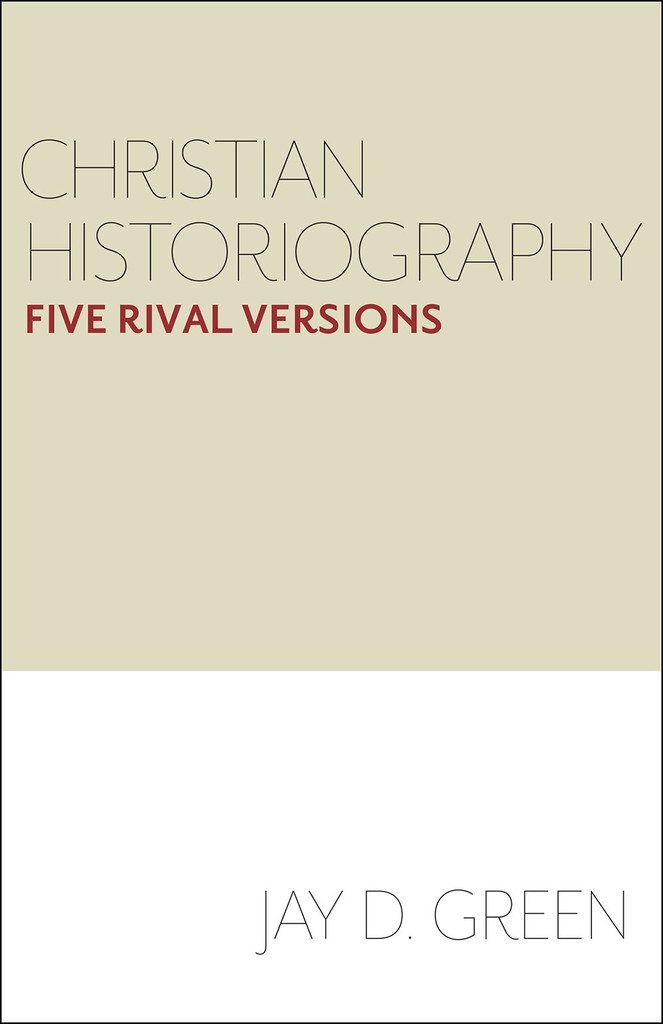 Christian Historiography: Five Rival Views Jay Green (Baylor University Press) $34.95 We are not an academic bookstore, really, and although we carry some scholarly and university press titles, we are a little picky – some say not nearly enough – about the sort of scholarly books we promote in various academic fields. It is a looming question, even in a world where “all truth is God’s truth” and in common grace there is so much to be appreciated and learned: what philosophical underpinnings shape the popular notions of various scholarly fields, or various camps within those fields, and of the particular scholars within those disciplines? How do we bring God’s health and wisdom and Biblically-informed insight to academic discourse, genre by genre, department by department of the modern university? From the details of neurological science or trauma studies to the insights of literary criticism or film studies, from the data found in sociology to the latest studies about climate change, from the debates about theories of jurisprudence to the complexities of aesthetics or architecture, it should be evident that no academic sphere is philosophically neutral, that no scholarship is religiously disinterested, that every scholar believes in something that informs her work. All theories are grounded in the longings and ultimate concerns of the human heart and therefore, seeking to discern the contours of the influences in each field is a major concern for Christian scholars in the academy. It should be obvious, but it usually isn’t, that this is the very calling of Christian academics, and their students, but for thinking Christians in the world at large, it is no less of a necessity; how do we discern the wisdom and truthfulness of the ideas coming at us from presidential candidates, popular science magazines, or between the lines in popular entertainment and advertising? We are always looking for books that thoughtfully engage the foundational theories in any given field, that discern the assumptions and religious-like values that shape the development of those fields, and help us all figure how to, as some put it, develop a uniquely Christian viewpoint as we “integrate faith and learning.”
Christian Historiography: Five Rival Views Jay Green (Baylor University Press) $34.95 We are not an academic bookstore, really, and although we carry some scholarly and university press titles, we are a little picky – some say not nearly enough – about the sort of scholarly books we promote in various academic fields. It is a looming question, even in a world where “all truth is God’s truth” and in common grace there is so much to be appreciated and learned: what philosophical underpinnings shape the popular notions of various scholarly fields, or various camps within those fields, and of the particular scholars within those disciplines? How do we bring God’s health and wisdom and Biblically-informed insight to academic discourse, genre by genre, department by department of the modern university? From the details of neurological science or trauma studies to the insights of literary criticism or film studies, from the data found in sociology to the latest studies about climate change, from the debates about theories of jurisprudence to the complexities of aesthetics or architecture, it should be evident that no academic sphere is philosophically neutral, that no scholarship is religiously disinterested, that every scholar believes in something that informs her work. All theories are grounded in the longings and ultimate concerns of the human heart and therefore, seeking to discern the contours of the influences in each field is a major concern for Christian scholars in the academy. It should be obvious, but it usually isn’t, that this is the very calling of Christian academics, and their students, but for thinking Christians in the world at large, it is no less of a necessity; how do we discern the wisdom and truthfulness of the ideas coming at us from presidential candidates, popular science magazines, or between the lines in popular entertainment and advertising? We are always looking for books that thoughtfully engage the foundational theories in any given field, that discern the assumptions and religious-like values that shape the development of those fields, and help us all figure how to, as some put it, develop a uniquely Christian viewpoint as we “integrate faith and learning.”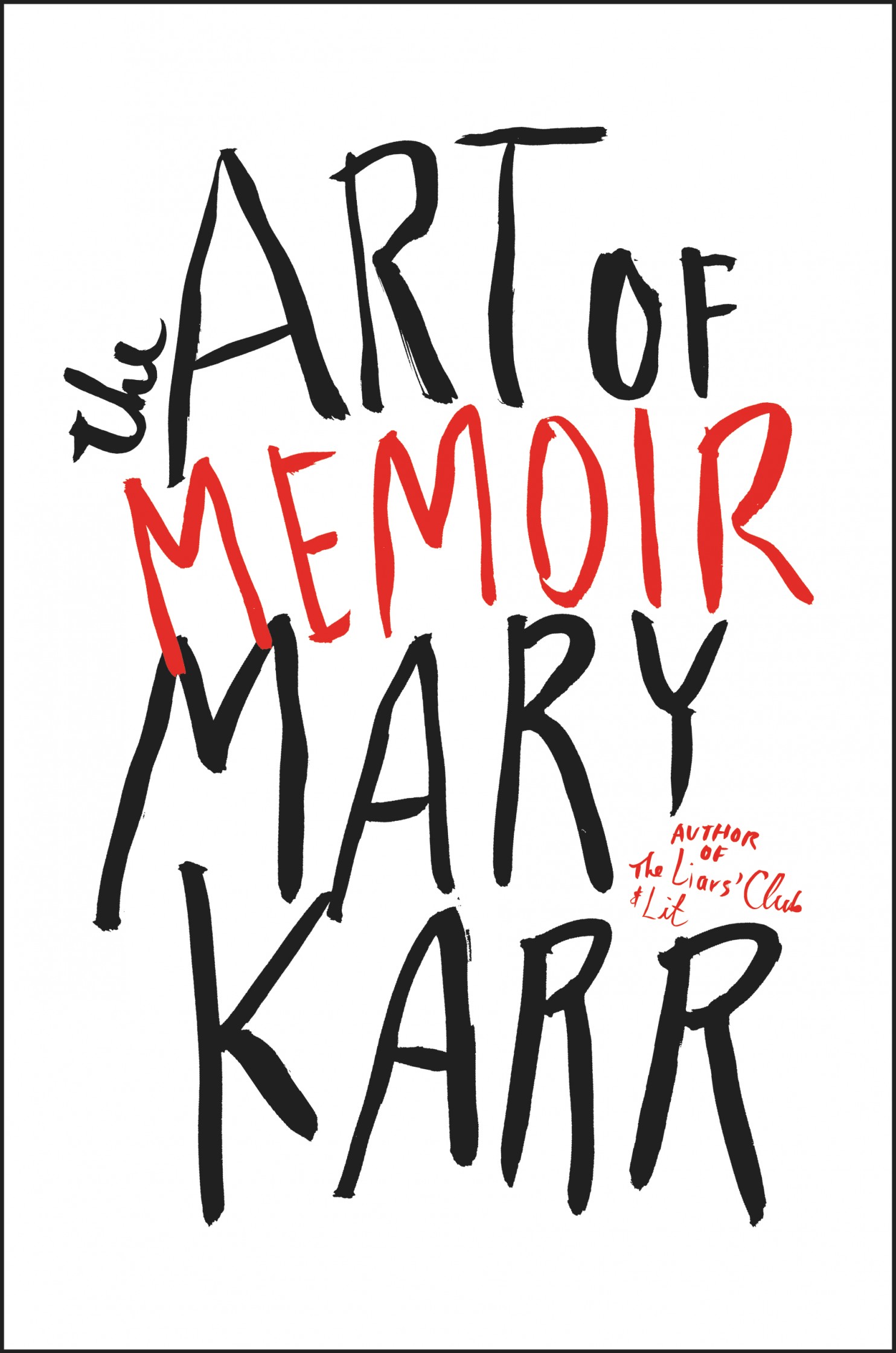 The Art of Memoir Mary Karr (Harper) $24.99 Yes, I’m ashamed I haven’t read more than a page or two of this, but I’m honoring it here anyway.
The Art of Memoir Mary Karr (Harper) $24.99 Yes, I’m ashamed I haven’t read more than a page or two of this, but I’m honoring it here anyway. 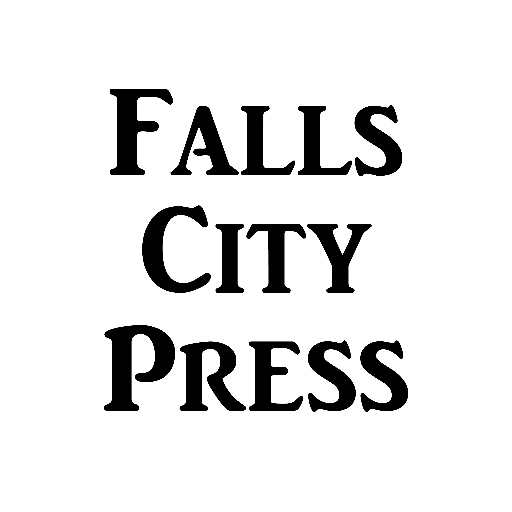
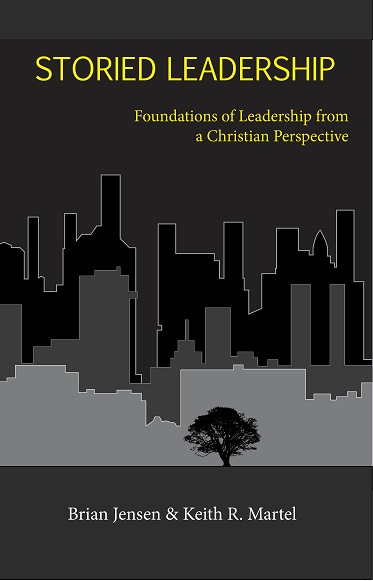 good are rock solid in faith and perspective, philosophical without being arcane, and serious without being dry. So they’ve gotten this whole-life discipleship thing just right: God cares about all of life and we are invited to take up our role as ambassadors of CHrist’s Kingdom, exploring normatively in all aspects of life. So when they write about leadership, they are inviting us to take up vocations within history, inspired by the whole Biblical story, and discover and embody practices that are consistent with that story. It’s a truly wonderful little book, nicely done, and, as I say, published by this groovy new Western PA publishing venture.
good are rock solid in faith and perspective, philosophical without being arcane, and serious without being dry. So they’ve gotten this whole-life discipleship thing just right: God cares about all of life and we are invited to take up our role as ambassadors of CHrist’s Kingdom, exploring normatively in all aspects of life. So when they write about leadership, they are inviting us to take up vocations within history, inspired by the whole Biblical story, and discover and embody practices that are consistent with that story. It’s a truly wonderful little book, nicely done, and, as I say, published by this groovy new Western PA publishing venture.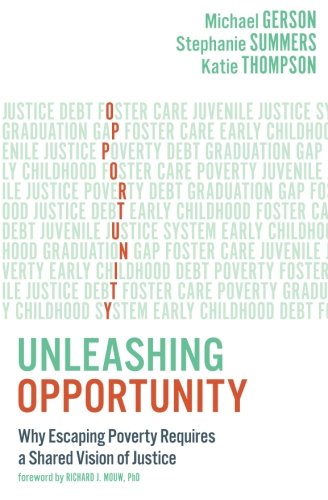 Public Justice. In Unfolding Opportunity: Why Escaping Poverty Requires a Shared Vision of Justice (Falls City Press; $11.99.) Falls City and CPJ give us a handful of topics that are obstacles for those trying to get out of poverty, and areas in need of attention and reforming efforts on the part of those who want to be serious about actually doing something to fight poverty. It’s brief chapters and practical tone make it ideal for young justice activists, it seems, almost a handbook for faithful Christian engagement. In each topic, there are three sections, each penned by either Michael Gerson (famous pundit and former White House speech writer), Stephanie Summers (Director of CPJ) and Katie Thompson (young justice advocate, editor of the CPJ Shared Justice blog.) They look at the facts about the issue, frame it in light of important Biblical themes and Christian insights, and then tell of case studies and good examples of work local groups are doing as an example of actual projects to be considered. Richard Mouw has a very helpful foreword. Three cheers for this great little resource, and three cheers for CPJ choosing this fresh new voice in the publishing world: Falls City Press.
Public Justice. In Unfolding Opportunity: Why Escaping Poverty Requires a Shared Vision of Justice (Falls City Press; $11.99.) Falls City and CPJ give us a handful of topics that are obstacles for those trying to get out of poverty, and areas in need of attention and reforming efforts on the part of those who want to be serious about actually doing something to fight poverty. It’s brief chapters and practical tone make it ideal for young justice activists, it seems, almost a handbook for faithful Christian engagement. In each topic, there are three sections, each penned by either Michael Gerson (famous pundit and former White House speech writer), Stephanie Summers (Director of CPJ) and Katie Thompson (young justice advocate, editor of the CPJ Shared Justice blog.) They look at the facts about the issue, frame it in light of important Biblical themes and Christian insights, and then tell of case studies and good examples of work local groups are doing as an example of actual projects to be considered. Richard Mouw has a very helpful foreword. Three cheers for this great little resource, and three cheers for CPJ choosing this fresh new voice in the publishing world: Falls City Press. Go Set a Watchman Harper Lee (Harper) $27.99
Go Set a Watchman Harper Lee (Harper) $27.99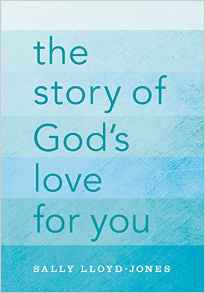 The Story of God’s Love for You Sally Lloyd-Jones (Zondervan) $14.99
The Story of God’s Love for You Sally Lloyd-Jones (Zondervan) $14.99 Staying is the New Going: Choosing to Love Where God Places You Alan Briggs (NavPress) $14.99 I loved this easy-to-read, brief book, and was very impressed with the author’s ability to bring together astute social analysis about our mobile culture and the disinterest in a living local that came with late modern capitalism, with the best of recent missional thinking (for churches but mostly for ordinary folks in their daily lives.) It has just enough solid cultural criticism to be meaty, and tons of fantastic, fascinating footnotes, and it has just enough stories and examples to make it come alive with actionable practicality. As you might guess, this spends some time not only pondering how to imagine a deeper sense of place but inviting us to practices that enhance our care for the local, from supporting farmers markets to indie cafes to local civic organizations. This book is well-informed, helpful, inspirational, and exactly the sort of new missional vision that needs explained and underscored. There’s a tiny bit of hipster new urbanism stuff here, but Staying is the New Going is equally great for those deepening their care for rural life, small towns, and more conventional middle class suburbs. It is sure to touch your heart and help you see your place with different eyes.
Staying is the New Going: Choosing to Love Where God Places You Alan Briggs (NavPress) $14.99 I loved this easy-to-read, brief book, and was very impressed with the author’s ability to bring together astute social analysis about our mobile culture and the disinterest in a living local that came with late modern capitalism, with the best of recent missional thinking (for churches but mostly for ordinary folks in their daily lives.) It has just enough solid cultural criticism to be meaty, and tons of fantastic, fascinating footnotes, and it has just enough stories and examples to make it come alive with actionable practicality. As you might guess, this spends some time not only pondering how to imagine a deeper sense of place but inviting us to practices that enhance our care for the local, from supporting farmers markets to indie cafes to local civic organizations. This book is well-informed, helpful, inspirational, and exactly the sort of new missional vision that needs explained and underscored. There’s a tiny bit of hipster new urbanism stuff here, but Staying is the New Going is equally great for those deepening their care for rural life, small towns, and more conventional middle class suburbs. It is sure to touch your heart and help you see your place with different eyes. Garden City: Work, Rest, and the Art of Being Human John Mark Comer (Zondervan) $20.99 When I reviewed this I said it was a delight, breezy and fun, arranged to appeal to younger readers (it looks like a Rob Bell book with white spaces and some minimalist page design.) It gets at the truths that are so much discussed in so many churches these days, that our faith makes us more fully human, our work matters to God, we are called to vocations for the common good, and throughout all our culture making we are invite by God to relationships, to rest, to wonder.
Garden City: Work, Rest, and the Art of Being Human John Mark Comer (Zondervan) $20.99 When I reviewed this I said it was a delight, breezy and fun, arranged to appeal to younger readers (it looks like a Rob Bell book with white spaces and some minimalist page design.) It gets at the truths that are so much discussed in so many churches these days, that our faith makes us more fully human, our work matters to God, we are called to vocations for the common good, and throughout all our culture making we are invite by God to relationships, to rest, to wonder. The Road to Character David Brooks (Random House) $28.00 This has been one of the most discussed books this year in some circles, at least, and it deserves any accolades it garners. We are eager to highlight its significance, its rich storytelling, its serious-minded and thoughtful approach to how we come to be the people we are. Brooks – who seems to be on a journey towards Christian faith – has released a handful of important books that blend 20
The Road to Character David Brooks (Random House) $28.00 This has been one of the most discussed books this year in some circles, at least, and it deserves any accolades it garners. We are eager to highlight its significance, its rich storytelling, its serious-minded and thoughtful approach to how we come to be the people we are. Brooks – who seems to be on a journey towards Christian faith – has released a handful of important books that blend 20 The Soul of Shame: Retelling the Stories We Tell Believe About Ourselves
The Soul of Shame: Retelling the Stories We Tell Believe About Ourselves Accidental Saints: Finding God in all the Wrong People Nadia Bolz-Weber (Converge) $23.00 I know that many, if not most, of our BookNotes readers will be suspicious of some of Bolz-Weber’s mainline Lutheran theological tendencies, and will disapprove of her ready acceptance and advocacy for persons within the GLTB community. Some will be put off by her cussing – before her come-back-to-Jesus journey that led to ordination in the ELCA she found herself addicted and working in the late night, very blue, comedy circuit. Some will object to her lefty and progressive worldview which verges on self-righteously indignant. I doubt many will mind the artful images from the liturgical calendar famously tattooed across her arms and chest, but it is hard to miss. Still, Bolz-Weber writes like a dream, the book was among the most interested and touching I read all year, and her memoir-like journalism about her edgy emerging faith community (The House of All Sinners and Saints in Denver) contained unforgettable characters and unforgettable theological insights. I loved this book. Disagree with her understanding of doctrine or her embrace of the bohemian sub-culture, but Accidental Saints is about finding God’s grace in bizarre situations, the ups and downs of postmodern church planting, and about God’s own glory seen in the works of mercy, justice, advocacy and art of God’s people in this unusual cultural setting.
Accidental Saints: Finding God in all the Wrong People Nadia Bolz-Weber (Converge) $23.00 I know that many, if not most, of our BookNotes readers will be suspicious of some of Bolz-Weber’s mainline Lutheran theological tendencies, and will disapprove of her ready acceptance and advocacy for persons within the GLTB community. Some will be put off by her cussing – before her come-back-to-Jesus journey that led to ordination in the ELCA she found herself addicted and working in the late night, very blue, comedy circuit. Some will object to her lefty and progressive worldview which verges on self-righteously indignant. I doubt many will mind the artful images from the liturgical calendar famously tattooed across her arms and chest, but it is hard to miss. Still, Bolz-Weber writes like a dream, the book was among the most interested and touching I read all year, and her memoir-like journalism about her edgy emerging faith community (The House of All Sinners and Saints in Denver) contained unforgettable characters and unforgettable theological insights. I loved this book. Disagree with her understanding of doctrine or her embrace of the bohemian sub-culture, but Accidental Saints is about finding God’s grace in bizarre situations, the ups and downs of postmodern church planting, and about God’s own glory seen in the works of mercy, justice, advocacy and art of God’s people in this unusual cultural setting. It’s Not What You Think: Why Christianity Is About So Much More Than Going To Heaven Jefferson Bethke (Nelson) $17.99 If Nadia’s book, above, is a high-octane, colorful telling of post-modern, emerging mainline liturgical faith in the setting of cultural bohemians, this book, at first blush, is the polar opposite. Bethke is culturally conventional and theologically conservative as a Reformed young adult in what seems like a spiffy megachurch. He is in many ways nearly as much of an icon of a certain sort of faith expression as Nadia is for another. You may know how he was catapulted to fame after a lively video called “Jesus is Greater Than Religion” went viral a few years back. Next came a book by the same name exploring more of this wild and passionate Christ-centered vision and it was surprisingly good. This Jefferson Bethke fellow obviously had more than a five minute YouTube sensation in him and as a young evangelical pastor has a keen ability to take serious Biblical truths and show us out to apply them to our lives in orthodox, faithful ways.
It’s Not What You Think: Why Christianity Is About So Much More Than Going To Heaven Jefferson Bethke (Nelson) $17.99 If Nadia’s book, above, is a high-octane, colorful telling of post-modern, emerging mainline liturgical faith in the setting of cultural bohemians, this book, at first blush, is the polar opposite. Bethke is culturally conventional and theologically conservative as a Reformed young adult in what seems like a spiffy megachurch. He is in many ways nearly as much of an icon of a certain sort of faith expression as Nadia is for another. You may know how he was catapulted to fame after a lively video called “Jesus is Greater Than Religion” went viral a few years back. Next came a book by the same name exploring more of this wild and passionate Christ-centered vision and it was surprisingly good. This Jefferson Bethke fellow obviously had more than a five minute YouTube sensation in him and as a young evangelical pastor has a keen ability to take serious Biblical truths and show us out to apply them to our lives in orthodox, faithful ways. Grounded: Finding God in the World – A Spiritual Revolution Diana Butler Bass (HarperOne) $26.99 For a variety of reasons I read and re-read this, dipping in again and again, throughout the fall and early winter. It has stimulated my own thinking, brought great joy – at times tears to my eyes, and a much-needed renewal to my soul – and at times, not an insignificant amount of frustration. This is not the time or place to detail my frustrations with certain lines and certain authors she cites approvingly other than to say there are moments that she seems, to me, to nearly set up a caricature of those she finds wanting, a “straw man” ploy. For instance, Bass talks about an “elevator” view of God and faith, as if the faith of most church folks is merely about going to heaven, zipping out of this world, to be with an otherwise distant deity. Perhaps it is because I rail about such gnostic otherworldliness myself that I am sensitive, now, to being fair about such critiques. Ahh, but yet: even if most who hold to fairly conventional faith and evangelical doctrines don’t quite match her cartoon of them, she is right – so right! – that faith is too often personalized and made internal or disconnected to life in God’s good world. There is a sense that God cares more about the so-called spiritual than the so-called ordinary, secular life, and this book is yet another resource to disabuse us of this wrong-headed and unbiblical view.
Grounded: Finding God in the World – A Spiritual Revolution Diana Butler Bass (HarperOne) $26.99 For a variety of reasons I read and re-read this, dipping in again and again, throughout the fall and early winter. It has stimulated my own thinking, brought great joy – at times tears to my eyes, and a much-needed renewal to my soul – and at times, not an insignificant amount of frustration. This is not the time or place to detail my frustrations with certain lines and certain authors she cites approvingly other than to say there are moments that she seems, to me, to nearly set up a caricature of those she finds wanting, a “straw man” ploy. For instance, Bass talks about an “elevator” view of God and faith, as if the faith of most church folks is merely about going to heaven, zipping out of this world, to be with an otherwise distant deity. Perhaps it is because I rail about such gnostic otherworldliness myself that I am sensitive, now, to being fair about such critiques. Ahh, but yet: even if most who hold to fairly conventional faith and evangelical doctrines don’t quite match her cartoon of them, she is right – so right! – that faith is too often personalized and made internal or disconnected to life in God’s good world. There is a sense that God cares more about the so-called spiritual than the so-called ordinary, secular life, and this book is yet another resource to disabuse us of this wrong-headed and unbiblical view. Finding Livelihood: A Progress of Work and Leisure Nancy J. Nordenson (Kalos Press) $14.95 This handsome paperback is certainly one of the finest literary works I’ve read all year.
Finding Livelihood: A Progress of Work and Leisure Nancy J. Nordenson (Kalos Press) $14.95 This handsome paperback is certainly one of the finest literary works I’ve read all year. Happiness Randy Alcorn (Tyndale) $24.95 When I saw this one word title, and saw the rather sentimental (boring?) cover, I was less interested than I might have been; many of us tend to push away from anything that seems shallow or tepid or which suggests that faith is wedded to the materialism of the American Dream. We might even roll our eyes in this broken, needy, world with the notion that God wants us to be happy. Of course, you should know, as I should have, that Randy Alcorn does none of that, is a fine, fine scholar, drawing on Puritans and hefty theologians that have struggled deeply with Biblical promises and human suffering and the deep glories of knowing God. I have to list this as one of the significant books of the year, in part because of the meticulous research Alcorn as put into this, the informative footnotes, the hefty theological under-girding of this complex, lengthy, and helpful study. I get the sweet cover, I think — it wants to shout to the casual browser that this isn’t a dry tome, laden with arcane quotes from old-school heavyweights that is only for scholars or theologians. Yes, it is heavy, and yes, it quotes significant pastors of an earlier era, but it is written for ordinary folks, those wanting a Biblically-infused vision of one of the most common questions of human existence: can we be happy, and what does that mean? Kudos.
Happiness Randy Alcorn (Tyndale) $24.95 When I saw this one word title, and saw the rather sentimental (boring?) cover, I was less interested than I might have been; many of us tend to push away from anything that seems shallow or tepid or which suggests that faith is wedded to the materialism of the American Dream. We might even roll our eyes in this broken, needy, world with the notion that God wants us to be happy. Of course, you should know, as I should have, that Randy Alcorn does none of that, is a fine, fine scholar, drawing on Puritans and hefty theologians that have struggled deeply with Biblical promises and human suffering and the deep glories of knowing God. I have to list this as one of the significant books of the year, in part because of the meticulous research Alcorn as put into this, the informative footnotes, the hefty theological under-girding of this complex, lengthy, and helpful study. I get the sweet cover, I think — it wants to shout to the casual browser that this isn’t a dry tome, laden with arcane quotes from old-school heavyweights that is only for scholars or theologians. Yes, it is heavy, and yes, it quotes significant pastors of an earlier era, but it is written for ordinary folks, those wanting a Biblically-infused vision of one of the most common questions of human existence: can we be happy, and what does that mean? Kudos. Spiritual Friendship: Finding Love in the Church as a Celibate Gay Christian Wesley
Spiritual Friendship: Finding Love in the Church as a Celibate Gay Christian Wesley Serious Dreams: Bold Ideas for the Rest of Your Life edited by Byron Borger (Square Halo Books) $12.99
Serious Dreams: Bold Ideas for the Rest of Your Life edited by Byron Borger (Square Halo Books) $12.99 passionate message about changing the world by taking up radical visions of vocation preached to graduates from a Master’s program at Geneva College in Western Pennsylvania, and also a gentle introductory chapter inviting young adults to dig in to their hometowns, attending to their hearts, nurturing a sense of place as they are transitioning out of college and into a life of quiet faithfulness. Both the big picture call to social transformation and the Berry-esque invitation to stay put and live local are found here, although most of the chapters — they were graduation speeches offered with great hope at Christian colleges, after all — tend towards the former, with energy and vision and helpful guidance from very wise women and men. But I award this not because of my role, but because of the caliber of the authors compiled and the consistency and often beauty of their messages, inviting young adults to think well about the next stages of their lives, seeking God’s ways as they find themselves in new jobs and new places working out their hopes and dreams in a very needy world. What an honor it was to edit the writings of Richard Mouw, Nicholas Wolterstorff, Claudia Beversluis, Amy Sherman, Steve Garber, John Perkins. These are each stellar individuals, most of them famous writers themselves, and all significant spokespersons for a certain way of inviting us to weave together belief and behavior and live out culture-shaping, whole-life discipleship. There is a fantastic short epilogue by Erica Young Reitz (who has a book coming out next year with IVP called After College.)
passionate message about changing the world by taking up radical visions of vocation preached to graduates from a Master’s program at Geneva College in Western Pennsylvania, and also a gentle introductory chapter inviting young adults to dig in to their hometowns, attending to their hearts, nurturing a sense of place as they are transitioning out of college and into a life of quiet faithfulness. Both the big picture call to social transformation and the Berry-esque invitation to stay put and live local are found here, although most of the chapters — they were graduation speeches offered with great hope at Christian colleges, after all — tend towards the former, with energy and vision and helpful guidance from very wise women and men. But I award this not because of my role, but because of the caliber of the authors compiled and the consistency and often beauty of their messages, inviting young adults to think well about the next stages of their lives, seeking God’s ways as they find themselves in new jobs and new places working out their hopes and dreams in a very needy world. What an honor it was to edit the writings of Richard Mouw, Nicholas Wolterstorff, Claudia Beversluis, Amy Sherman, Steve Garber, John Perkins. These are each stellar individuals, most of them famous writers themselves, and all significant spokespersons for a certain way of inviting us to weave together belief and behavior and live out culture-shaping, whole-life discipleship. There is a fantastic short epilogue by Erica Young Reitz (who has a book coming out next year with IVP called After College.) Songs of Jesus: A Year of Daily Devotions in the Psalms Timothy and Kathy Keller (Dutton) $19.95 We were thrilled to have a brief conversation with Tim about this when we were staffing our book display at the Redeemer Presbyterian Center for Faith & Work conference; the book was just about to come out and he explained how much it means to him, and how he and Kathy have learned to practice (even amidst her own struggle with chronic pain and sustained illness) to read the book of Psalms through each month. This daily devotional is grounded in his solid exegesis of the passages but also in their intimacy with God, their appreciation of how the Psalms point us towards the gospel, and how followers of Christ can, like Jesus himself, draw great insight and sustenance from the devotional reading of these poems, songs, Psalms. The book itself is beautiful, compact sized with two color ink and a ribbon marker. It is one you will want to use, over and over.
Songs of Jesus: A Year of Daily Devotions in the Psalms Timothy and Kathy Keller (Dutton) $19.95 We were thrilled to have a brief conversation with Tim about this when we were staffing our book display at the Redeemer Presbyterian Center for Faith & Work conference; the book was just about to come out and he explained how much it means to him, and how he and Kathy have learned to practice (even amidst her own struggle with chronic pain and sustained illness) to read the book of Psalms through each month. This daily devotional is grounded in his solid exegesis of the passages but also in their intimacy with God, their appreciation of how the Psalms point us towards the gospel, and how followers of Christ can, like Jesus himself, draw great insight and sustenance from the devotional reading of these poems, songs, Psalms. The book itself is beautiful, compact sized with two color ink and a ribbon marker. It is one you will want to use, over and over. The Cultivated Life: From Ceaseless Striving to Receiving Joy Susan S. Phillips (IVP) $17.00 The richness of this beautiful book is exceptional, and I want to award it as one of the very best books of the year. I’ve written about it recently, but thought I’d quote our first comments about it at BookNotes when it released last summer:
The Cultivated Life: From Ceaseless Striving to Receiving Joy Susan S. Phillips (IVP) $17.00 The richness of this beautiful book is exceptional, and I want to award it as one of the very best books of the year. I’ve written about it recently, but thought I’d quote our first comments about it at BookNotes when it released last summer: Wearing God; Clothing, Laughter, Fire, and Other Overlooked Ways of Meeting God Lauren Winner (HarperOne) $24.99 Again, you may know that we’ve mentioned this often and have been glad to tell about it, over and over. We have been boosters of Ms. Winner’s books since her first extraordinary memoir, Girl Meets God. We are thrilled that there was released, just a few months ago, a new, expanded edition of her great second book, Mudhouse Sabbath. We have often recommended her Real Sex and I was deeply touched by her sad memoir, Still: Mid-Faith Crisis. In this new book about unusual images and metaphors for God used in the Bible she steps away just a bit from memoir (although it is still written in her signature style and offers glimpses into her own journey in appropriating these images.)
Wearing God; Clothing, Laughter, Fire, and Other Overlooked Ways of Meeting God Lauren Winner (HarperOne) $24.99 Again, you may know that we’ve mentioned this often and have been glad to tell about it, over and over. We have been boosters of Ms. Winner’s books since her first extraordinary memoir, Girl Meets God. We are thrilled that there was released, just a few months ago, a new, expanded edition of her great second book, Mudhouse Sabbath. We have often recommended her Real Sex and I was deeply touched by her sad memoir, Still: Mid-Faith Crisis. In this new book about unusual images and metaphors for God used in the Bible she steps away just a bit from memoir (although it is still written in her signature style and offers glimpses into her own journey in appropriating these images.) The Crucifixion: Understanding the Death of Jesus Christ Fleming Rutledge (Eerdmans) $45.00 This major work has gotten more advanced rave reviews and remarkable blurbs than any such book I’ve seen in years; major theologians, Bible scholars, denominational leaders and seminary profs all agree that this is a book that is stunning in scope, beautiful in its lucid, careful, prose, and passionate in its formulation of a view of the atonement and the work of the cross that seems to be both ancient and contemporary. Rutledge is perhaps on the more conservative end of the spectrum within her more liberal Episcopalian denomination (she was one of the first women officially ordained by the Episcopalians back in the 70s and has been a stalwart thinker, pastor and preacher within the Anglican communion until her recent retirement from parish ministry.) Even if new and edgy thinkers might find her a bit traditionalist, older school evangelical scholars might find her too progressive or ecumenical. We, of course, think this is a good place to be – too conservative for the liberals, too liberal from the conservatives – and brings a fresh, exciting, new vision to bear that helps us get beyond these stereotypes and binaries. More significantly, though is how she is significantly committed to breaking open the Bible itself, and offers significant, insightful, fascinating rumination on not just theology, but on Scripture. It is one of the major books of our time, a tour de force, magisterial, and one that should read widely.
The Crucifixion: Understanding the Death of Jesus Christ Fleming Rutledge (Eerdmans) $45.00 This major work has gotten more advanced rave reviews and remarkable blurbs than any such book I’ve seen in years; major theologians, Bible scholars, denominational leaders and seminary profs all agree that this is a book that is stunning in scope, beautiful in its lucid, careful, prose, and passionate in its formulation of a view of the atonement and the work of the cross that seems to be both ancient and contemporary. Rutledge is perhaps on the more conservative end of the spectrum within her more liberal Episcopalian denomination (she was one of the first women officially ordained by the Episcopalians back in the 70s and has been a stalwart thinker, pastor and preacher within the Anglican communion until her recent retirement from parish ministry.) Even if new and edgy thinkers might find her a bit traditionalist, older school evangelical scholars might find her too progressive or ecumenical. We, of course, think this is a good place to be – too conservative for the liberals, too liberal from the conservatives – and brings a fresh, exciting, new vision to bear that helps us get beyond these stereotypes and binaries. More significantly, though is how she is significantly committed to breaking open the Bible itself, and offers significant, insightful, fascinating rumination on not just theology, but on Scripture. It is one of the major books of our time, a tour de force, magisterial, and one that should read widely. The Gospel and Pluralism Today: Reassessing Lesslie Newbigin in the 21st Century edited by Scott W. Sunquist and Amos Yong (IVP Academic) $28.00 I hope you know how important Newbigin has been — of his many, many books, his 1986 Foolishness to the Greeks is my favorite, but his most important and respected and discussed is his Gospel in a Pluralistic Society (published by Eerdmans in the late 1980s.) He has written about epistemology, about mission, about culture, about the Bible, about the shifts in the West from modernity to post-modernity. Indeed the important Gospel in Our Culture Network emerged from a Newbigin study group. He was an exceptional missionary, churchman, scholar, and Christian leader and his nuanced reading of secularizing pluralism — and how to bear witness in fruitful ways in such a culture — were groundbreaking. This book explores not only the impact of his thinking, it continues his work by analyzing the nature of 21st century Western pluralism, and it asks how we might continue to do misisons at home and abroad inspired by these generative insights.
The Gospel and Pluralism Today: Reassessing Lesslie Newbigin in the 21st Century edited by Scott W. Sunquist and Amos Yong (IVP Academic) $28.00 I hope you know how important Newbigin has been — of his many, many books, his 1986 Foolishness to the Greeks is my favorite, but his most important and respected and discussed is his Gospel in a Pluralistic Society (published by Eerdmans in the late 1980s.) He has written about epistemology, about mission, about culture, about the Bible, about the shifts in the West from modernity to post-modernity. Indeed the important Gospel in Our Culture Network emerged from a Newbigin study group. He was an exceptional missionary, churchman, scholar, and Christian leader and his nuanced reading of secularizing pluralism — and how to bear witness in fruitful ways in such a culture — were groundbreaking. This book explores not only the impact of his thinking, it continues his work by analyzing the nature of 21st century Western pluralism, and it asks how we might continue to do misisons at home and abroad inspired by these generative insights. The Fellowship: The Literary Lives of the Inklings: JRR Tolkien, C.S. Lewis, Owen Barfield, Charles Williams Philip and Carol Zaleski (Farrar Straus Giroux) $35.00 I am sure this deserves a very special shout out, an honorable mention and more. Not a few very smart folks I respect insist it is one of the best books they’ve ever read, and a few have found it very helpful in their own appreciation for how Lewis & Company did their work. This is not the first book on the Inklings, nor will it be the last. Others have similarly explored the essential art of collaboration nurture at their legendary gatherings and the Child. In a year when there have been several significant books about Lewis and Tolkien et al, this is said to be a tour de force, a spectacular and major work.
The Fellowship: The Literary Lives of the Inklings: JRR Tolkien, C.S. Lewis, Owen Barfield, Charles Williams Philip and Carol Zaleski (Farrar Straus Giroux) $35.00 I am sure this deserves a very special shout out, an honorable mention and more. Not a few very smart folks I respect insist it is one of the best books they’ve ever read, and a few have found it very helpful in their own appreciation for how Lewis & Company did their work. This is not the first book on the Inklings, nor will it be the last. Others have similarly explored the essential art of collaboration nurture at their legendary gatherings and the Child. In a year when there have been several significant books about Lewis and Tolkien et al, this is said to be a tour de force, a spectacular and major work. A Hobbit, A Wardrobe, and a Great War: How J.R.R. Tolkien and C.S. Lewis Rediscovered Faith, Friendship, and Heroism in the Cataclysms of 1914 – 1918 Joseph Loconte (Thomas Nelson) $24.99 This was one of the best of the several Lewis-related books I read this year and I was pleased to have written about it when it first came out. Many critics have extolled it’s historical and sociological insight, specifically about the spirit of the age as it impacted Western Europe, philosophically, religiously, psychologically, and how this Earth-shattering epochal change in outlook – caused by the horrors of World War I – effected these writers. Lewis and Tolkien both saw awful action in the Great War and it affected them in ways that no one has explored so diligently before. This is a great book for understanding the cultural shifts that came to greater flower in the late 20
A Hobbit, A Wardrobe, and a Great War: How J.R.R. Tolkien and C.S. Lewis Rediscovered Faith, Friendship, and Heroism in the Cataclysms of 1914 – 1918 Joseph Loconte (Thomas Nelson) $24.99 This was one of the best of the several Lewis-related books I read this year and I was pleased to have written about it when it first came out. Many critics have extolled it’s historical and sociological insight, specifically about the spirit of the age as it impacted Western Europe, philosophically, religiously, psychologically, and how this Earth-shattering epochal change in outlook – caused by the horrors of World War I – effected these writers. Lewis and Tolkien both saw awful action in the Great War and it affected them in ways that no one has explored so diligently before. This is a great book for understanding the cultural shifts that came to greater flower in the late 20 Women and C.S. Lewis: What His Life and Literature Reveal for Today’s Culture edited by Carolyn Curtis and Mary Pomroy Key (Lion Hudson) $17.95 There has been way too little written on this topic, and aside from a few major works (I think of the under-appreciated A Sword Between the Sexes? C.S. Lewis and the Gender Debates by Mary Stewart Van Leeuwen) there hasn’t been a sustained attention to this in decades. Sexism in Narnia? Or in Screwtape? On among the Inklings? And what should those who appreciate Lewis make of the attacks by the likes of Pullman, who declared Jack a misogynist? Well, what a provocative and important set of questions, and what a fine and fair collection of essays on the topic. It is thoughtful, informed, and altogether fascinating.
Women and C.S. Lewis: What His Life and Literature Reveal for Today’s Culture edited by Carolyn Curtis and Mary Pomroy Key (Lion Hudson) $17.95 There has been way too little written on this topic, and aside from a few major works (I think of the under-appreciated A Sword Between the Sexes? C.S. Lewis and the Gender Debates by Mary Stewart Van Leeuwen) there hasn’t been a sustained attention to this in decades. Sexism in Narnia? Or in Screwtape? On among the Inklings? And what should those who appreciate Lewis make of the attacks by the likes of Pullman, who declared Jack a misogynist? Well, what a provocative and important set of questions, and what a fine and fair collection of essays on the topic. It is thoughtful, informed, and altogether fascinating. Midnight Jesus: Where Struggle, Faith, and Grace Collide Jamie Blaine (Nelson) $15.99 Oh my, what a fun, interesting book that I simply could not put down. Few books this year struck me so, as I enjoyed the antics of this late night intake counselor at a psychiatric clinic, an intervention specialist, and drug and alcohol social worker. From getting beat up by crazed clients to hanging out with the sad and suicidal to telling of his beautiful relationships with the down and out, the lost and lonely, Jamie Blaine is a saint, a strange one, perhaps, a blue-collar, pin-ball playing man of the streets with a generous streak a mile wide and a knack for immediately bonding with the strange ones, those with ripped and worn heavy metal tee shirts, with abused strippers, with con men and stilted lovers and autistic kids. And did I mention that some of the most glorious, glorious writing in the book is describing the glories of his side hustle, working as a DJ at the local roller rink? I’m not kidding; this book is about reaching out with few answers but an abiding conviction that God Is There and, in the person of Jesus, invites us to trust in goodness.
Midnight Jesus: Where Struggle, Faith, and Grace Collide Jamie Blaine (Nelson) $15.99 Oh my, what a fun, interesting book that I simply could not put down. Few books this year struck me so, as I enjoyed the antics of this late night intake counselor at a psychiatric clinic, an intervention specialist, and drug and alcohol social worker. From getting beat up by crazed clients to hanging out with the sad and suicidal to telling of his beautiful relationships with the down and out, the lost and lonely, Jamie Blaine is a saint, a strange one, perhaps, a blue-collar, pin-ball playing man of the streets with a generous streak a mile wide and a knack for immediately bonding with the strange ones, those with ripped and worn heavy metal tee shirts, with abused strippers, with con men and stilted lovers and autistic kids. And did I mention that some of the most glorious, glorious writing in the book is describing the glories of his side hustle, working as a DJ at the local roller rink? I’m not kidding; this book is about reaching out with few answers but an abiding conviction that God Is There and, in the person of Jesus, invites us to trust in goodness. How Dante Can Save Your Life: The Life-Changing Wisdom of History’s Greatest Poem Rod Dreher (Regan Arts) $29.95 I have written about this at length, and shared my appreciation for this often in these last months. Before I actually read it, I admired how handsomely it was designed, and shelved it under literary criticism; it is, after all, a study of Divine Comedy.
How Dante Can Save Your Life: The Life-Changing Wisdom of History’s Greatest Poem Rod Dreher (Regan Arts) $29.95 I have written about this at length, and shared my appreciation for this often in these last months. Before I actually read it, I admired how handsomely it was designed, and shelved it under literary criticism; it is, after all, a study of Divine Comedy. Ordinary Light: A Memoir Tracy K. Smith (Alfred Knopf) $25.95 I love memoirs and have not long ago written a brief explanation of why it is helpful to see how other narrate their lives. When a book is both beautifully written and tells the tales of a fascinating life, such a story grabs me and entertains me, and I come away enriched. Tracy Smith won the Pulitzer Prize a few years back for her Life on Mars and has proven herself a remarkable, stellar author, a delightful writer with flowing prose that is artful without being obscure. She has remarkable recall of her mature observations and great wit as she grew up in a large African American family in the 1980s and on. Her mother was a devout Christian – together they read Little Visits With God every night and Smith embraced a fascinating fastidiousness about being a good child. As she came to meet extended family members, talked with her scientist father, and eventually learned the stories of her parents involvement in the earlier days of the civil rights movement she increasingly comes into her own. Reading Ordinary Light is nearly effortless, yet a literary delight. The opening scene, telling of the death of her mother, was gripping, perfectly realized. What a great, great book.
Ordinary Light: A Memoir Tracy K. Smith (Alfred Knopf) $25.95 I love memoirs and have not long ago written a brief explanation of why it is helpful to see how other narrate their lives. When a book is both beautifully written and tells the tales of a fascinating life, such a story grabs me and entertains me, and I come away enriched. Tracy Smith won the Pulitzer Prize a few years back for her Life on Mars and has proven herself a remarkable, stellar author, a delightful writer with flowing prose that is artful without being obscure. She has remarkable recall of her mature observations and great wit as she grew up in a large African American family in the 1980s and on. Her mother was a devout Christian – together they read Little Visits With God every night and Smith embraced a fascinating fastidiousness about being a good child. As she came to meet extended family members, talked with her scientist father, and eventually learned the stories of her parents involvement in the earlier days of the civil rights movement she increasingly comes into her own. Reading Ordinary Light is nearly effortless, yet a literary delight. The opening scene, telling of the death of her mother, was gripping, perfectly realized. What a great, great book. Going Into the City: Portrait of a Critic as a Young Man Robert Christgau (Dey Street Books) $27.99 Okay, this may not be for everyone, but I think it is one of the most enjoyable and exciting books I’ve read all year. I wrote a very long review of it, which I’ve not posted (email me if you want to see it.) This is the vulgar and at times brilliant memoir of one of the top two or three rock critics of the last 50 years, and an author who helped, literally, shape the craft of rock journalism. His album reviews and rock star interviews are legendary (and brilliant) and this book tells the fascinating (at times exasperating, at times hilarious, at times nearly breathtaking) back story of his work in the rising field of rock music from the 60s on. More, besides the cool reports of this backstage scene, that party and that interview with this or that mega-star – yes, you know the biggest stars of our lifetime! – Christgau spends a lot of time telling about how small magazines got started, how bigger, mainstream journals began to accept album reviews, and what it was like to write both major pieces and smaller reviews for some of the most immediately recognizable media outlets of our time. In this sense, it is about the vocation of being a writer, a critic, a working magazine journalist. Mr. Christgau’s professional passion (the art of journalism, the craft of writing, the making of a living with words, doing intellectual criticism) is a theme of the book (and of my longer review) as he takes up networking other rock writers, pursuing serious on-going conversations about the nature of this work, what it is trying to accomplish and how to do it well, doing workshops, even teaching, eventually, essentially inventing a new craft, a new vocation, creating the calling of rock critic. (There are, as I try to explain in my reflection on the book, parallels here for thoughtful Christian journalists who themselves have networked and confab-ed and sweat blood and tears to make a difference in their salons and zines and alternative publications.)
Going Into the City: Portrait of a Critic as a Young Man Robert Christgau (Dey Street Books) $27.99 Okay, this may not be for everyone, but I think it is one of the most enjoyable and exciting books I’ve read all year. I wrote a very long review of it, which I’ve not posted (email me if you want to see it.) This is the vulgar and at times brilliant memoir of one of the top two or three rock critics of the last 50 years, and an author who helped, literally, shape the craft of rock journalism. His album reviews and rock star interviews are legendary (and brilliant) and this book tells the fascinating (at times exasperating, at times hilarious, at times nearly breathtaking) back story of his work in the rising field of rock music from the 60s on. More, besides the cool reports of this backstage scene, that party and that interview with this or that mega-star – yes, you know the biggest stars of our lifetime! – Christgau spends a lot of time telling about how small magazines got started, how bigger, mainstream journals began to accept album reviews, and what it was like to write both major pieces and smaller reviews for some of the most immediately recognizable media outlets of our time. In this sense, it is about the vocation of being a writer, a critic, a working magazine journalist. Mr. Christgau’s professional passion (the art of journalism, the craft of writing, the making of a living with words, doing intellectual criticism) is a theme of the book (and of my longer review) as he takes up networking other rock writers, pursuing serious on-going conversations about the nature of this work, what it is trying to accomplish and how to do it well, doing workshops, even teaching, eventually, essentially inventing a new craft, a new vocation, creating the calling of rock critic. (There are, as I try to explain in my reflection on the book, parallels here for thoughtful Christian journalists who themselves have networked and confab-ed and sweat blood and tears to make a difference in their salons and zines and alternative publications.) The Year Without A Purchase: One Family’s Quest to Stop Shopping and Start Connecting Scott Dannemiller (WJK) $16.00 I have written about this a few times, and I think, come to think of it, that I laughed out loud more reading this book last summer than any book I read all year. And, it was inspiring, up-lifting, well, in a way. It made me realize I’m not alone in this dumb struggle to figure out a sane lifestyle. Anyway, I have to give this some honorable mention, and will do so by reprinting what I’ve said before.
The Year Without A Purchase: One Family’s Quest to Stop Shopping and Start Connecting Scott Dannemiller (WJK) $16.00 I have written about this a few times, and I think, come to think of it, that I laughed out loud more reading this book last summer than any book I read all year. And, it was inspiring, up-lifting, well, in a way. It made me realize I’m not alone in this dumb struggle to figure out a sane lifestyle. Anyway, I have to give this some honorable mention, and will do so by reprinting what I’ve said before. Joy in the Journey: Finding Abundance in the Shadow of Death Steve & Sharol Hayner (IVP) $16.00 There are a number of customers who have purchased this book from us this fall, and are suggesting it be named the book of the year. It really has had that impact, and, although brief, it is a very powerful story, by an important figure. Hayner worked with InterVarsity Christian Fellowship and in those years I had the privilege of crossing paths with him a few times. Steve ended up
Joy in the Journey: Finding Abundance in the Shadow of Death Steve & Sharol Hayner (IVP) $16.00 There are a number of customers who have purchased this book from us this fall, and are suggesting it be named the book of the year. It really has had that impact, and, although brief, it is a very powerful story, by an important figure. Hayner worked with InterVarsity Christian Fellowship and in those years I had the privilege of crossing paths with him a few times. Steve ended up The Pastor as Public Theologian: Reclaiming a Lost Vision Kevin Vanhoozer & Owen Strachan (Baker Academic) $19.99 Again, this is one I have written about before and, I trust, is one that you will agree is a “no brainer” as one of the most important books of the year. This wise and passionate call for churches to see their pastors as resident theologians, and for clergy to see as part of their own calling the on-going task of being a theologian with and for the congregation, is one we who care about reading and books would naturally sound out: what pastor worth his or her salt isn’t reading seriously, citing authors, teaching about what they are learning, helping congregants deepen their discipleship by engaging in the task of doing theology?
The Pastor as Public Theologian: Reclaiming a Lost Vision Kevin Vanhoozer & Owen Strachan (Baker Academic) $19.99 Again, this is one I have written about before and, I trust, is one that you will agree is a “no brainer” as one of the most important books of the year. This wise and passionate call for churches to see their pastors as resident theologians, and for clergy to see as part of their own calling the on-going task of being a theologian with and for the congregation, is one we who care about reading and books would naturally sound out: what pastor worth his or her salt isn’t reading seriously, citing authors, teaching about what they are learning, helping congregants deepen their discipleship by engaging in the task of doing theology? 
 The Vulnerable Pastor: How Human Limitations Empower Our Ministry Mandy Smith (IVP) $16.00 I believe this beautifully written book — even though it seems to be mostly for pastors — would be an excellent read for anyone involved in church leadership or engaged in congregational ministry and certainly for those doing para-church ministry. Mandy is a vibrant young-ish woman serving as the lead pastor in an interesting urban church near the university section of Cincinnati, and has grown weary of the expectations, metrics and high-pressured methods that often accompany church work. Through hardships, tears, and much profoundly spiritual reflection she has learned to articulate how weakness and vulnerability can (as the apostle Paul himself insists) lead us to rely on God, be empowered in fresh ways by the Holy Spirit, and find greater union with the very human, suffering Christ. Pastors and leaders are, after all, human.
The Vulnerable Pastor: How Human Limitations Empower Our Ministry Mandy Smith (IVP) $16.00 I believe this beautifully written book — even though it seems to be mostly for pastors — would be an excellent read for anyone involved in church leadership or engaged in congregational ministry and certainly for those doing para-church ministry. Mandy is a vibrant young-ish woman serving as the lead pastor in an interesting urban church near the university section of Cincinnati, and has grown weary of the expectations, metrics and high-pressured methods that often accompany church work. Through hardships, tears, and much profoundly spiritual reflection she has learned to articulate how weakness and vulnerability can (as the apostle Paul himself insists) lead us to rely on God, be empowered in fresh ways by the Holy Spirit, and find greater union with the very human, suffering Christ. Pastors and leaders are, after all, human. Servants and Fools: A Biblical Theology of Leadership Arthur Boers (Abingdon Press) $19.99 Wow, I was excited to read this as soon as I heard about it – Boers, a Canadian Anglican who spent most of his life as a Mennonite, is a favorite author, and I’ve read most of his many books, on discipleship, spirituality, conflict resolution, The Lord’s Prayer, and that great book where he draws on Albert Borgman’s philosophy of focal practices, called Living Into Focus: Choosing What Matters in an Age of Distraction. I knew this would be hard-hitting, a prophetic critique of how we’ve too often presumed and bought into the reigning assumptions about leadership, strength, power, organization and the rest. Less personal and tender and funny as Many Smith, they would both certain appreciate each other. Thanks be to God that there are courageous authors who are thoughtful and intentional about being Biblically-shaped leaders, and helping us all see what that might entail.
Servants and Fools: A Biblical Theology of Leadership Arthur Boers (Abingdon Press) $19.99 Wow, I was excited to read this as soon as I heard about it – Boers, a Canadian Anglican who spent most of his life as a Mennonite, is a favorite author, and I’ve read most of his many books, on discipleship, spirituality, conflict resolution, The Lord’s Prayer, and that great book where he draws on Albert Borgman’s philosophy of focal practices, called Living Into Focus: Choosing What Matters in an Age of Distraction. I knew this would be hard-hitting, a prophetic critique of how we’ve too often presumed and bought into the reigning assumptions about leadership, strength, power, organization and the rest. Less personal and tender and funny as Many Smith, they would both certain appreciate each other. Thanks be to God that there are courageous authors who are thoughtful and intentional about being Biblically-shaped leaders, and helping us all see what that might entail. Radical Sending: Go To Love and Serve the Lord Demi Prentiss & Fletcher Love (Morehouse) $18.00 We have hundreds of books about congregational health, about church revitalization, about both the theology of church and the spirituality of local faith communities. Many are excellent, and we enjoy letting church leaders in on the benefits of reading widely in this genre of books about church life. Many, however, seem overlapping, and, although still useful, it is rare to find one that is really offering new insights, new stories, fresh and vital guidance. Radical Sending is such a book, and I’d say there is hardly a book on the market like it.
Radical Sending: Go To Love and Serve the Lord Demi Prentiss & Fletcher Love (Morehouse) $18.00 We have hundreds of books about congregational health, about church revitalization, about both the theology of church and the spirituality of local faith communities. Many are excellent, and we enjoy letting church leaders in on the benefits of reading widely in this genre of books about church life. Many, however, seem overlapping, and, although still useful, it is rare to find one that is really offering new insights, new stories, fresh and vital guidance. Radical Sending is such a book, and I’d say there is hardly a book on the market like it. Fools Talk: Recovering the Art of Christian Persuasion (IVP) $22.00 In mid-June, when this book released, I did a very lengthy rumination on it, explaining who Dr. Guinness is, highlighting a few of his many books, and noting why I thought he was the perfect author for this necessary topic. I was thrilled with Fools Talk and was stimulated, provoked, challenged and encouraged by working through it. It was intellectually stimulating because (for among many reasons) Guinness is weaving together the potent insights of three great thinkers who have influenced him: C.S. Lewis, Francis Schaeffer, and Peter Berger. I knew without a doubt that I would name it as one of the very best books of the year.
Fools Talk: Recovering the Art of Christian Persuasion (IVP) $22.00 In mid-June, when this book released, I did a very lengthy rumination on it, explaining who Dr. Guinness is, highlighting a few of his many books, and noting why I thought he was the perfect author for this necessary topic. I was thrilled with Fools Talk and was stimulated, provoked, challenged and encouraged by working through it. It was intellectually stimulating because (for among many reasons) Guinness is weaving together the potent insights of three great thinkers who have influenced him: C.S. Lewis, Francis Schaeffer, and Peter Berger. I knew without a doubt that I would name it as one of the very best books of the year. Who Rules the Earth: How Social Rules Shape Our Planet & Our Lives Paul Steinberg (Oxford University Press) $25.99 As I hope you know, we stock a large number of books about the interface of faith and environmental studies, what we’ve come to call creation-care. Evangelicals, especially, have written excellent books about eco-theology, about our call to steward well the goodness of the creation, and how lively faith can propel us not just to more simple, sustainable lifestyles, but to bigger matters of how we live with the “groaning creation” (Romans 8.) We carry books that are not overtly Christian, too, studies of the debates about climate change, handbooks for green living, and more. This remarkable book, though, isn’t exactly about the science or policy of global warming, but it does offer exceedingly important insights for anyone interested in the big questions about what has to happen for a more sustainable global economy in our 21
Who Rules the Earth: How Social Rules Shape Our Planet & Our Lives Paul Steinberg (Oxford University Press) $25.99 As I hope you know, we stock a large number of books about the interface of faith and environmental studies, what we’ve come to call creation-care. Evangelicals, especially, have written excellent books about eco-theology, about our call to steward well the goodness of the creation, and how lively faith can propel us not just to more simple, sustainable lifestyles, but to bigger matters of how we live with the “groaning creation” (Romans 8.) We carry books that are not overtly Christian, too, studies of the debates about climate change, handbooks for green living, and more. This remarkable book, though, isn’t exactly about the science or policy of global warming, but it does offer exceedingly important insights for anyone interested in the big questions about what has to happen for a more sustainable global economy in our 21 Prophetic Lament: A Call for Justice in a Troubled World Soong-Chah
Prophetic Lament: A Call for Justice in a Troubled World Soong-Chah Bigger on the Inside: Christianity and Doctor Who edited
Bigger on the Inside: Christianity and Doctor Who edited Culture Care Makoto Fujimura (Fujimura Institute) $25.00 I trust you know our friend Mako Fujimura, one of the leading abstract painters working in the serious American art world. A Japanese-American (who graduated from Bucknell University here in central Pennsylvania) he has kept alive and developed a painstakingly caring, Japanese form of painting (using expensive, glimmering crushed minerals.) He has become an tireless public intellectual, writing, lecturing, hosting exhibits, forming organizations such as the renowned International Arts Movement. (And his recent appointment as Director of the excellent Brehm Center at Fuller Theological Seminary in Pasadena, California.) As a thoughtful evangelical Christian, Mako has articulated well a deeply Biblical vision of the arts, and a faith-based perspective on art criticism and the practices of the faithful aesthetic life. We carry most of his many books, and was honored to be one of the very first bookstore to stock this handsome, handcrafted paperback (with a very creative onion-skin paper dust jacket) produced recently by Fujimura’s own organization in New Jersey.
Culture Care Makoto Fujimura (Fujimura Institute) $25.00 I trust you know our friend Mako Fujimura, one of the leading abstract painters working in the serious American art world. A Japanese-American (who graduated from Bucknell University here in central Pennsylvania) he has kept alive and developed a painstakingly caring, Japanese form of painting (using expensive, glimmering crushed minerals.) He has become an tireless public intellectual, writing, lecturing, hosting exhibits, forming organizations such as the renowned International Arts Movement. (And his recent appointment as Director of the excellent Brehm Center at Fuller Theological Seminary in Pasadena, California.) As a thoughtful evangelical Christian, Mako has articulated well a deeply Biblical vision of the arts, and a faith-based perspective on art criticism and the practices of the faithful aesthetic life. We carry most of his many books, and was honored to be one of the very first bookstore to stock this handsome, handcrafted paperback (with a very creative onion-skin paper dust jacket) produced recently by Fujimura’s own organization in New Jersey. The Day Alternative Music Died: Dylan, Zeppelin, Punk, Glam, Alt, Majors, Indies, and the Struggle Between Art and Money for the Soul of Rock Adam Caress (New Troy Books) $16.99 Speaking of rock criticism, and the history of writing about the popular arts in intelligent ways, this book was truly one of the most thrilling I’ve read all year, and one I so enjoyed writing about at great length. You should read my reflections on it, but you should at least know this much: the subtitle says much: it is about the swing back and forth between art and commerce. Indie music, decade by decade, has meant different things to different rock music lovers, but has typically been created by the co-opting of aesthetic concerns, big labels mimicking edgy, fresh artists, and allowing commercialization to rule. Alas, another sort of indie scene develops, until it, in time, is tamed and popularized and finally cop-opted by business concerns of record labels and sales and “the industry” (from Rolling Stone to the Grammy’s to MTV.) Nobody escapes the astute observations and critical evaluations of Caress, a fine Christian scholar and passionate (and incredibly knowledgably) rock music fan. A stellar blurb on the back by the exquisite writer and media critic Sven Birkerts further illustrates that this is an important book, one that should be read and understood by anyone interested in the popular arts and the world of contemporary music.
The Day Alternative Music Died: Dylan, Zeppelin, Punk, Glam, Alt, Majors, Indies, and the Struggle Between Art and Money for the Soul of Rock Adam Caress (New Troy Books) $16.99 Speaking of rock criticism, and the history of writing about the popular arts in intelligent ways, this book was truly one of the most thrilling I’ve read all year, and one I so enjoyed writing about at great length. You should read my reflections on it, but you should at least know this much: the subtitle says much: it is about the swing back and forth between art and commerce. Indie music, decade by decade, has meant different things to different rock music lovers, but has typically been created by the co-opting of aesthetic concerns, big labels mimicking edgy, fresh artists, and allowing commercialization to rule. Alas, another sort of indie scene develops, until it, in time, is tamed and popularized and finally cop-opted by business concerns of record labels and sales and “the industry” (from Rolling Stone to the Grammy’s to MTV.) Nobody escapes the astute observations and critical evaluations of Caress, a fine Christian scholar and passionate (and incredibly knowledgably) rock music fan. A stellar blurb on the back by the exquisite writer and media critic Sven Birkerts further illustrates that this is an important book, one that should be read and understood by anyone interested in the popular arts and the world of contemporary music. 75 Masterpieces Every Christian Should Know: The Fascinating Stories Behind Great Works of Art, Literature, Music and Film Terry Glaspey (Baker Books) $29.99 What a great, lovely, interesting, and inspiring book this is — it is almost like a coffee table book, but the content is so inspiring and educational and important, it deserves to be taken more seriously than an attractive gift book for art lovers, although it is that. We surely must honor it with a very honorable mention.
75 Masterpieces Every Christian Should Know: The Fascinating Stories Behind Great Works of Art, Literature, Music and Film Terry Glaspey (Baker Books) $29.99 What a great, lovely, interesting, and inspiring book this is — it is almost like a coffee table book, but the content is so inspiring and educational and important, it deserves to be taken more seriously than an attractive gift book for art lovers, although it is that. We surely must honor it with a very honorable mention. All the Light We Cannot See Anthony Doerr (Scribner) $27.00
All the Light We Cannot See Anthony Doerr (Scribner) $27.00 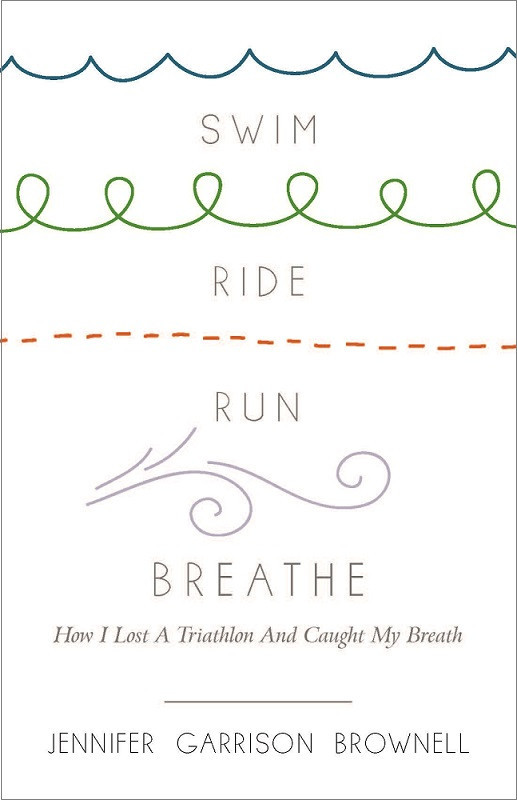 Swim, Ride, Run, Breathe: How I Lost a Triathlon and Caught My Breath Jennifer Garrison Brownell (Pilgrim Press) $18.00 What a fascinating, well written memoir, the nicely and honestly told story of a very un-athletic woman training for the tri. I was hooked on her clever writing from the very first page (I kid you not) and was drawn in to story of her bookish, mainline-Protestant expression of faith (she is a UCC pastor) and her nearly perplexing drive to do this big thing. In part, she wanted to learn to be more comfortable in her own body. A large part of the story — which is not the expected story of feeble person winning against all odds, hip, hip, hooray — is her honest telling of her good marriage with her husband, Jason, who is in a wheelchair. He has a form of muscular dystrophy so his own body issues loom large in her consciousness as well. As a mid-life, liberal Protestant pastor in Portlandia, as the wife of a sharp guy who is in a wheelchair, as a “dedicated non-athlete” she discovers quite a bit along the way.
Swim, Ride, Run, Breathe: How I Lost a Triathlon and Caught My Breath Jennifer Garrison Brownell (Pilgrim Press) $18.00 What a fascinating, well written memoir, the nicely and honestly told story of a very un-athletic woman training for the tri. I was hooked on her clever writing from the very first page (I kid you not) and was drawn in to story of her bookish, mainline-Protestant expression of faith (she is a UCC pastor) and her nearly perplexing drive to do this big thing. In part, she wanted to learn to be more comfortable in her own body. A large part of the story — which is not the expected story of feeble person winning against all odds, hip, hip, hooray — is her honest telling of her good marriage with her husband, Jason, who is in a wheelchair. He has a form of muscular dystrophy so his own body issues loom large in her consciousness as well. As a mid-life, liberal Protestant pastor in Portlandia, as the wife of a sharp guy who is in a wheelchair, as a “dedicated non-athlete” she discovers quite a bit along the way.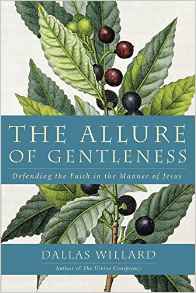 The Allure of Gentleness: Defending the Faith in the Manner of Jesus Dallas Willard (HarperOne) $26.99 I hope you know the late, great, Dallas Willard, and his rich, thoughtful books that are deep and penetrating, without being obscure or scholarly. He was a philosophy professor and a spiritual director schooled in the deepest classics. He was brilliant and yet humble, a writer about the ways the Kingdom of Christ break into our lives, often from the inside out. He was an excellent thinker with a practical bent, the best sort of guide and coach. His wrote a good handful of books about spiritual transformation.
The Allure of Gentleness: Defending the Faith in the Manner of Jesus Dallas Willard (HarperOne) $26.99 I hope you know the late, great, Dallas Willard, and his rich, thoughtful books that are deep and penetrating, without being obscure or scholarly. He was a philosophy professor and a spiritual director schooled in the deepest classics. He was brilliant and yet humble, a writer about the ways the Kingdom of Christ break into our lives, often from the inside out. He was an excellent thinker with a practical bent, the best sort of guide and coach. His wrote a good handful of books about spiritual transformation.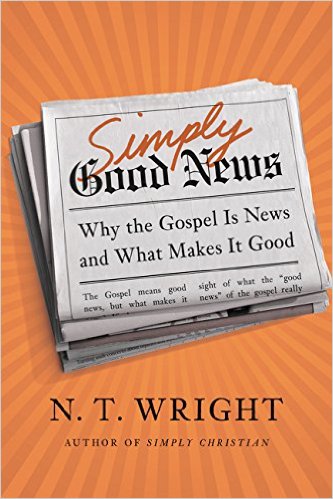 Simply Good News: Why the Gospel is News and What Makes it Good N.T. Wright (HarperOne) $24.99 You most likely know that we are huge fans of Tom Wright, and admire his intellectual rigor, his broad involvement with various schools of thought and his cordial friendships with scholars from all over the map, so to speak. We believe he is, when properly understood, a wonderful example of being forward-thinking and relevant, certainly, but faithful and solid to historic Biblical insights and theological verities. Why not start off the hear either dipping in to Wright in an introductory way, or recalling many of his oft-spoken views.
Simply Good News: Why the Gospel is News and What Makes it Good N.T. Wright (HarperOne) $24.99 You most likely know that we are huge fans of Tom Wright, and admire his intellectual rigor, his broad involvement with various schools of thought and his cordial friendships with scholars from all over the map, so to speak. We believe he is, when properly understood, a wonderful example of being forward-thinking and relevant, certainly, but faithful and solid to historic Biblical insights and theological verities. Why not start off the hear either dipping in to Wright in an introductory way, or recalling many of his oft-spoken views.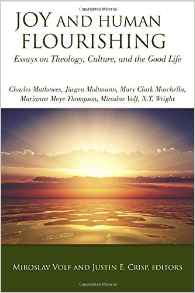 Joy and Human Flourishing: Essays on Theology, Culture and the Good Life edited by Miroslav Volf and Justin E. Crisp (Fortress) $39.00 What a book, a serious-minded, thoughtfully-prepared, applicable study of joy and its repercussions in the church and the world! Joy is a primary call, these authors tell us, and a central reality of life lived in God. Surely we need more serious Biblical and theological study of this pleasant, but perplexing, topic. Such a study dare not be glib or disinterested in the complex hardships of our fallen world. It would have to explore joy in our own lives, show how our own spiritual formation practices might help, and how that might allow us to live better in the world, in the culture, such as it is, with more care and compassion. Joy and Human Flourishing is just such a book. It includes pieces from Jurgen Moltmann, N.T. Wright, Marianne Meye Thompson, Mary Clark Mochella, Charles Mathewes, and, of course, Volf. These are agents of shalom and this offers what John Ortberg calls “a grand project on a vast and vibrant scale.”
Joy and Human Flourishing: Essays on Theology, Culture and the Good Life edited by Miroslav Volf and Justin E. Crisp (Fortress) $39.00 What a book, a serious-minded, thoughtfully-prepared, applicable study of joy and its repercussions in the church and the world! Joy is a primary call, these authors tell us, and a central reality of life lived in God. Surely we need more serious Biblical and theological study of this pleasant, but perplexing, topic. Such a study dare not be glib or disinterested in the complex hardships of our fallen world. It would have to explore joy in our own lives, show how our own spiritual formation practices might help, and how that might allow us to live better in the world, in the culture, such as it is, with more care and compassion. Joy and Human Flourishing is just such a book. It includes pieces from Jurgen Moltmann, N.T. Wright, Marianne Meye Thompson, Mary Clark Mochella, Charles Mathewes, and, of course, Volf. These are agents of shalom and this offers what John Ortberg calls “a grand project on a vast and vibrant scale.”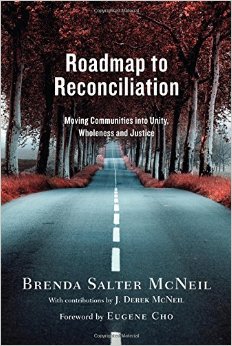 Roadmap to Reconciliation: Moving Communities into Unity, Wholeness, and Justice Brenda Salter McNeil (IVP) $16.00 This new hardback is a great, great little book and gives a fabulous overview of the Biblical basis for racial reconciliation and pushes us towards true and lasting answers. We can see the inequality, we understand the problems, but are we ready to rise up in faithful action? What steps should we take to offer gospel-centered, wholistic, spiritual answers for racial justice?
Roadmap to Reconciliation: Moving Communities into Unity, Wholeness, and Justice Brenda Salter McNeil (IVP) $16.00 This new hardback is a great, great little book and gives a fabulous overview of the Biblical basis for racial reconciliation and pushes us towards true and lasting answers. We can see the inequality, we understand the problems, but are we ready to rise up in faithful action? What steps should we take to offer gospel-centered, wholistic, spiritual answers for racial justice?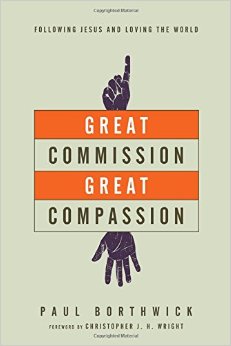 Great Commission Great Compassion: Following Jesus and Loving the World Paul Borthwick (IVP) $16.00 I love the slogan that is on the back cover of this new book: “We follow Jesus into all the world, and we follow his example in all we do.” Right — we do His work in His way, called to whole-life discipleship, serving others in faithful ways.
Great Commission Great Compassion: Following Jesus and Loving the World Paul Borthwick (IVP) $16.00 I love the slogan that is on the back cover of this new book: “We follow Jesus into all the world, and we follow his example in all we do.” Right — we do His work in His way, called to whole-life discipleship, serving others in faithful ways.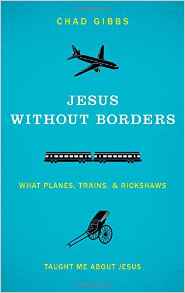 Jesus Without Borders: What Plains, Trains and Rickshaws Taught Me About Jesus Chad Gibbs (Zondervan) $15.99 I could list this as a memoir as it is nearly a straight travelogue, a delightful journey nicely told, exuberant and funny at times, about a guy traveling around the world. But I list it here: Gibbs doesn’t just want to offer a literary memoir of his journey, but he wants us to understand a clearer picture of how other Christians all over the world worship, and what we can learn from their practices and lifestyles. It isn’t exactly about world missions and it isn’t exactly about global justice and it isn’t directly about multi-culturalism. He has more than a dozen chapters, writing about what he learned in places as diverse as Russia and Brazil, Japan and India, The Netherlands and Uganda and, well, it really can help us all be more globally aware as world citizens, and more, as a multi-ethnic and multi-national Body of Christ.
Jesus Without Borders: What Plains, Trains and Rickshaws Taught Me About Jesus Chad Gibbs (Zondervan) $15.99 I could list this as a memoir as it is nearly a straight travelogue, a delightful journey nicely told, exuberant and funny at times, about a guy traveling around the world. But I list it here: Gibbs doesn’t just want to offer a literary memoir of his journey, but he wants us to understand a clearer picture of how other Christians all over the world worship, and what we can learn from their practices and lifestyles. It isn’t exactly about world missions and it isn’t exactly about global justice and it isn’t directly about multi-culturalism. He has more than a dozen chapters, writing about what he learned in places as diverse as Russia and Brazil, Japan and India, The Netherlands and Uganda and, well, it really can help us all be more globally aware as world citizens, and more, as a multi-ethnic and multi-national Body of Christ.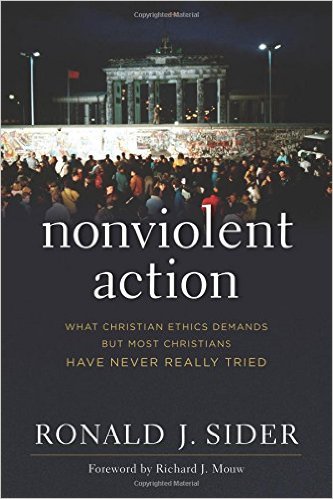 Nonviolent Action: What Christian Ethics Demands But Most Christians Have Never Really Tried Ronald J. Sider (Brazos Press) $19.99 I wrote about this when it first came out last winter, and now, at years end, wish to tell you again about how very inspiring this is, and how very sensible it seems to me — if risky, courageous, demanding. I would be so very happy if some of our faithful customers took it up in their reading plan this new year. It would make a great study or book club title to talk about.
Nonviolent Action: What Christian Ethics Demands But Most Christians Have Never Really Tried Ronald J. Sider (Brazos Press) $19.99 I wrote about this when it first came out last winter, and now, at years end, wish to tell you again about how very inspiring this is, and how very sensible it seems to me — if risky, courageous, demanding. I would be so very happy if some of our faithful customers took it up in their reading plan this new year. It would make a great study or book club title to talk about.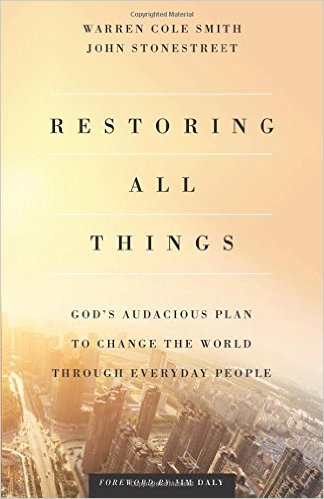 Restoring All Things: God’s Audacious Plan to Change the World Through Everyday People Warren Cole Smith & John Stonestreet (Baker Books) $16.99 This is another good book I’ve previously announced, a notable one in 2015. I loved much of this, and it has some great strengths: it combines a Biblically big vision of what God is doing in our world — bringing Christ’s Kingdom to bear in all of life, followers of Jesus becoming salt and light in the world but not of it. Yes, it sees that God is bringing grace and hope to all, in various ways, in all manner of spheres and places. So I likes it’s wholistic vision, and it is a good way into this evangelical truth that God is at work in the world and we are invited to join in.
Restoring All Things: God’s Audacious Plan to Change the World Through Everyday People Warren Cole Smith & John Stonestreet (Baker Books) $16.99 This is another good book I’ve previously announced, a notable one in 2015. I loved much of this, and it has some great strengths: it combines a Biblically big vision of what God is doing in our world — bringing Christ’s Kingdom to bear in all of life, followers of Jesus becoming salt and light in the world but not of it. Yes, it sees that God is bringing grace and hope to all, in various ways, in all manner of spheres and places. So I likes it’s wholistic vision, and it is a good way into this evangelical truth that God is at work in the world and we are invited to join in.